TRY SOMETHING NEW!
Ready for adventures in music and sport, to join the UOTC or gain new qualifications?
MASTER CADET
What's it like doing the course at CTC Frimley Park?
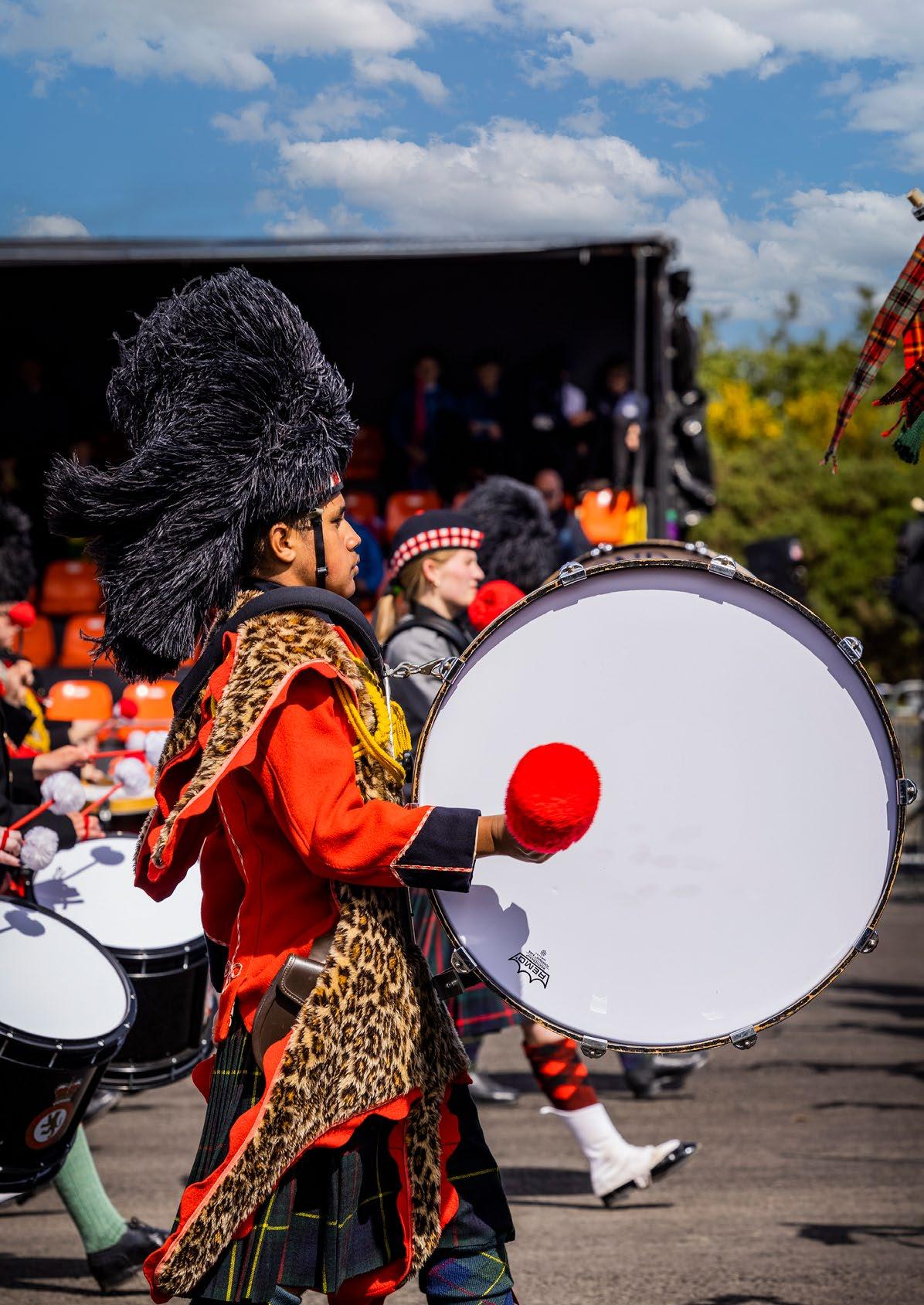
ANNUAL CAMP
How to prepare for this summer’s highlight
EXPED SEASON
First aid and navigation know-how, and how to be exped ready
Summer 2 0 2 4
FUN, FRIENDSHIP, ACTION & ADVENTURE armycadets.com
WIN A FUEL THE ADVENTURE JERRYCAN BATTERY CHARGER BANK Turn to p44
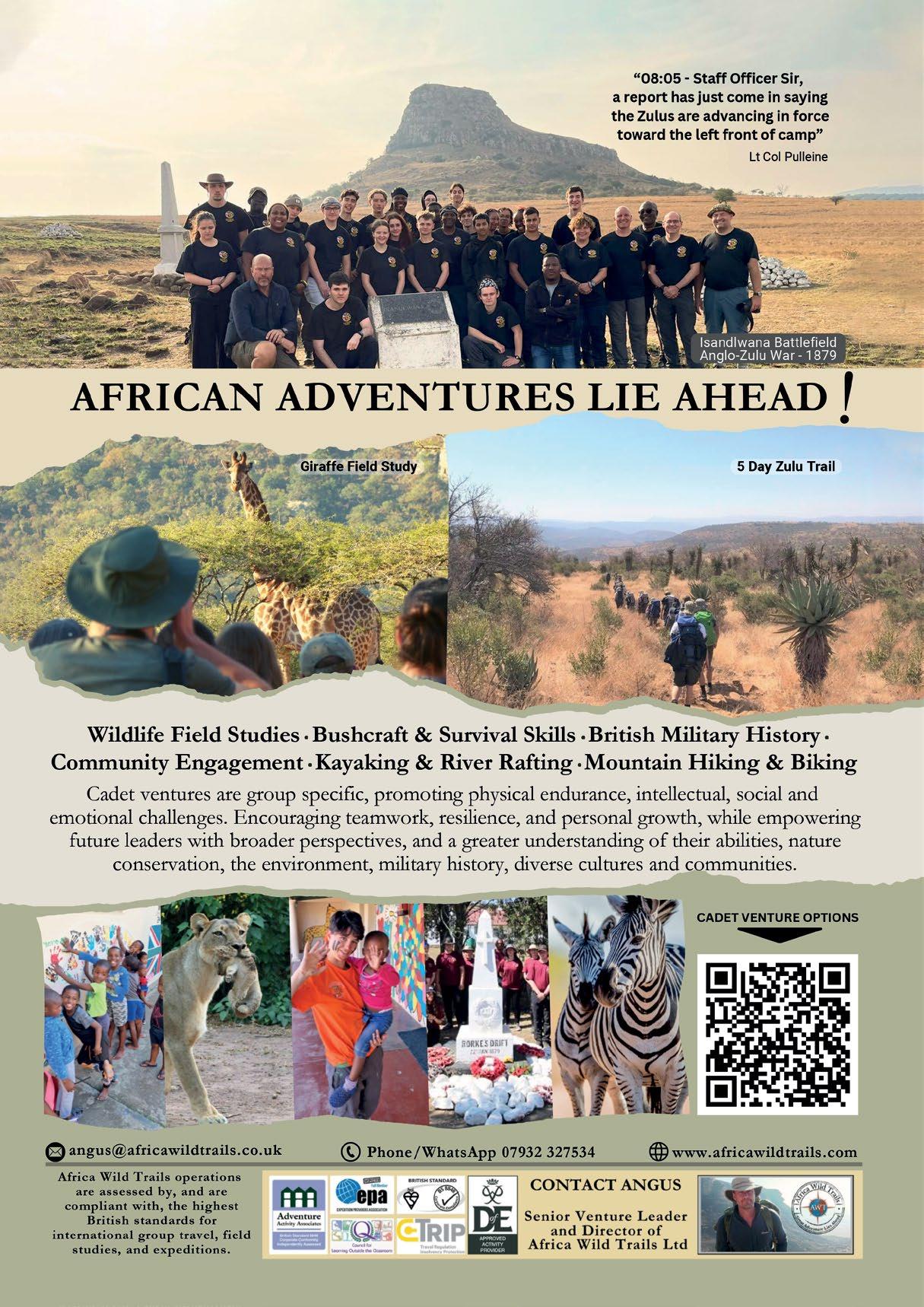
WELCOME
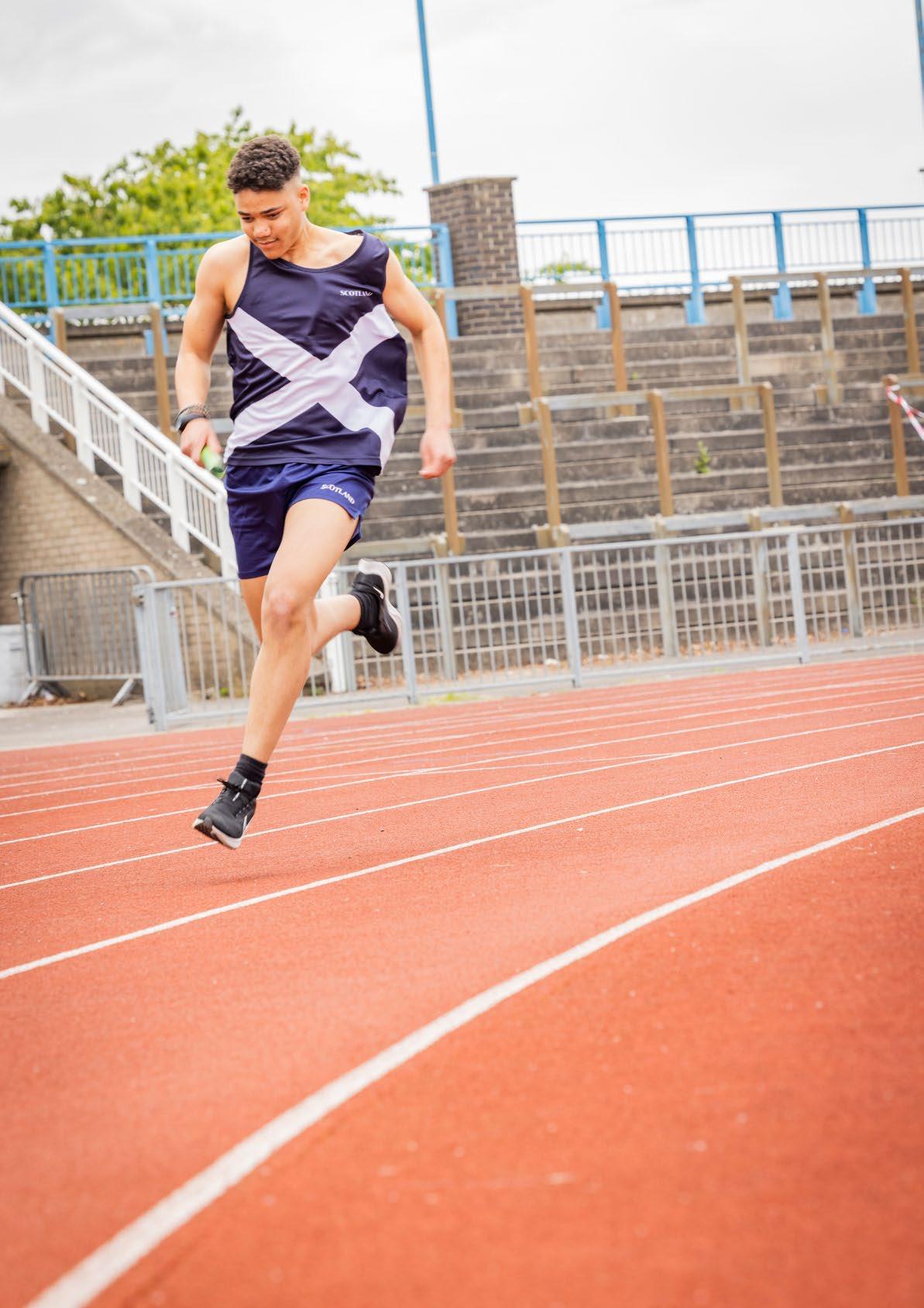
‘The Army Cadets offers incredible opportunities in areas such as sport, DofE and music’
Welcome to the summer edition of Army Cadets magazine. In this issue we’re celebrating exped season with features that’ll have you ready for whatever your detachment or contingent commander has in store for you.
You’ll also find out about first aid on expedition, get tips to brush up your navigation skills, and learn how to get your kit ready for the great outdoors. We all know how much more enjoyable an expedition is when your boots are comfy, your sleeping bag is warm enough and your rucksack is properly packed.
If you’ve ever been curious about what it’s like to complete the Master Cadet course at CTC Frimley Park, turn to page 12 to meet new graduates of the training and find out how they fared.
Summer is the perfect time to try something new and push yourself out of your comfort zone. The Army Cadets offers incredible opportunities in areas such as sport, DofE and music, so read on to discover what’s available. There are also some valuable courses which cadets can take advantage of – we highlight a few on page 41.
Those of you with your sights set on university will find our feature on the University Officers' Training Corps interesting. If you’re off to uni this autumn, it's worth considering joining.
And if you’re going to annual camp this summer, do read our feature on page 18 on how to prepare, especially if you’re a new cadet I’m planning on visiting lots of camps and look forward to meeting as many of you as possible. Come and say hello if you see me!
I wish you all a great summer with lots of exciting adventures and fun challenges.
Brigadier
Gary McDade Deputy Commander Cadets

Copyright The contents of this magazine are fully protected by copyright and may not be reproduced without permission. Disclaimer While every effort has been made to ensure that adverts, details and articles appear correctly, Army Cadets magazine cannot accept responsibility for any loss or damage caused directly or indirectly by the contents of this publication. The views expressed in this publication are not necessarily those of its publisher or editor. Army Cadets magazine is produced by saltmedia.co.uk
Cover image and this image: Kate Knight
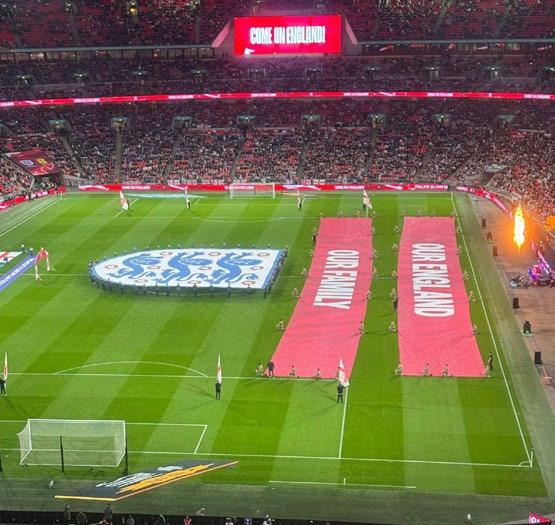
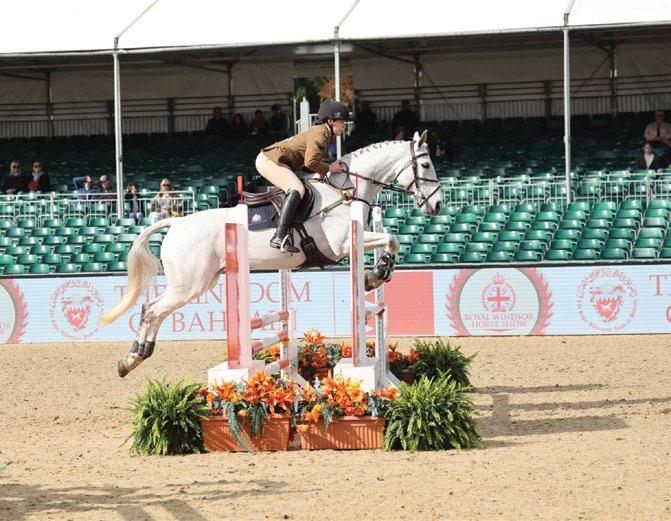
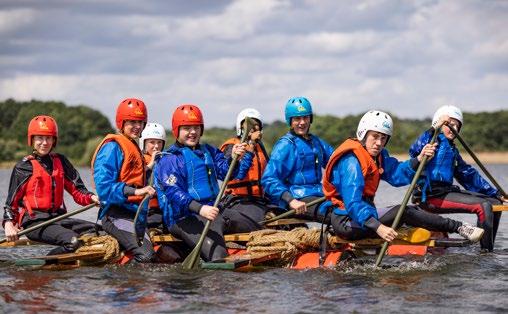
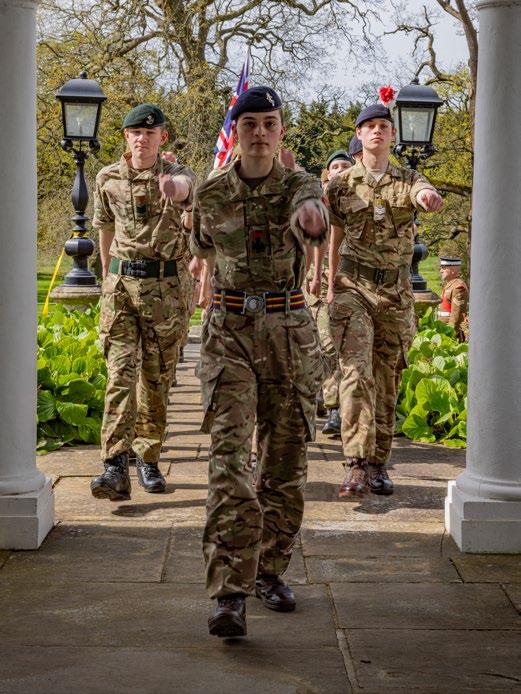
What's it like doing the maSTER CADET COURSE? Cadet life 12 Pinnacle of achievement What's it really like to take part in the Master Cadet course at CTC Frimley Park? 18 How to prepare for annual camp The need-to-knows before you go. CONTENTS 12 The Briefing 6 News from the Army Cadets and ACCT UK 18
Expeditions
22
Be exped ready!
How to ensure your boots, rucksack and sleeping kit are expedition worthy.
30 Going for Gold
Cdt UO Harnaam Singh reveals why the DofE Gold Award was a life-changing adventure for him.
38
Navigation know-how
Tips for navigation success during exped season.
44
Take the test: First aid on exped
Learn crucial information and test yourself for the chance of winning a Fuel the Adventure jerrycan battery charger.
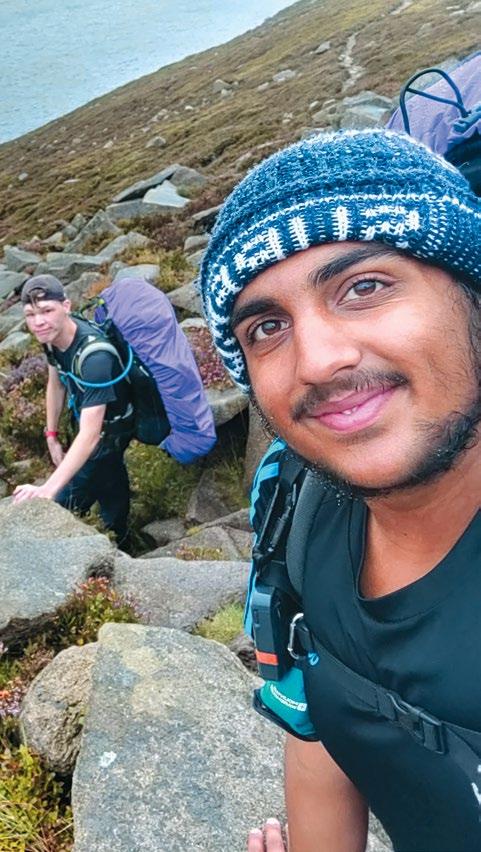
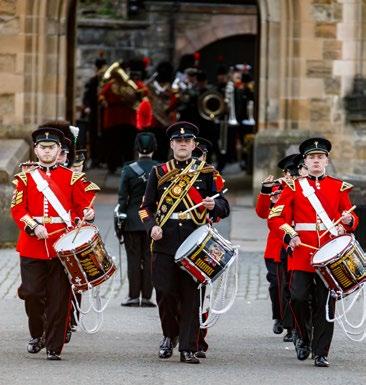
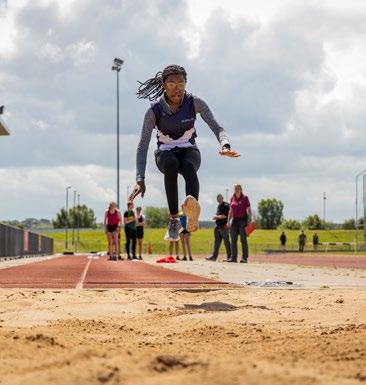
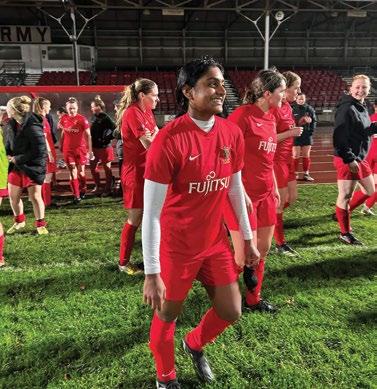
Take
54 Good sports Ever considered competing in Army Cadets Sport? 60 University of life Meet two officer cadets in the University Officers' Training Corps. 48 Jump on the bandwagon
instrument
serve your detachment and community.
up an
and
30 Try something new
THE BRIEFING
News from the Army Cadets and beyond
Cadets ace extreme challenge
Cadets from Glasgow competed in the gruelling Commando Speed March in aid of military charities on 2 March. Seven cadets from The Glasgow Academy and five from Kelvinside Academy took part in the extreme seven-mile challenge.
All competing cadets were required to run the entire course wearing the boots in which they started and carrying 16lbs (7.25kg) of weight (roughly half that of an adult participant) in a bergen, daysack or webbing.
‘All the cadets went above and beyond, showing grit and determination to finish the event, which was the culmination of several weeks of hard training,’ said SSI Sam Hartland ‘As a result, they managed to knock nearly 40 minutes off last year’s time!’
The annual speed march followed the original route used to select personnel for Commando training at Achnacarry House, ancestral home of the Cameron clan and headquarters of the primary British Commando Training Centre during the Second World War. The Glasgow Academy cadets raised approximately £800 for Support Our Paras; RMA – The Royal Marines Charity; The Gurkha Welfare Trust; Blesma, The Limbless Veterans; Combat Stress; and The Curtis Palmer Program.
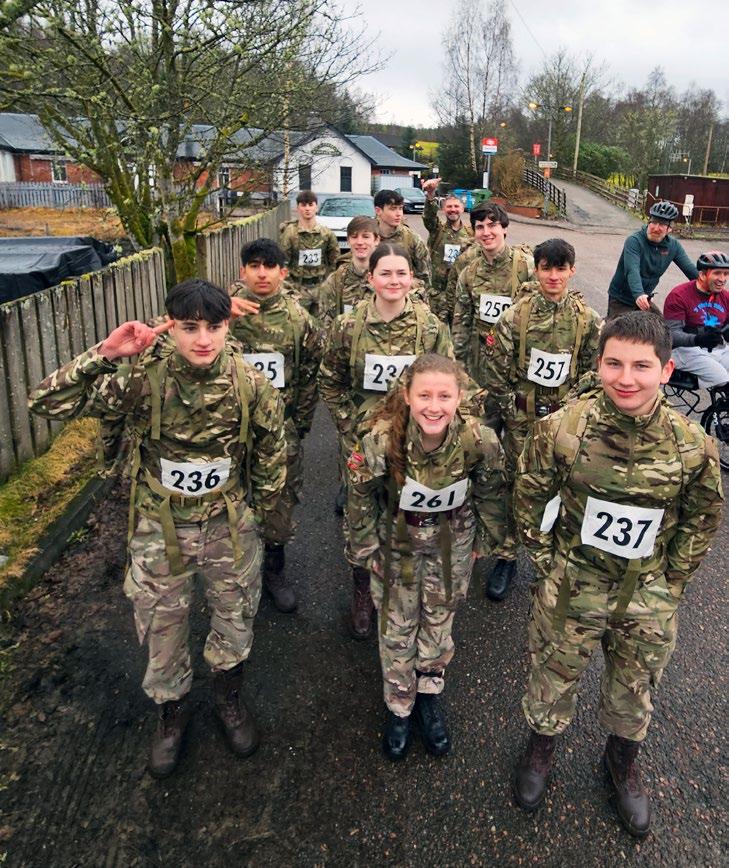
Warm up act for the Lionesses
Cadets and staff from Buckinghamshire ACF had the honour of taking part in a pre-match spectacle before the Women’s Euro 2025 qualifier at Wembley Stadium on 5 April.
Five CFAVs and 33 cadets headed out onto the pitch with banners ahead of the England Lionesses’ game against Sweden.
The group visited Watford FC’s training ground to practise with the flags, then took a coach across to Wembley for a pitch sidewalk and selfie opportunities before heading onto the turf for the pre-match banner ceremony in front of nearly 64,000 fans.
Their reward? Front-row tickets to watch the Lionesses (who drew 1-1) in action.
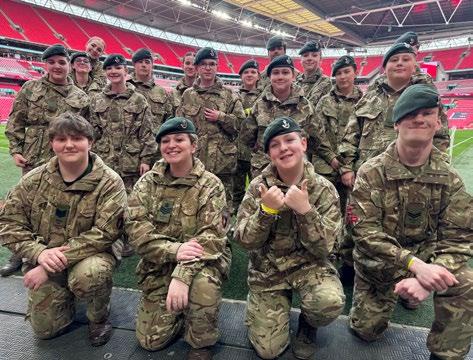
6 Army Cadets
MilSkills success for Surrey ACF
Surrey ACF celebrated after its senior team won the HQ South East Cadet Military Skills Competition at Oxney Farm Training Area in March. The competition saw 12 cadet teams from six counties across the South East tested on skills including section attack, patrol lane, shooting, navigation, clay pigeon, CIS, casevac, archery, military knowledge and command tasks.
The ten-strong senior team’s lead adult instructor SI Holly Dibdin of Guildford Detachment, B (Burma) Company said: ‘Every cadet put in a huge amount of time and effort, pushing themselves to their mental and physical limits. I couldn’t have asked for more from a group of incredible young people with the most positive, go-getting attitude.’
Team captain Cdt CSM John Bloomfield, competing in his second MilSkills event, said: ‘It was the peak of my career. It develops you not only as a cadet but also as a leader.’

Colonel JVT champions cadets' welfare
Sir Jonathan Van-Tam (pictured) was pleased to be promoting positive welfare for cadets and CFAVs at the first Army Cadet Wellbeing conference on 11 May.
As the Honorary Colonel for the Army Cadets Medical Support Volunteers, Colonel JVT (as he is known) joined Deputy Commander Cadets
Brigadier Gary McDade and Colonel Cadets Colonel Ashley Fulford OBE on the line-up.
The event included all four pillars of wellbeing: healthy minds, chaplaincy, diversity and inclusion, and medical support. Army Cadets Head of Wellbeing Colonel Pat O’Meara explained how the four pillars had solidified into an official concept. ‘Wellbeing covers many issues, from how to deal with medical conditions to understanding the potential triggers for neurodivergent cadets, and developing a positive relationship with social media,’ he said.
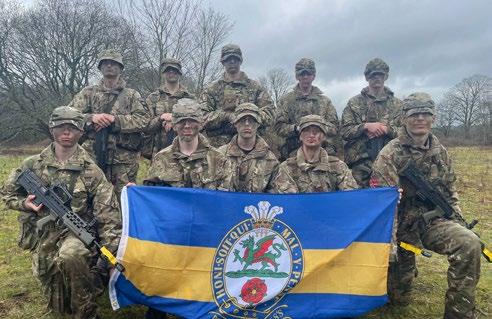
His fellow Surrey ACF team members were Cdt Sgt Robert Sheriff (Vice Captain), Cdt Sgt Phoebe Bishop, Cdt Sgt Dylan Lockyer, Cdt LCpl Henry Bourke, Cdt Cpl Luke Geary, Cdt Cpl Hayden Manly, Cdt Cpl Bradley Quayle, Cdt LCpl Max Roux and Cdt LCpl Dominic Blanchard.
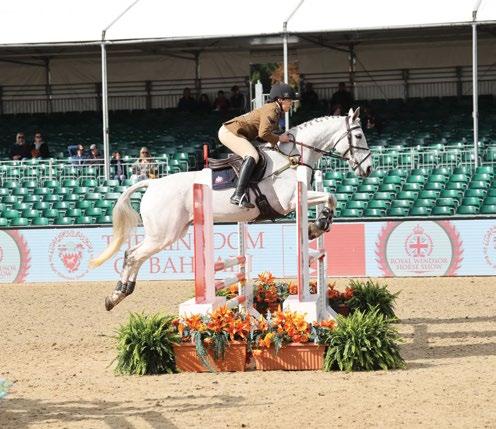
Cadets jump for joy
Cheltenham College CCF competed for the first time in the Service Team Showjumping Competition at the Royal Windsor Horse Show (RWHS) on 1-5 May.
Cdt LCpl Tamara Townsend (pictured on Sapphire), Cdt Fenella Redvers and Cdt LCpl India Trounson joined CCF units from Pangbourne College, Hurstpierpoint College and Royal Hospital School, plus teams of military and service personnel at the event.
All three cadets completed clear first rounds to position 4th in the rankings. The other CCF teams also ranked well, at 6th, 9th and 10th. Cdt LCpl India Trounson rode a second round, earning Cheltenham College CCF 6th place in the final results. The teams also paraded and saluted on horseback in front of the Royal box and spectators.
THE BRIEFING
Image: 2024 1st Class Images
7 Summer 2024
Surrey ACF senior team
THE BRIEFING
News from the Army Cadets and beyond
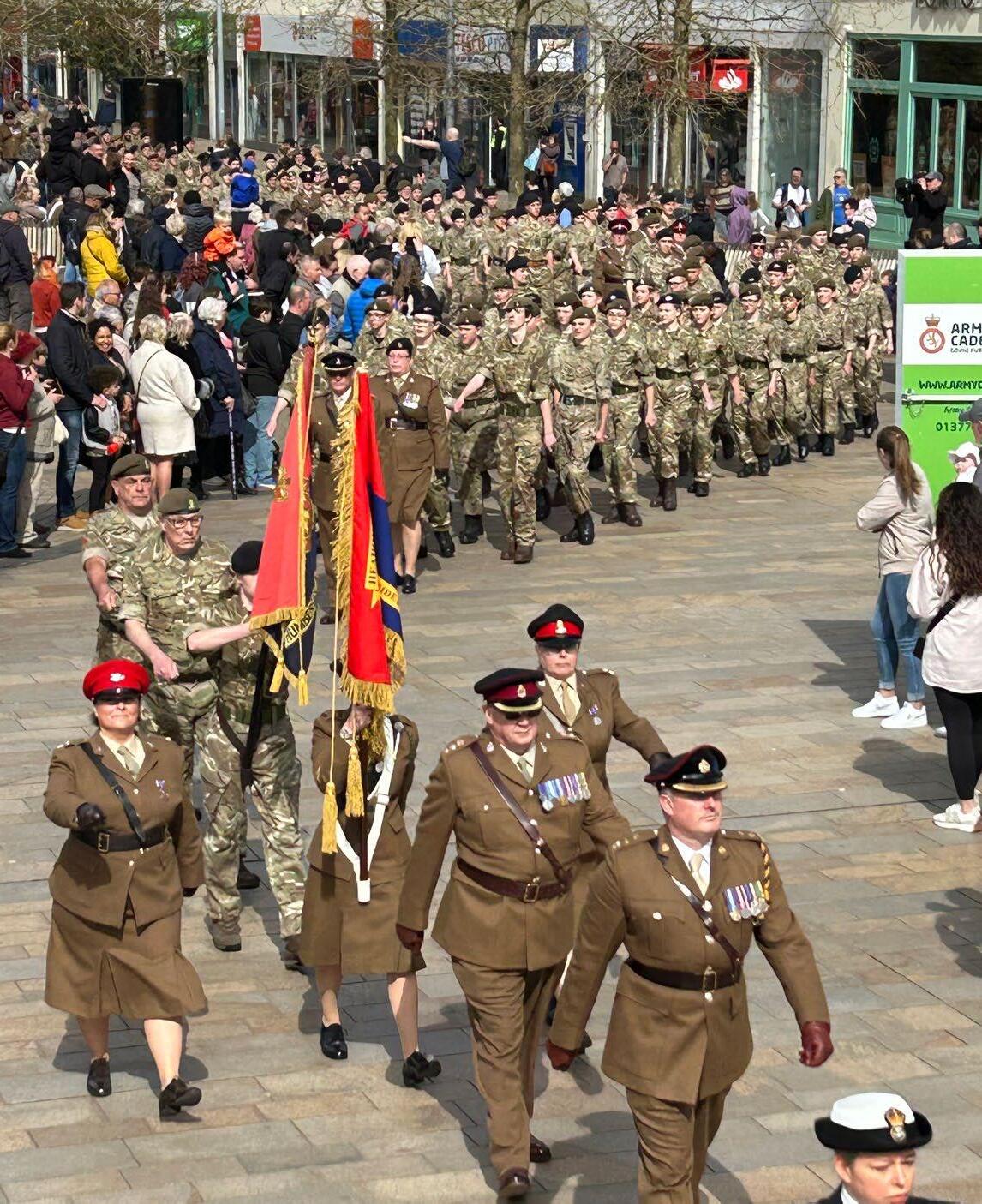
Freedom of the
City of Hull
‘They epitomised the spirit of camaraderie and excellence’
Humberside and South Yorkshire (HSY) ACF take part in the Freedom of the City parade
8 Army Cadets
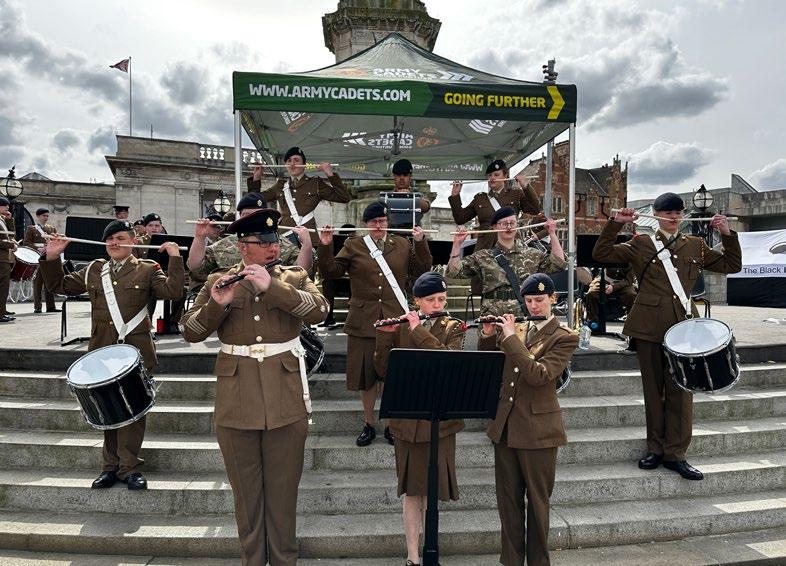
Congratulations to Humberside and South Yorkshire (HSY) ACF, which has been awarded the Honorary Freedom of the City of Kingston upon Hull. The cadets were granted the ancient privilege in recognition of their valuable service to the city, and marched in the inaugural Freedom of the City parade on Sunday 14 April, to the delight of spectators.
Col Fred Owen, Commandant of HSY ACF, said the unit was ‘deeply humbled’ to receive the award, adding: ‘The day could not have gone better. HSY had around 200 cadets in attendance, reflecting our strong presence in the community. With heads held high and uniforms immaculate, they epitomised the spirit of camaraderie and excellence that defines the organisation.’
HSY AFC has around 1,200 Army cadets aged 12-18 and over 250 adult volunteers, in an area stretching from East and South Yorkshire to North and North East Lincolnshire.
Councillor Kalvin Neal, Lord Mayor and Admiral of the Humber, added: ‘With a military background of my own, I am so pleased that we’re able to grant the Honorary Freedom to these cadets. The Army Cadets allows young people to develop so many skills, such as teamwork and leadership, while boosting their self-confidence.’
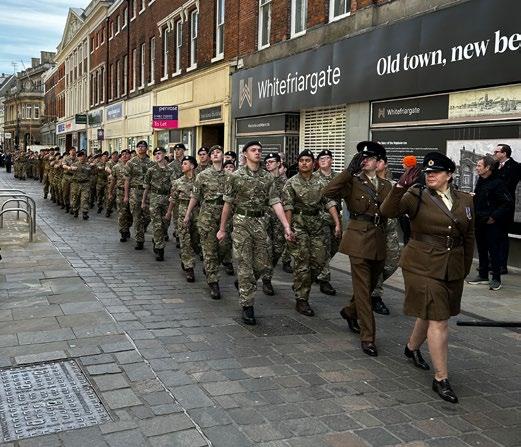
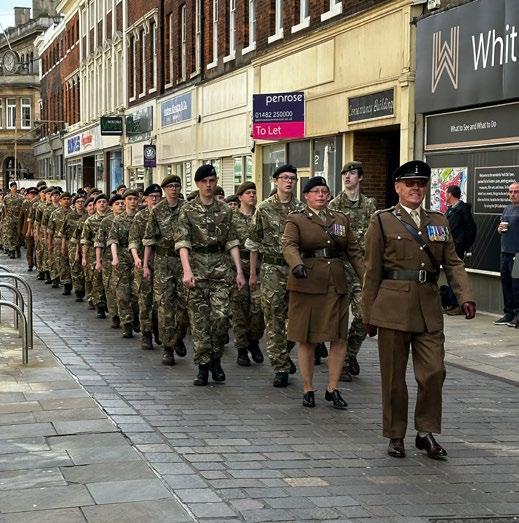
THE BRIEFING
9 Summer 2024
THE BRIEFING
News from ACCT UK
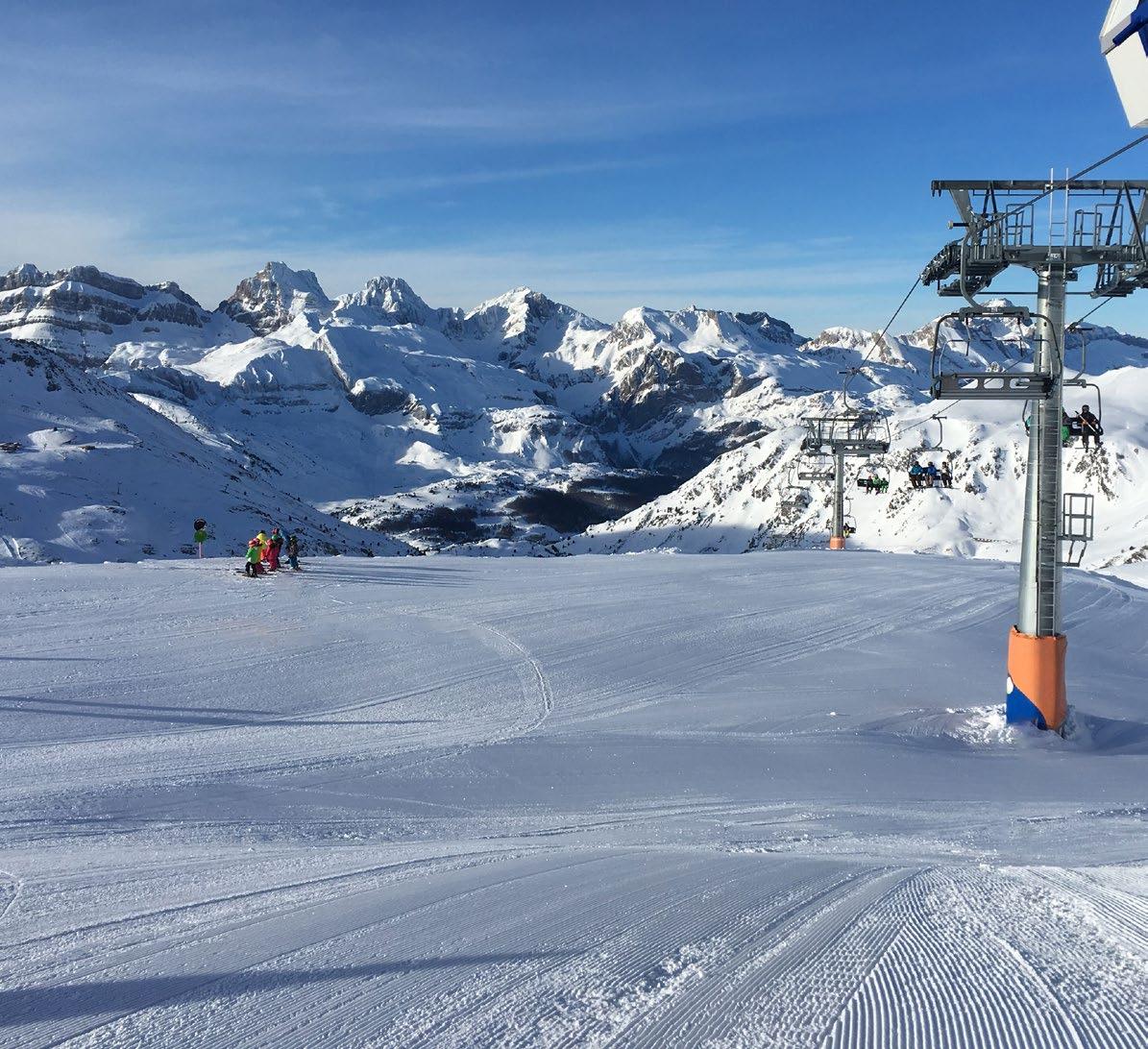

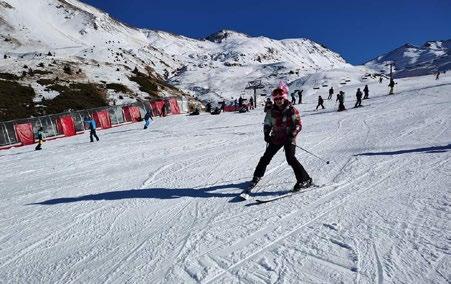
Mastery and fun on the slopes
Cadets from Hereford & Worcester ACF (HWACF) were given an incredible opportunity to take part in a ski trip to the Pyrenees in February.
Ex VENTURE SNOW CUB was attended by 43 cadets under guided ski instruction from civilian company Inspireski. Overcoming fear of falling and fear of heights, they triumphantly navigated the mountains, showcasing remarkable personal growth and resilience. Their experience was all the more enriching for the cultural exchanges with Spanish and English peers, and the experience of trying the local cuisine.
For many participants, this trip was their first holiday abroad. It was made affordable by an ACCT UK grant and fundraising efforts by the HWACF Charitable Trust, with lunches, musical events and Christmas carol performances raising over £30,000.
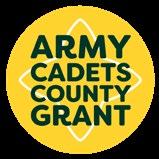
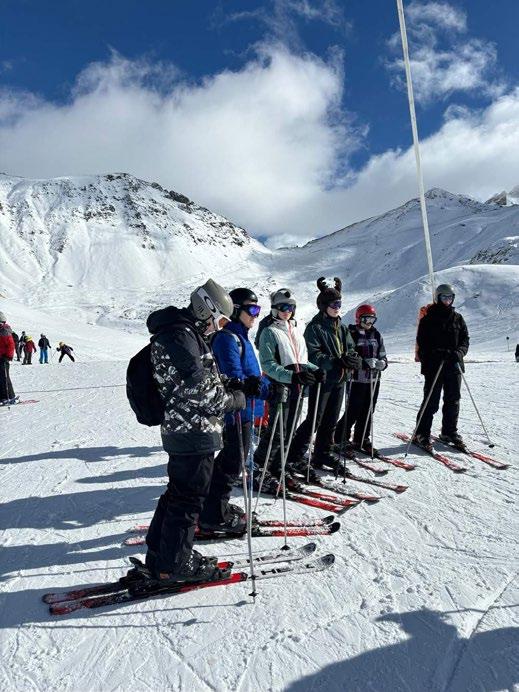
10 Army Cadets
Himalayan fundraising feat
An epic 27-day challenge to conquer Mount Ama Dablam (6,856m) in the Himalayan region of Nepal was undertaken between 25 March and 27 April by SI Mike Penn of 7 Troop Hants & Isle of Wight ACF.
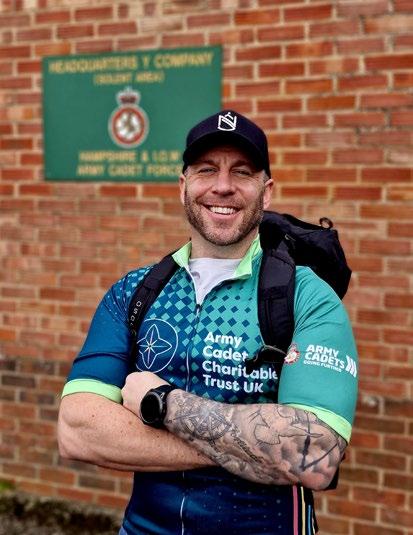
Mike raised £2,016 for ACCT UK with the aim of helping cadets take part in future activities and adventures.
After arriving in Kathmandu, his epic adventure began with a flight to Tenzing-Hillary Airport in Lukla, followed by a trek up to the market town of Namche Bazaar (3,400m).
After a few days acclimatising to the altitude, he undertook an eight-day hike to the basecamp for training and preparation with ropes, kit and equipment. The trail entailed two camps, steep and difficult slopes, the crossing of a snowy ridge with the aid of fixed lines, and a final summit push to the peak of Mount Ama Dablam.
‘Having been fortunate to travel to many countries around the world, hiking and exploring, I’m now pushing myself in mountaineering,’ said Mike. ‘I hope to share my passion to inspire cadets to get out of their comfort zones, challenge themselves and enjoy the great outdoors.’
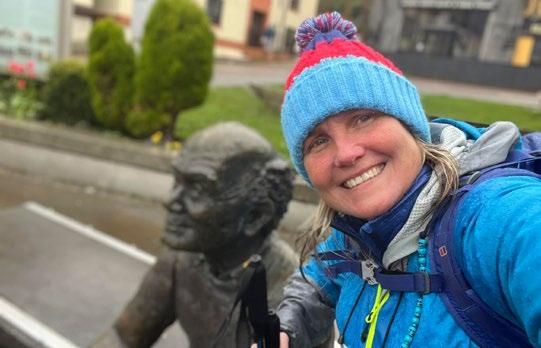
Gina smashes second attempt at Scottish Highland challenge
Gina Allsop, Sports Officer and Adventure Training Officer for Sussex ACF, wasn’t about to let a setback prevent her from completing a challenge she embarked upon last year but had to abandon due to injury.
From 8-12 April, she bravely undertook her second attempt at an epic Scottish Highland challenge she had set for herself, having been thwarted 50 miles into her first when she fell and broke her arm in three places.
‘It was my hardest challenge since leaving the UK armed forces,’ she said.
The former Army lieutenant set off from Glasgow and solo hiked 118 miles to Fort William, using the West Highland Way.
Having taken the obligatory selfie on the Sore Feet bench in the town, she picked up her kayak from the Fort William Detachment (1st Battalion The Highlanders ACF) and paddled for 79 miles up the Great Glen to Inverness, where she exchanged the kayak for a mountain bike and cycled the 66 miles back to Fort William.
She completed the expedition in two weeks, wild camping and carrying all her food.
Gina raised £1,465 for three armed forces support charities – SSAFA, ACCT UK and Woody’s Lodge – while highlighting mental health issues.
THE BRIEFING
11 Summer 2024
Gina’s selfie on the Sore Feet bench in Fort William
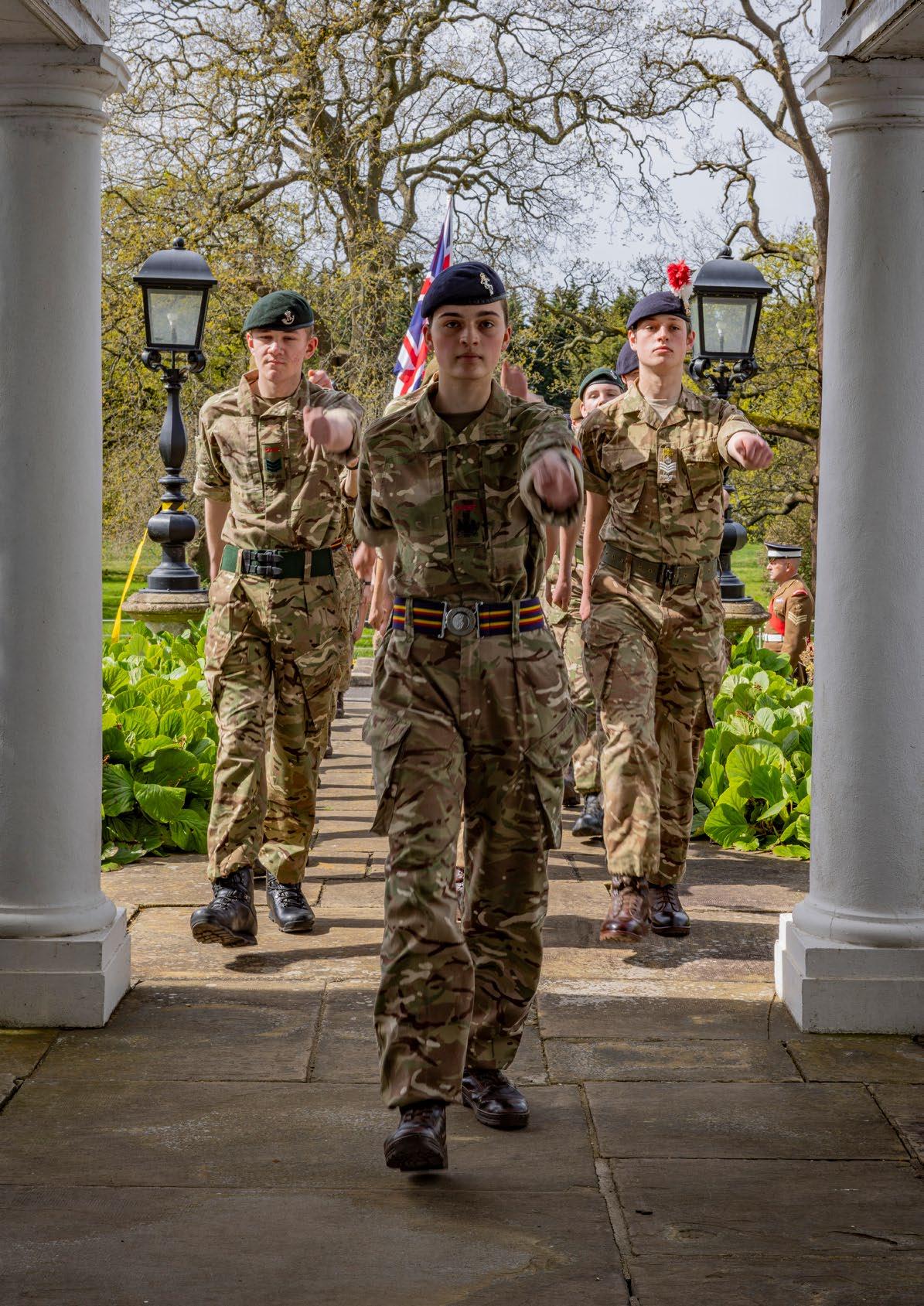
Pinnacle of
ACHIEVEMENT
What's it really like to take part in the Master Cadet course at CTC Frimley Park? We asked some recent participants.
Master Cadet course final parade
All images Mitchell Allen 12
Cdt SSgt
Nevin Nice
Westcliff High School for Boys CCF, Essex
How challenging did you find the Master Cadet course?
Without doubt it was one of the toughest things I’ve ever done, mentally and physically. I pushed myself to limits I wasn’t aware I was capable of and, although it was incredibly challenging, I’ve learnt so much about myself. The camaraderie and team spirit of my section was absolutely key in getting all of us across the finish line. That was how we beat all the other sections in Ex SAFARI PARK.
Do you feel proud of successfully completing the course?
It was the pinnacle of my Cadets journey so far. While I aim to improve myself constantly, completing it is special as it’s the highest level of training available in the Army Cadets. I'm proud of pushing myself out of my comfort zone and spending a week with 39 strangers (many of whom are now great friends!) in challenging conditions to prove myself as a Master Cadet.
What made you join the Army Cadets?
From about Year 4, I’d see the boys marching up and down in their uniforms and think I want to be part of that. I applied as soon as I was able to. It’s the greatest decision I’ve made since joining my school – perhaps even better than choosing not to do A-level maths!
What skills have you learnt?
Independence, discipline, mental resilience and leadership skills – which I think has been most exemplified through my performance on the Master Cadet course. I’ve learnt that I am capable of a lot more than I thought I was. I’m certainly intending to apply this to all aspects of my life in the future.
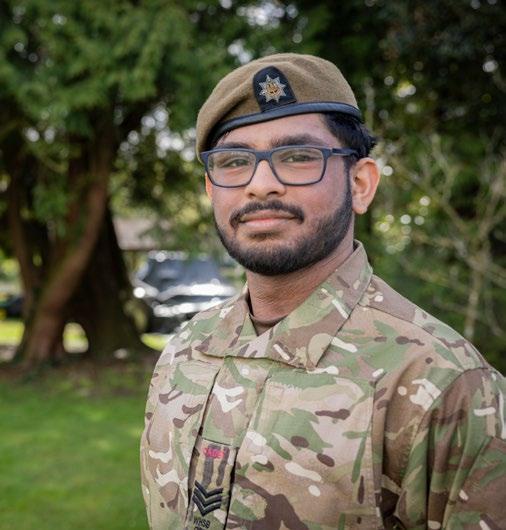
How will you utilise those skills?
In terms of my future path, I’m looking to join the priesthood. It’s a tough job and requires a lot of mental resilience. I think that the discipline and strength I’ve discovered are going to help me realise my potential.
Have you changed since joining the Army Cadets?
Absolutely. I am a lot better at leadership thanks to the experiences I’ve had. They’ve helped me understand what makes a good leader and what doesn’t. They will stand me in good stead for the leadership opportunities I now have, both within my school and outside.
CADET LIFE 13 Summer 2024
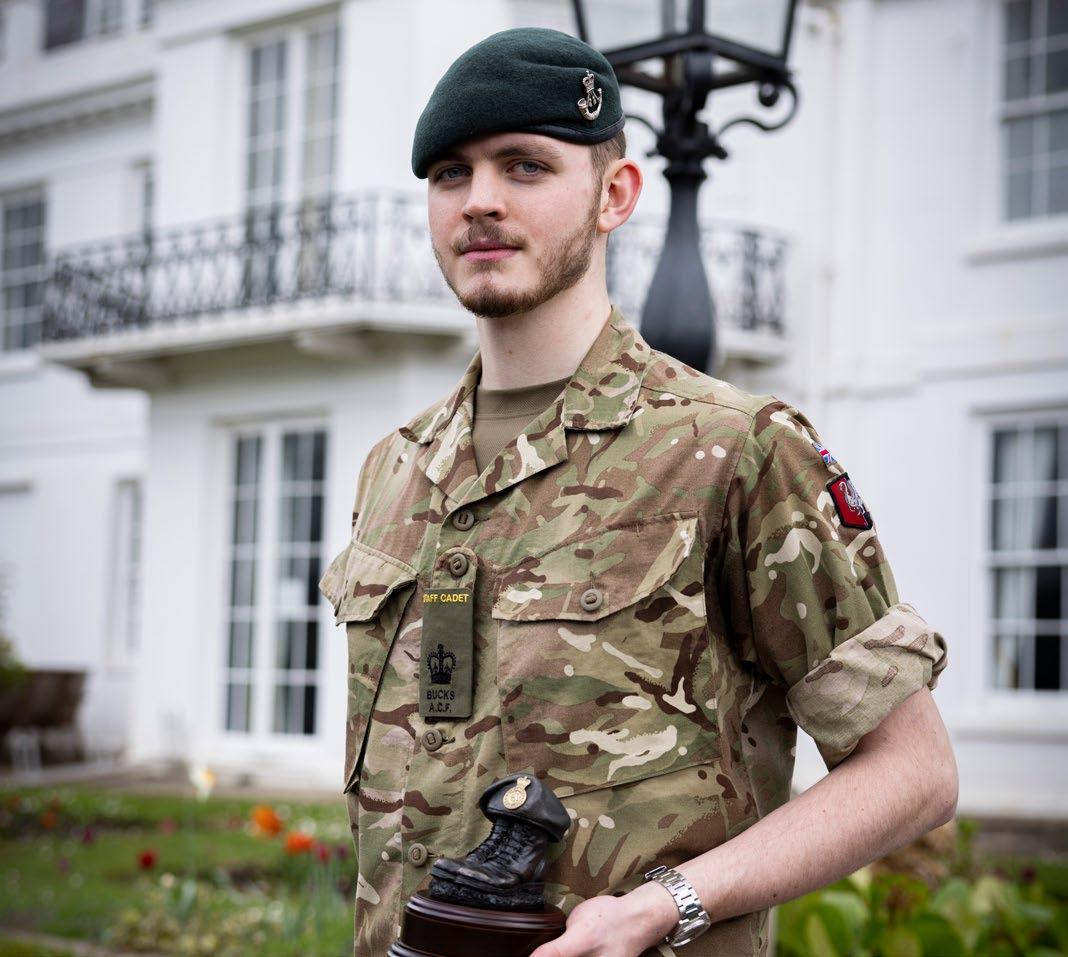
STAFF CDT RSM
Finlay Harris
Buckinghamshire ACF
How did you train for the Master
Cadet course?
I didn’t do any specific training. However, my cadet career to date was good preparation. A combination of Senior Cadet Instructor Cadre (SCIC), numerous field training exercises and my leadership experience equipped me for the course.
What was the best part of the Master Cadet course?
Seeing my section progress, improve and develop throughout the course – culminating in a platoon attack where I was the 2IC. I saw them mesh as a team and work together brilliantly.
What was the most challenging aspect?
Performing my personal skills and drills well, but also having the integrity and self-discipline not to let them slip below standard when I was physically and mentally exhausted on exercise.

14 Army Cadets
Master Cadet badge
Why did you join the Army Cadets?
One of my school friends had joined six months earlier and enticed me to go along. On top of that, my dad joined as an adult instructor at the same time. He’d been in the RAF and Army Reserve, so I’d already been exposed to military activities.
After I’d been for a couple of nights and found out what it was all about, I was hooked.
What have you learnt?
Lots! Discipline, integrity, all the values and standards, along with practical skills like fieldcraft and drill. Also transferable skills such as navigation – and I’ve enjoyed the opportunity to be outdoors.
How will you make the
most
of what you’ve learnt?
I’ll probably join the Army, but if I don’t I’ll be back as an adult instructor to pass skills on to the next generation of cadets.
What was your perception of the Army Cadets before you joined?
I thought it was a place to hang out with your mates and, while that is the case, I now think it’s more than that. It teaches you a lot and turns you into a completely different person.
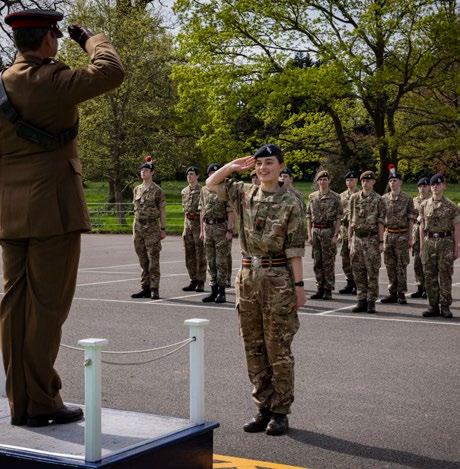
A Parent's perspective
Johanna Warren, mother of SSgt Harrison Warren of Gwent & Powys ACF
What led your son Harrison to join the Army Cadets?
A friend of his was in the Army Cadets so Harrison joined when he was old enough. I never thought he’d take to it – he’s absolutely astounded me. He’s changed so much as a result.
What difference have you seen in him?
I’ve seen him grow in confidence and have pride in himself, and his self-esteem has improved massively, especially after the long break enforced by Covid-19. He went back to the Army Cadets and kept it up, and has excelled.
Has your perception of the Army Cadets changed since your son joined?
I didn’t really have much idea about the Army Cadets before he started, but now I see that it’s really inclusive. It encourages children on all levels and gives them huge opportunities.
What would you say to other parents whose children want to join the Army Cadets?
Encourage them! Find someone within the detachment who’s going to support them, such as an older cadet – that helped Harrison when he started. There was also an adult instructor he really looked up to and who supported him, and that gave him the confidence to stick with it.
Master Cadet course final parade CADET LIFE
15 Summer 2024
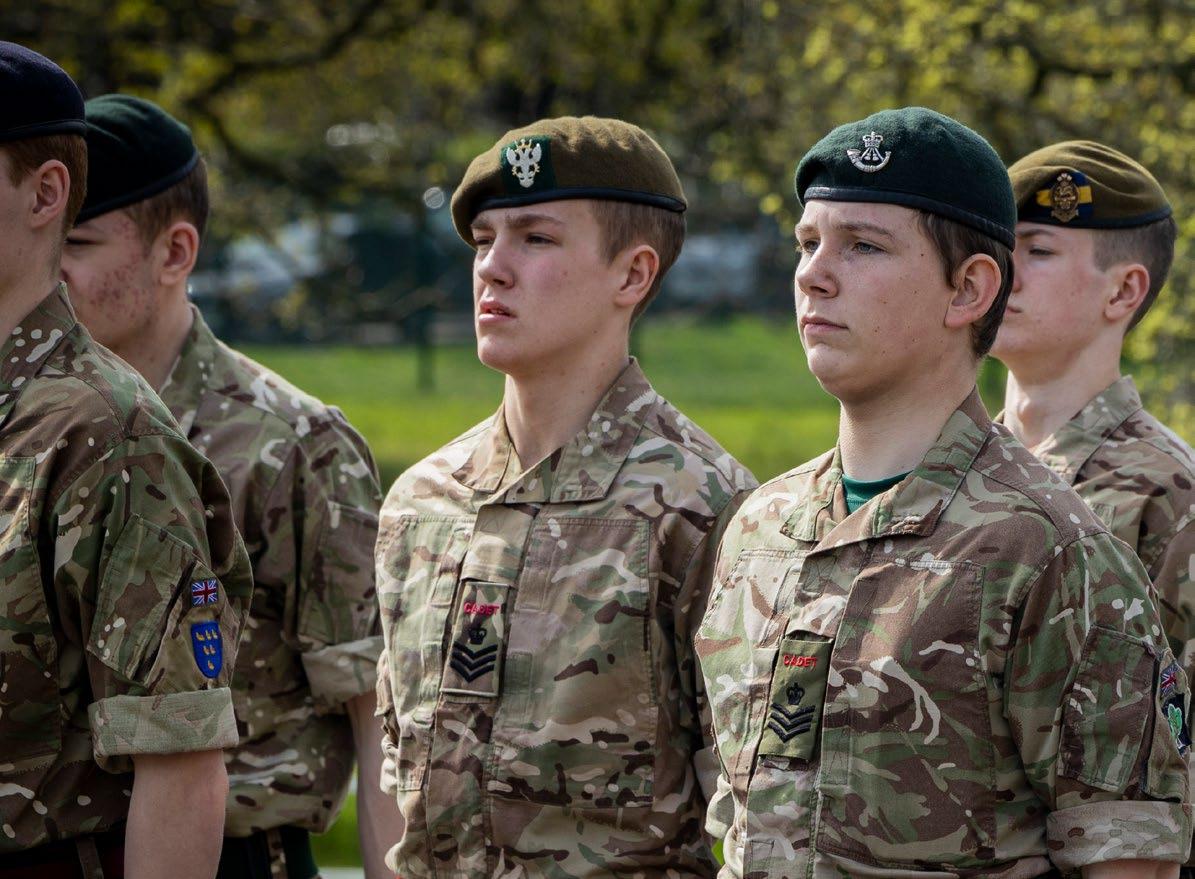
Bradley Gavan
B Company, Derbyshire ACF
Would you encourage other cadets to do the Master Cadet course?
I’d definitely recommend that all cadets aim and aspire to do this course as it’s the pinnacle of cadet training and brings together all of the other training we do within the Army Cadets.
How will you use the skills you’ve learnt on the course?
Teamwork is another of the most valuable things I’ve learnt, plus the discipline to be able to go through hard things and come out seeing the bright side. CDT SSGT
I’ve been taught great leadership and management skills and will be using them in my new position as cadet sergeant major. The course also taught me how to be resilient and an effective member of a team. It’s definitely the best course I’ve been on – inside and outside of the Army Cadets – and I’d do it again, given the chance.
What made you join the Army Cadets?
I’d wanted to join since I can remember. My uncle is an instructor with the Cadet Training Team, and I’ve always wanted to become a soldier.
What skills have you learnt during your time within the Army Cadets?
I’m currently 2-star competent in first aid, which means I’ve had the Youth First Aid training by St John Ambulance.
16 Army Cadets
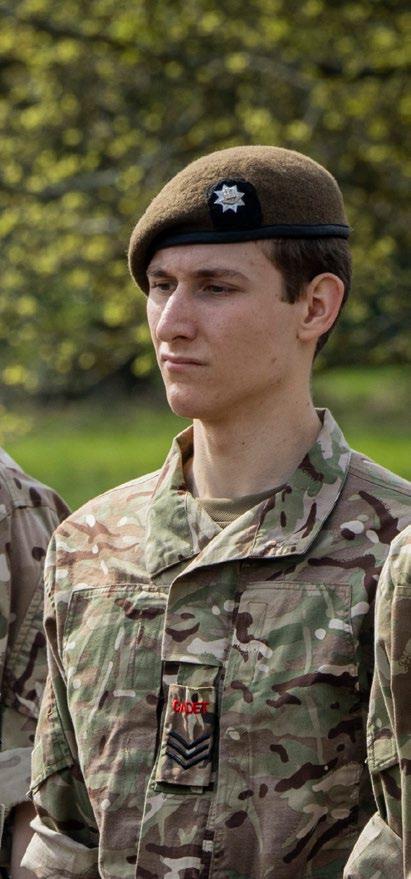
What are you planning to do next?
I’m doing an apprenticeship in HEV Mechanics. One of the main reasons I got the job was thanks to my experiences within the Army Cadets. After that, I want to join the Royal Marine Reserves then, hopefully, become a full-time soldier.
What’s been your greatest achievement?
Becoming a master cadet! Promotion to sergeant was a big one too, because I had to try so hard and there were so many obstacles to overcome.
Have you seen a difference in yourself since joining the Army Cadets?
When I joined at the age of 12, I was very small and lacked confidence. It’s given me new skills and allowed me to work for qualifications that I didn’t need to be academic to achieve. It’s also given me the confidence to do public speaking. For example, I can now go into a room full of people and give a lesson. When I was 12, I wouldn’t even have thought about doing that!
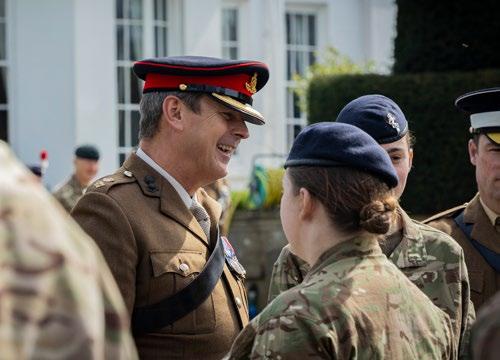
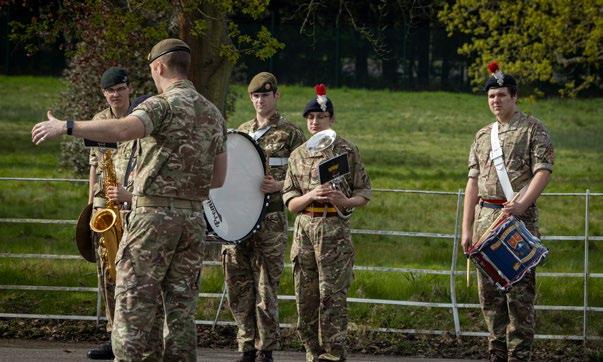
GO FURTHER
The Master Cadet is the highestlevel course a cadet can attend and includes activities such as fieldcraft and drill.
Established in 1989, the aim of the course is to broaden and develop the leadership, instructional and administrative responsibilities of 4-star cadets, opening up more
opportunities for them to use their newfound abilities within the Army Cadets. For many, it represents the culmination of their cadet careers.
To be awarded Master Cadet, the cadet must have:
• Successfully completed 4-star
• Hold the rank of Cdt Sgt
• Be at least 16 years old
Click here or scan the QR code to watch a video of Master Cadet training in action.
CADET LIFE
17 Summer 2024
How to prep for
CAMP ANNUAL
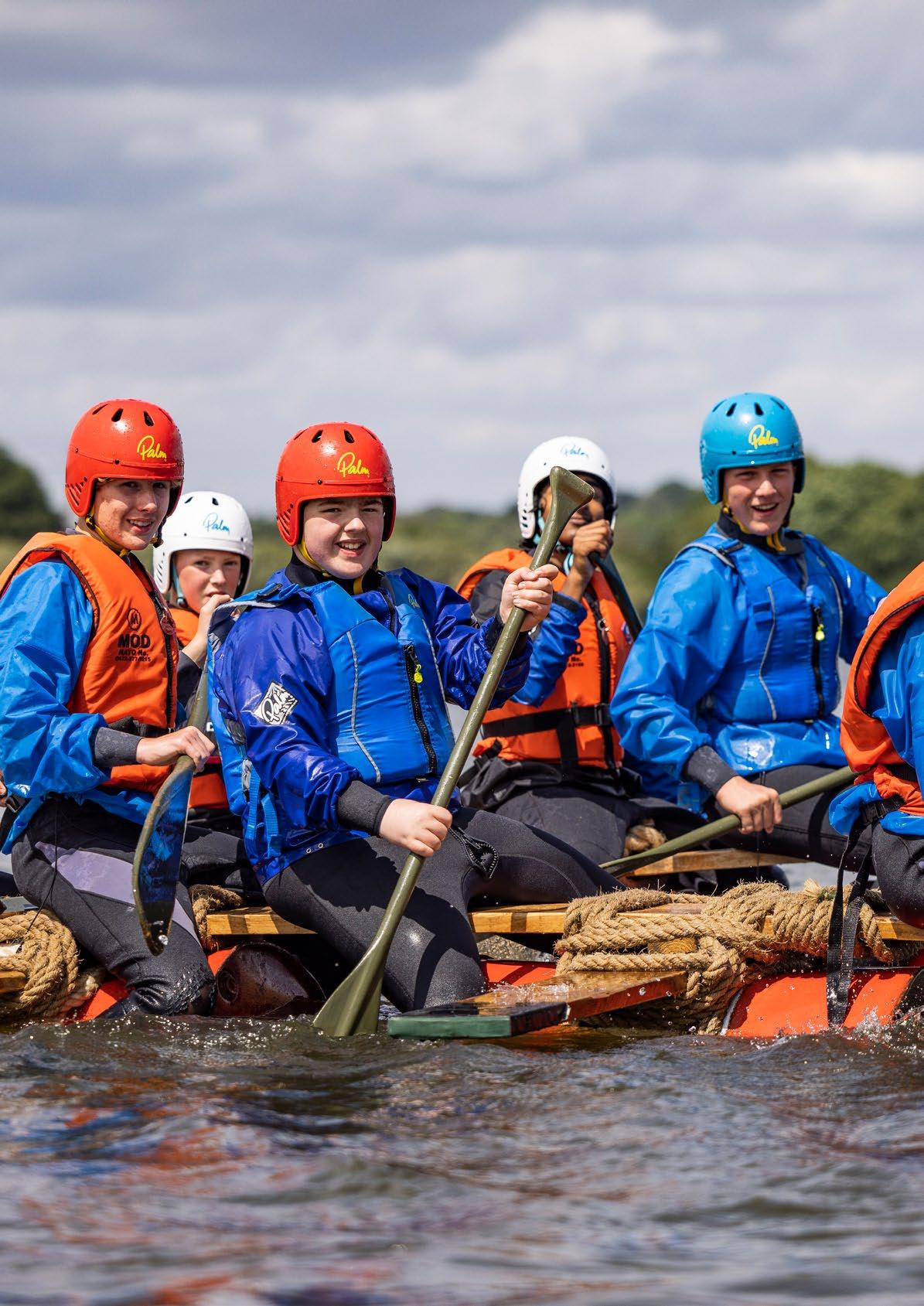
‘Be prepared to go out of your comfort zone; Your future self will thank you’
18

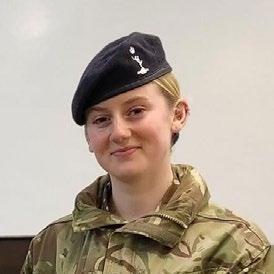
Annual camp is the highlight of the Army Cadets year. Here are the need-to-knows before you go, according to Cdt RSM Phoebe Clark of Yorkshire North & West ACF.
Talk through any worries
Have a chat with one or two senior cadets before you go if you are nervous about attending camp for the first time. Also, talk to others who’ve been before and can tell you what to expect.
Get yourself a good bunch of friends to hang around with. If you feel homesick or are struggling, they will know you better than anyone else. Remember, when you get to camp you can talk to friends, senior cadets and instructors if you have any wellbeing concerns.
Prep your skills
You will feel so much more confident if you revisit your Army Cadets knowledge before you go – the fieldcraft, drill and navigation manuals are great resources if you want to revise the syllabus.
If you’re a senior, take a bit of time to think through the kind of questions you could be asked by junior cadets and prepare some answers. Being up to speed will make you feel more confident. And if there are gaps in your knowledge, speak up about it in advance and see if someone can support you in that area.
CADET LIFE
19 Summer 2024
Image: Kate Knight
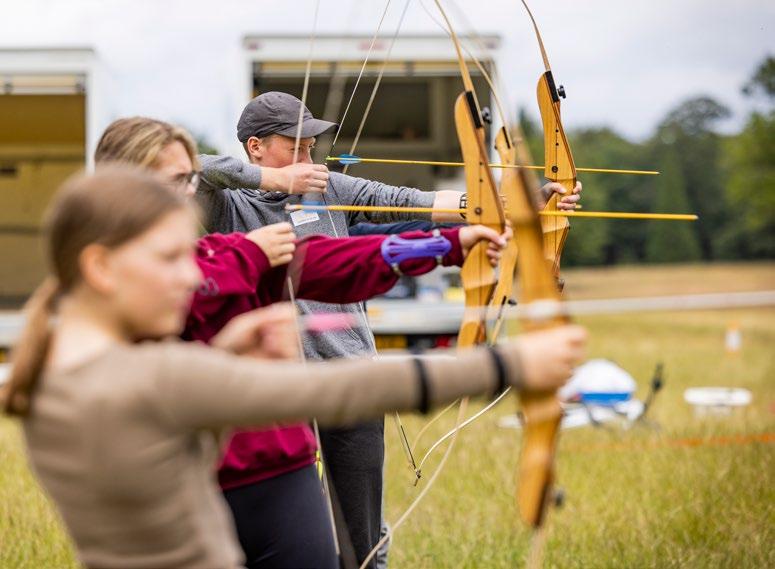
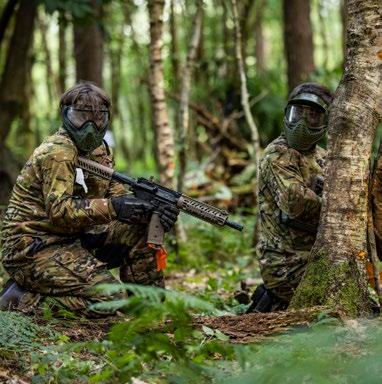
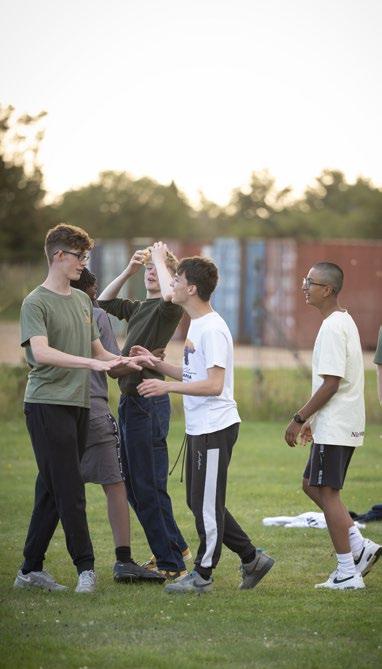
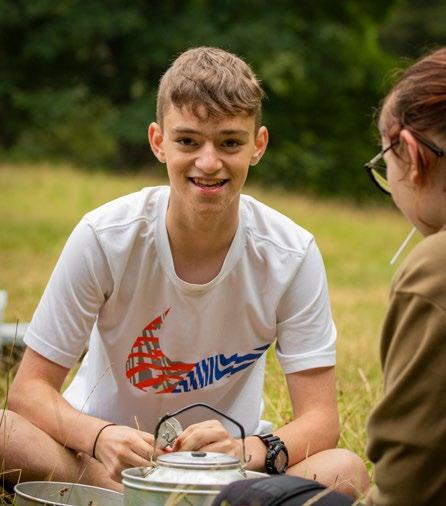
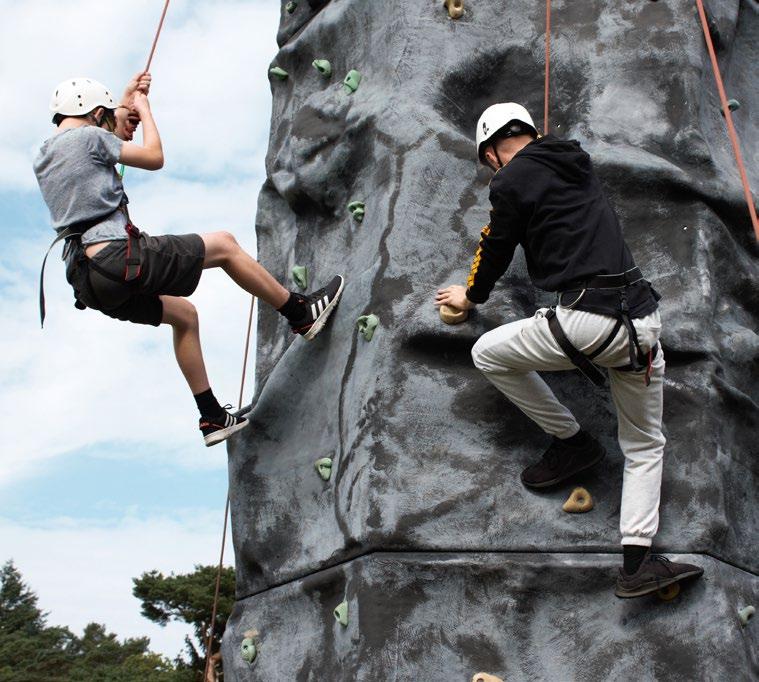
 Image: Kate Knight
Image: Charley Doyle
Image: Kate Knight
Image: Kate Knight
Image: Charley Doyle
Image: Kate Knight
Knight
Image: Kate
20
Image: Kate Knight
Army Cadets
Consider your kit
Listen carefully when you are briefed on what you will be doing at camp and make sure you pack everything on your kit list. That way you’ll be ready for each activity you’ll be involved in.
Don’t be that cadet who forgets their beret! Ensure you’ve packed yours. And don’t be afraid to take something from home that will be soothing and reassuring such as your own pillow or blanket.
‘Don't have anyone to hang around with?
Ask a senior to buddy you up with others’
Be ready to buddy up
If you get to camp and don’t have anyone to hang around with, don’t worry. Ask a senior if they can help buddy you up with others.
Remember, out of hundreds of cadets you won’t be the only one who may be feeling lonely or without a friend group. Let someone know so they can connect you with cadets with similar interests.
Get your attitude on point
If you need help with anything before or during camp, be the kind of cadet who asks. We all need to learn, so it’s good to reach out for help when you need it.
Be prepared to go out of your comfort zone; your future self will thank you. Be willing to try everything – if you don’t, you’ll be wasting the opportunities that annual camp can provide.
Finish each task. If there is an activity you don’t like, don’t just give up. You only have to give it your all for a short amount of time. Push through and you’ll develop resilience.
Be friendly
When you go to your room, aim to be friendly with everyone. If you have a good relationship with your roommates and are polite, it’ll be easier to make a request or suggest a time to turn the lights off.
Be prepared to communicate and compromise. For instance, if you want to go to bed earlier than someone else, you may have to compromise and agree to an inbetween lights-off time.
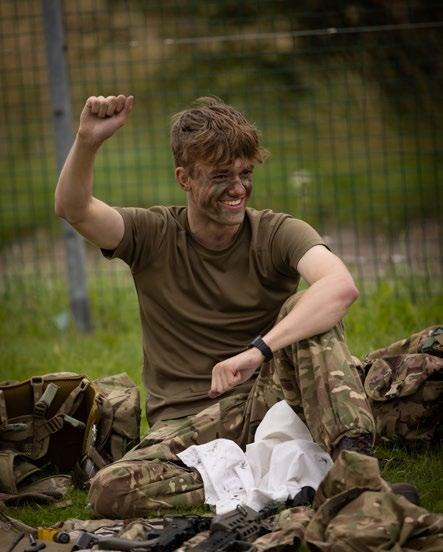
Camp survival tips
Clean your water bottle
Camps can be hot and hard work so a regular intake of fluids is important, but water will be more palatable if you clean your water bottle.
Cook your rations well
Good things come to those who wait – and after a hard day in the field, piping hot food is more desirable than a lukewarm meal.
Slather yourself in sun cream
Slather it on first thing and throughout the day to avoid burns and blisters.
Secure your bivvy shelter
Prevent the sheet flying off during the night by ensuring the bungee cords are tight and the tent pegs pushed in fully and at an angle.
Zip your phone in a safe pocket
Ensure your phone is secured in a zipped pocket and check it stays there throughout the day and between locations.
Know how to remove stubborn cam cream
To successfully remove all traces, use a basin of warm soapy water. Alternatively, if you are on exercise, wet wipes are effective.
CADET LIFE
21 Summer 2024
Image: Charley Doyle
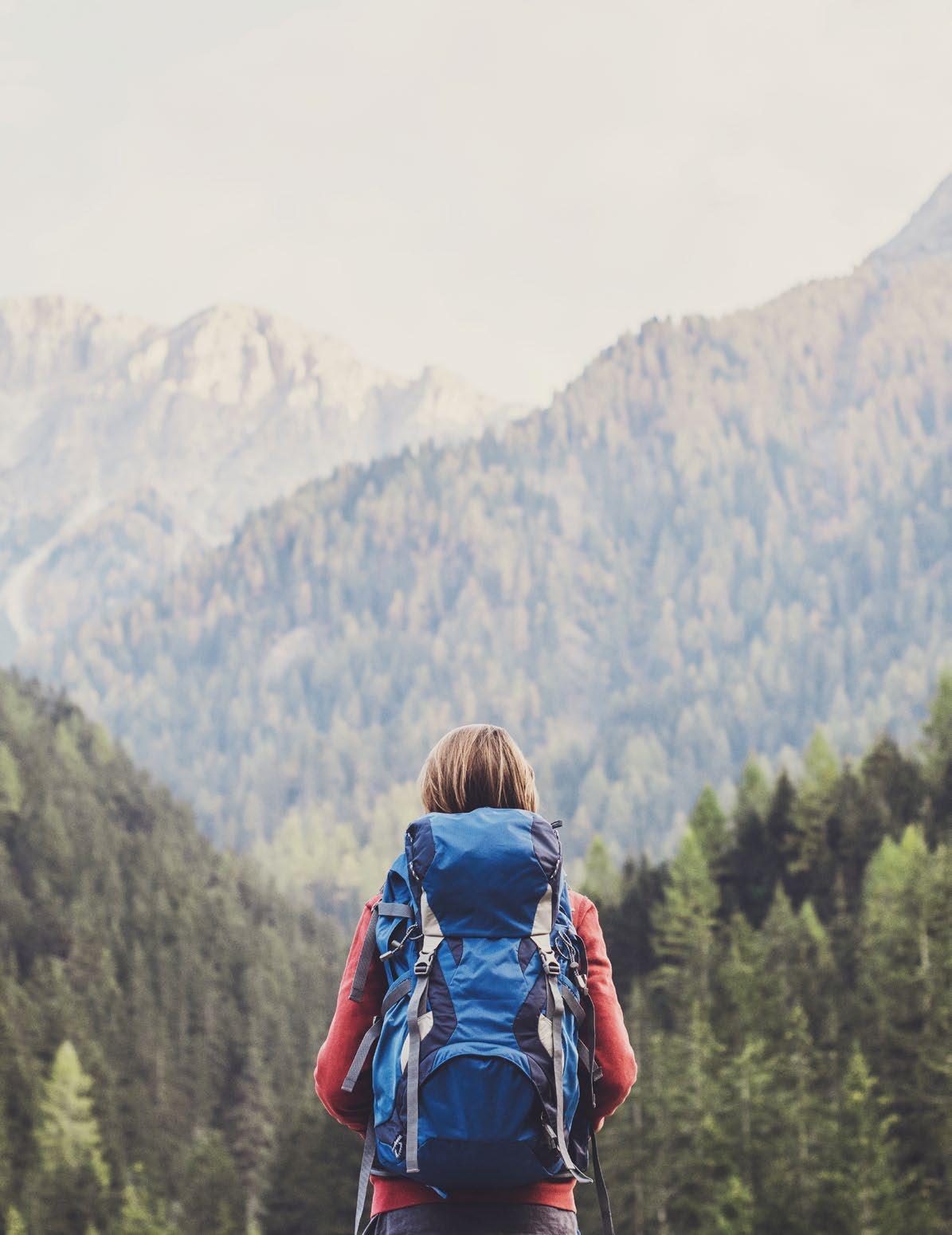
Be exped ready!
With expedition season upon us, we share the low-down on the three key elements of kit: boots, rucksack and sleeping bag. Get those wrong and you're in for a difficult time! Here's what you need to know.
22 Army Cadets

1. Carrying your kit
Expeditions often mean carrying all your kit for significant distances, which is why choosing the right size and weight – and knowing how to pack it – are essential for a successful exped experience.
Sourcing a rucksack
Modern rucksacks feature the latest tech, such as lightweight materials and multiple adjustment points, to make them fit well.
If you wish to buy a rucksack for an expedition, you’ll often come across shops with DofE Recommended Kit. Not only have these shops put thought into what’s best, but they usually have trained staff who can advise on the best rucksack for your venture – and for your body shape and size. Rucksacks are usually available in various shapes for different heights and genders.
Rucksacks can be provided from the stock of kit which your county will have.
Key things to look for when choosing a rucksack
• A strong and substantial waist belt
• Wide and padded shoulder straps with an adjustable sternum buckle
• A good number of pockets in accessible locations so you can separate kit
• An adjustable back system
Which size do you need?
Rucksacks are measured in how many litres they hold and typically range from small daypacks to large rucksacks which are big enough to hold your personal gear, food and water, plus sleeping kit for a number of days.
When deciding which size to choose, remember that you'll probably need to carry your rucksack for several hours each day. It's also worth noting that individuals shouldn’t carry more than 25 per cent of their body weight on expedition.
for two- or threenight expeditions
for onenight expeditions
Useful if you need to carry large tents or more specialised equipment
EXPEDITIONS
6570L Perfect
80L
60L
Ideal
23 Summer 2024

Pack like a pro
Knowing how to correctly pack your rucksack will ensure you can comfortably carry the load and have easy access to equipment.
Top tips for rucksack packing
• Keep your first aid kit in the same place on every expedition and in easy reach.
• Pack small items you might need during the day in the top of the rucksack.
• Pack the heavier items close to your back with balanced weight on each side.
• Items of clothing such as mid layers and waterproofs should be kept at the top of your rucksack so you can access them quickly.
• Liquids such as stove fuel and sunblock should be stored near to the outside of the pack in sealable bags. You can also store them vertically in side pouches.
• Spare clothing should be carried near the bottom of the rucksack, filling any available space.
• Pack your sleeping bag in a separate waterproof bag inside your rucksack.
• Pack each meal separately to help you ration your food. Lunch should be near the top and snacks easily available when you need an energy boost.
• Use items such as survival bag, wash kit and towel to fill any gaps in the main body of the rucksack.
• Kit you are likely to need at night, such as head torch, batteries and chargers, should be packed together so they’re easy to find.
• Ensure the stove is thoroughly clean and dry, then pack it close to your back to maintain your centre of gravity.
• Ensure all your kit is packed in your rucksack in waterproof bags such as dry bags or heavy-duty bin bags.
Roll mat Snacks Head torch First aid kit Sunblock Toilet paper Waterproofs, hat, gloves Lunch Wash kit Survival bag Stove Plates Camping kit Tent Sleeping bag Food Clothes Water bottle Liquid fuel
24 Army Cadets
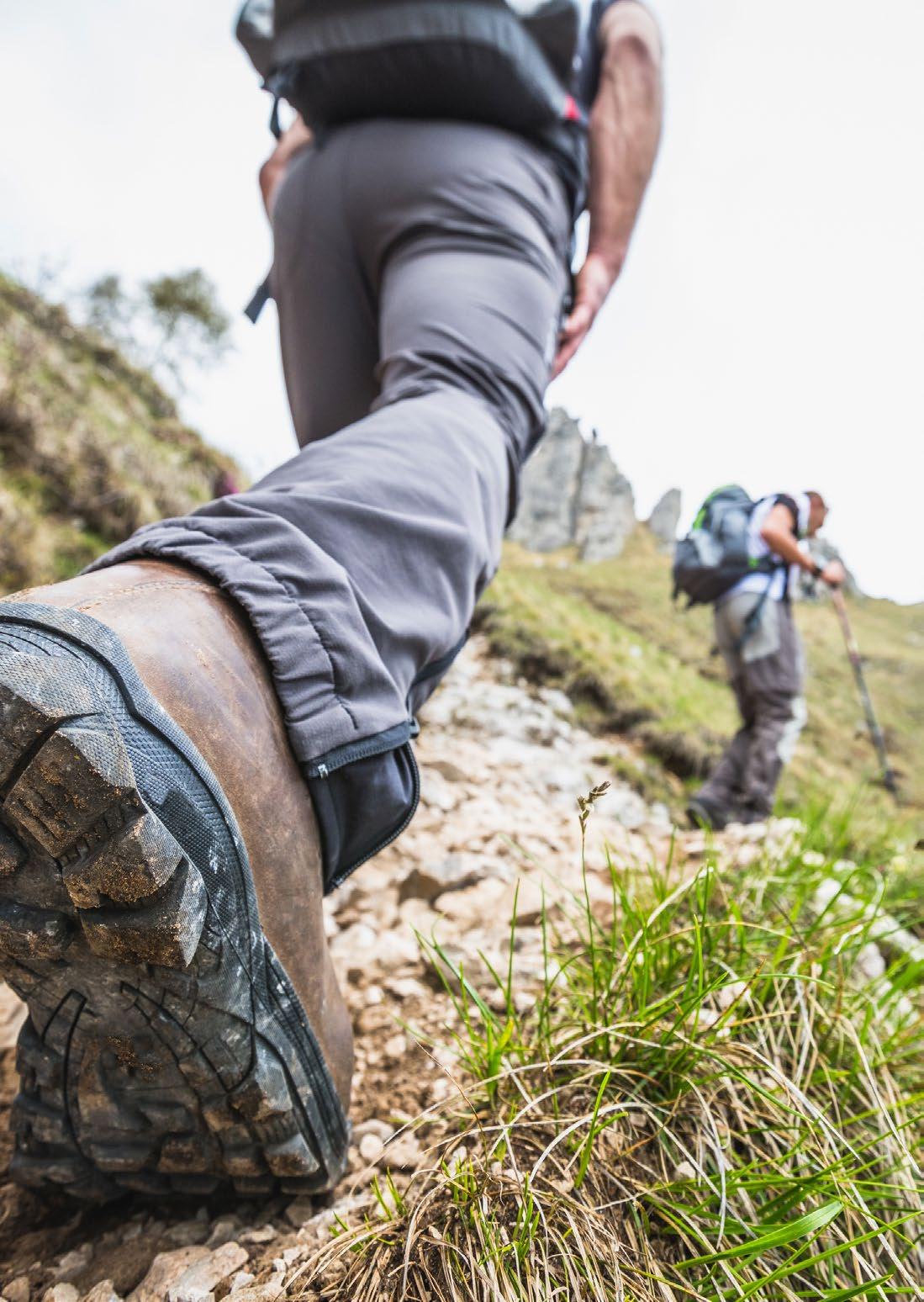
2. Boots and footcare
It's very important to consider your footwear when preparing for an expedition. It must be comfortable and provide adequate support for the activity being undertaken.
People’s feet are not only different sizes but they’re also different shapes, which is why boots come in different shapes too.
Find a pair that suits your foot shape and is designed for the particular activity, season and terrain you’ll be wearing them in. As boots are very personal, time and care should be taken when choosing them. Most importantly, make sure they’re worn-in and waterproofed before every expedition.
EXPEDITIONS 25 Summer 2024
Buying boots
Walking boots are an expensive investment, so it's worth spending time considering what you need in order to make a good purchase.
Ask your detachment or contingent colleagues for recommendations and look out for secondhand pairs for sale from other cadets. When young people's feet are still growing, boots can get very little wear before they become too small. You can pick up a great bargain this way.
There are two main types of material from which walking boots are made. Here's what you need to consider when deciding on the right style for you.
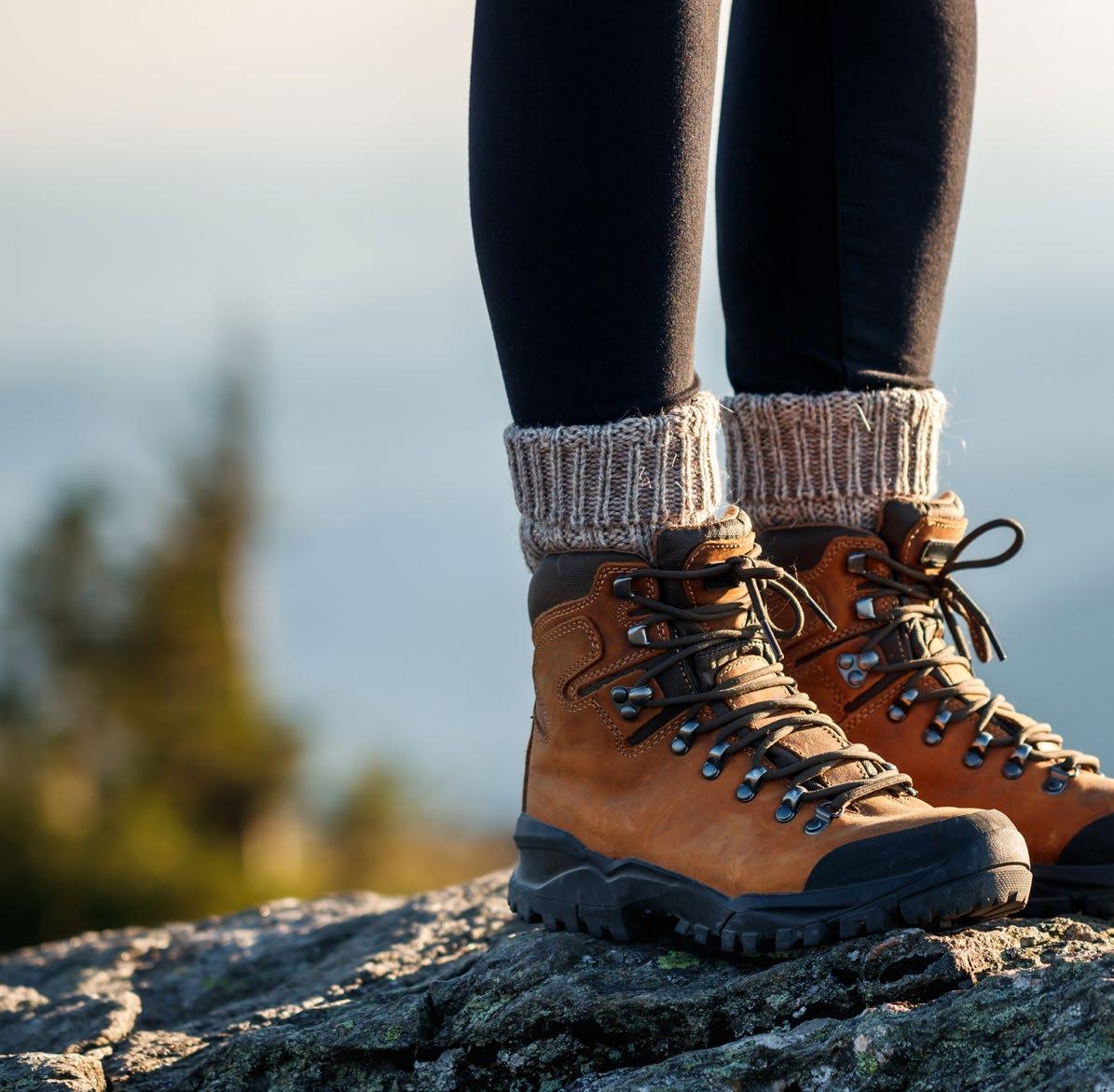
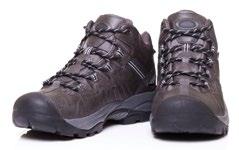
Leather
Leather boots are soft, waterproof, easy to look after, durable and abrasion resistant. This can make them longer lasting but they’re often more expensive.
Fabric

Fabric boots are lighter in weight and need more maintenance, including treating them with a waterproof coating. They are often cheaper, which makes them a good option for feet that are still growing.
vs 26 Army Cadets

Boot essentials
• When buying boots, try them on with the socks you plan to wear on expedition.
• There are many different ways to lace boots. Try various lacing styles and walk around in them to find the best one for you.
• Boots must have ankle support to protect you while you’re carrying a heavy rucksack and walking on uneven terrain. They also need a deep tread for grip.
• When deciding how much to spend on new boots, consider how often you’ll use them, and if your feet are still growing.
• Clean your boots immediately after use to prevent damage. Remove insoles or footbeds to enable boots to dry completely.
• Looking after your boots before, during and after use will improve their waterproof capabilities and durability. This, in turn, will keep your feet as dry and comfortable as possible.
Walking socks
Socks should ideally be chosen and bought before you buy your boots. They should have padding on the bridge, toes and heel to prevent rubbing. Liner socks can also be a good idea.
Many socks have moisture-wicking capabilities, especially those made from lambswool, merino wool, silver or nylon. This can help keep feet dry and prevent odour.
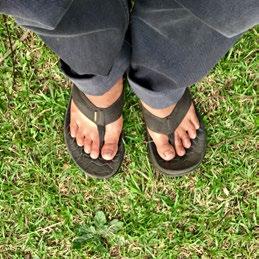
‘Take flip-flops or sliders to wear around camp’
Guide to foot care
It’s essential to look after your feet before, during and after an expedition to enable you to complete the challenge without being in pain – or worse, having to pull out altogether. Here's what you need to do.
BEFORE
• Cut your toenails.
• Make sure your feet are as comfortable as possible: spend time trying different boots and options with socks and lacing methods.
• Break in your boots early. Wear them as often as you can in different types of weather and terrain, and while carrying kit.
DURING
• Take flip-flops, sliders or lightweight sandals or trainers to wear around the campsite. This will allow your feet, socks and boots to air, dry and recover while you're in camp.
• Take at least one pair of socks for each day, plus a spare.
• If it suits your feet, layer liner socks under a thick pair. This can prevent friction and improve moisture-wicking features.
• If your boots get muddy, try to clean them off in a puddle to ensure they continue to offer your feet the best protection possible.
• Carry blister plasters. Prevention is better than cure: use them in areas you think may suffer or at the first sign of rubbing.
AFTER
• Clean boots well and let them dry naturally – do this as soon as possible.
• Store your boots in a dry, well-aired space. Don’t store them wet as it can cause mould and rot.
• Wash your socks inside out. It will reinvigorate the cushioning.
EXPEDITIONS
27 Summer 2024
Don’t store sleeping bags in their stuffsacks as it damages their filling. Store hanging up or in a bin bag.
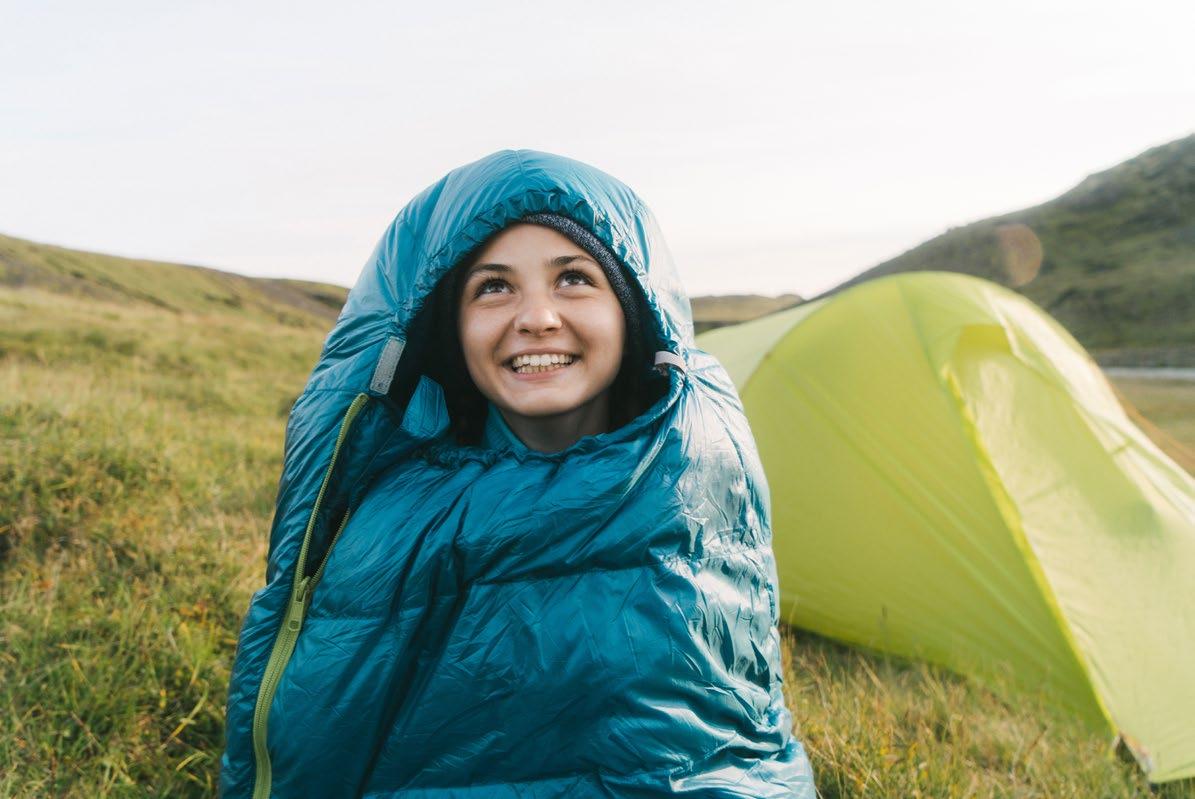
3. Sleeping kit
Using a decent sleeping mat and a sleeping bag that will keep you warm –but not too warm – is essential for a good night's sleep. Sleep well and you'll have the physical and mental energy to take on the challenges of the following day.
Sleeping bags come in the following types:
• 1-2 season = summer
• 3 season = spring/autumn
• 4 season = winter
Choose a sleeping bag designed to be used at the lowest expected night-time temperature, as you can undo the zip if you’re too warm.
Also think about what you'll use as a pillow. A pillowcase stuffed with clothes makes a decent headrest and doesn't add much weight to carry, or you might invest in an inflatable pillow, which is also light and provides even more comfort.
A well-designed sleeping bag will have most of the features in the image above. A good hood, neck baffle and zip baffle will improve insulating capability. Check the bag is of a suitable length – too short is uncomfortable while too long means carrying unnecessary weight.
Hood
baffle Shell material
Zip
Footbox
Zip Insulation TIP
Neck baffle
28
4. Packing checklist
Your expedition leader will provide you with a specific packing list for your expedition and advise you on the kit to be carried between the group – gear like tents, camping stoves and fuel – but this checklist for personal kit is useful to ensure you don't miss anything essential.
Walking boots
Walking socks
Sock liners (optional)
Waterproof jacket/coat
Waterproof trousers
Fleece or similar top/jacket
T-shirts (ideally long sleeved)
Walking trousers
Shorts (if appropriate for climate)
Underwear

Flip-flops/sandals (for campsite use)
Warm hat and/or sun hat
Gloves
Gaiters (optional)
Sleeping clothes (optional)
Rucksack
Rucksack liner/dry bag/strong plastic bag
Sleeping bag
Sleeping mat
Waterproof bags/dry bags for kit
Sleeping bag liner (optional)
Whistle
Torch and spare batteries
Personal first aid kit
Food
Emergency rations
Water bottle
Plate/bowl, mug/cup
Cutlery
Matches or lighter (in a waterproof container)
Wash kit and towel
Watch
Sunblock
Notebook and pencil
Small amount of money (optional)
Additional optional kit to consider
Head/neck scarf
Hydration pack/bladder
Walking poles
Storm shelter
Aftersun lotion
Sunglasses
Insect repellent
Spare boot laces
Ball, frisbee and playing cards
Mosquito net
Water-purifying tablets
Foot powder
Image: DofE EXPEDITIONS
29 Summer 2024

Going for

Cdt Under Officer (UO)
Harnaam Singh reveals why the DofE Gold Award was a life-changing adventure for him – and how his detachment-commander dad helped him through the tough moments.


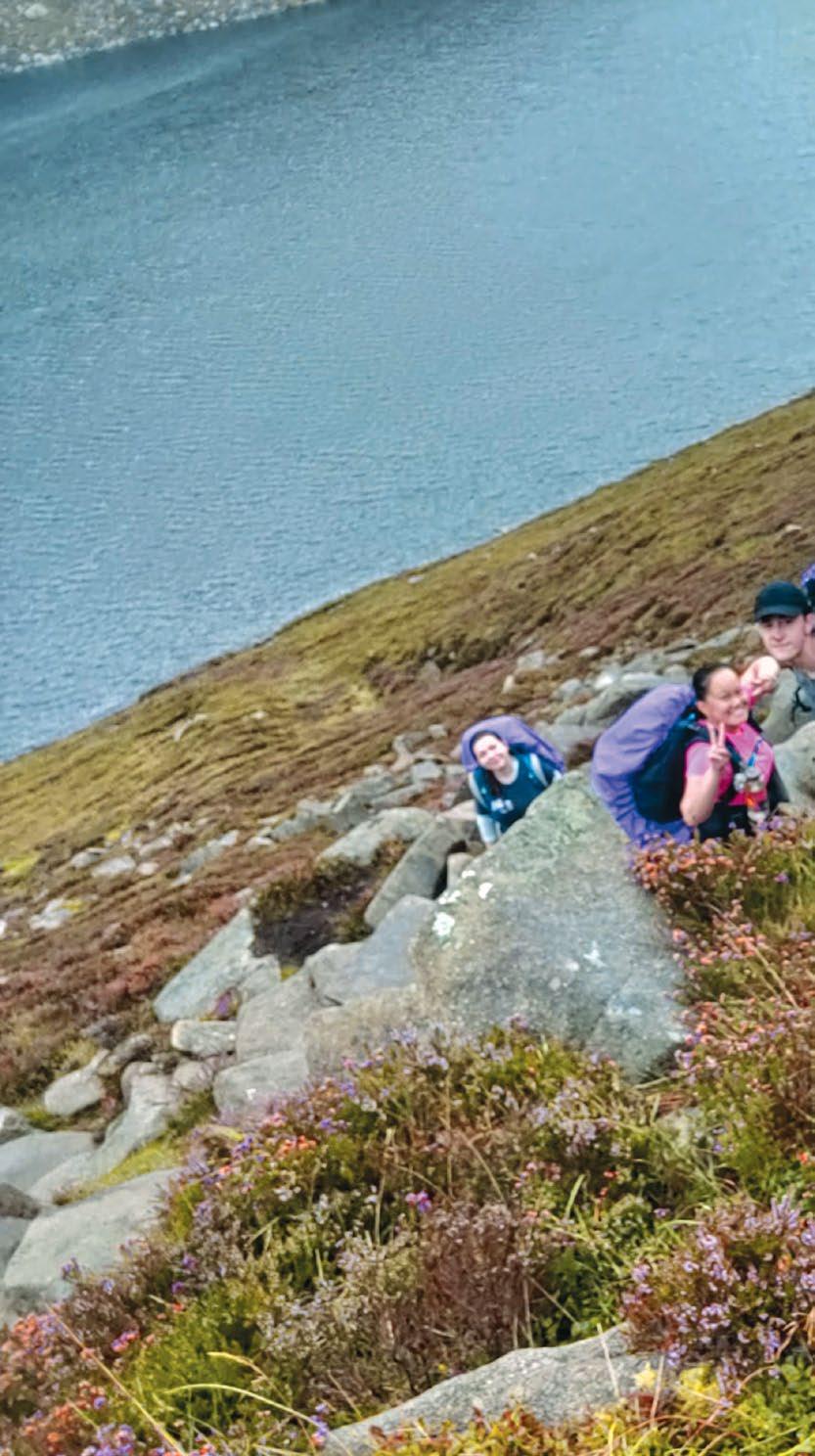
30 Army Cadets
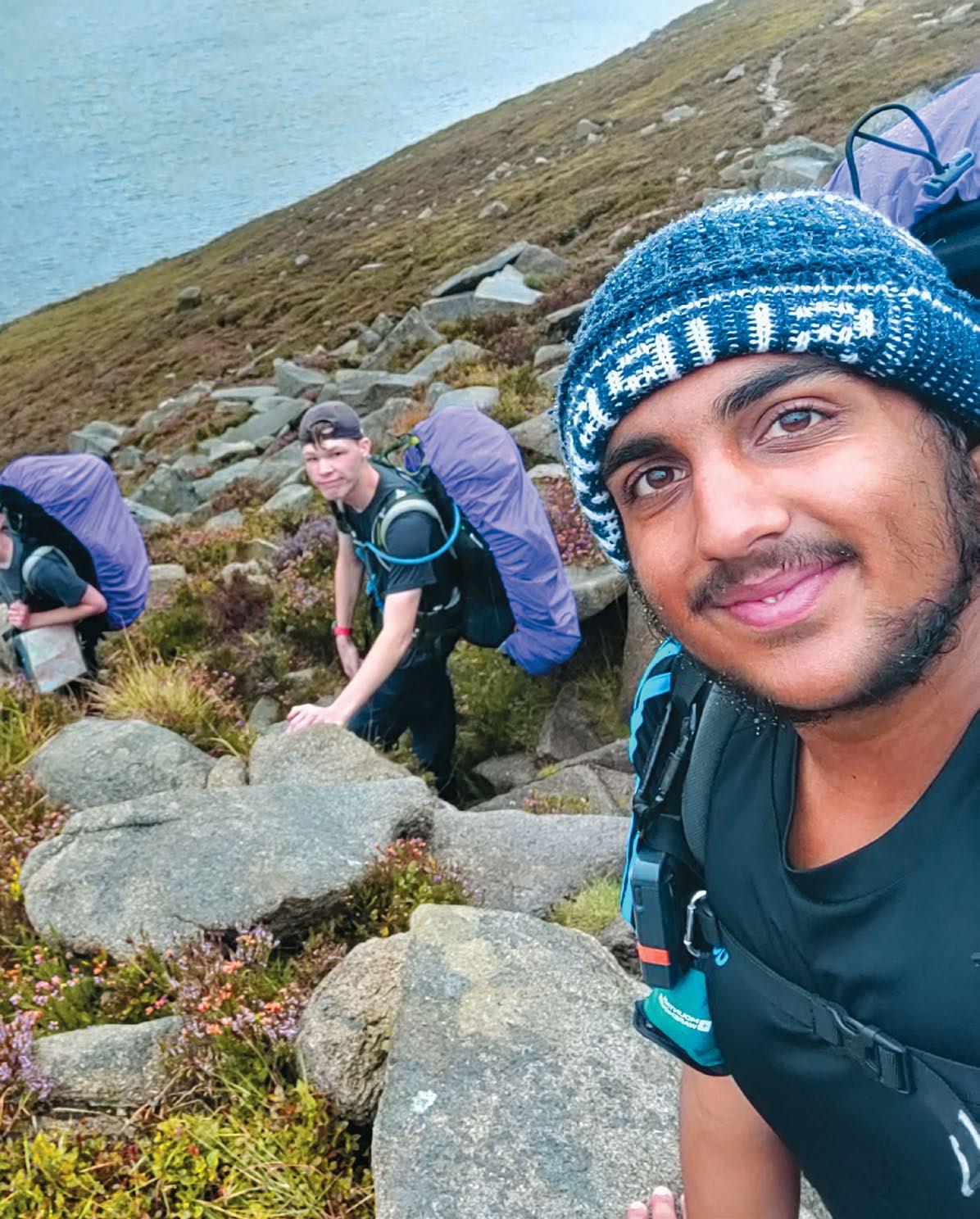
EXPEDITIONS 31 Summer 2024
Cdt UO Harnaam Singh (right) pauses for a selfie on his DofE Gold expedition

dt UO Harnaam Singh of Bilston Detachment, Staffordshire & West Midlands (North Sector) ACF, joined the Army Cadets in 2018.
He signed up for the DofE Bronze Award through the Army Cadets in 2020 but was thwarted by the lockdowns and disruption of the Covid-19 pandemic. By the time life had returned to normal, Harnaam was 16, so he decided to bypass the Bronze and Silver Awards and go straight for Gold.
‘By missing the Bronze and Silver Awards, I had to spend a few months longer on some sections of the Gold Award, so it took me two years to complete the five sections,’ he says. ‘It was easy to find time to do the Award though, as lots of Army Cadets activities count towards it, and I really enjoyed most of the sections, so I didn’t mind prioritising the time.’
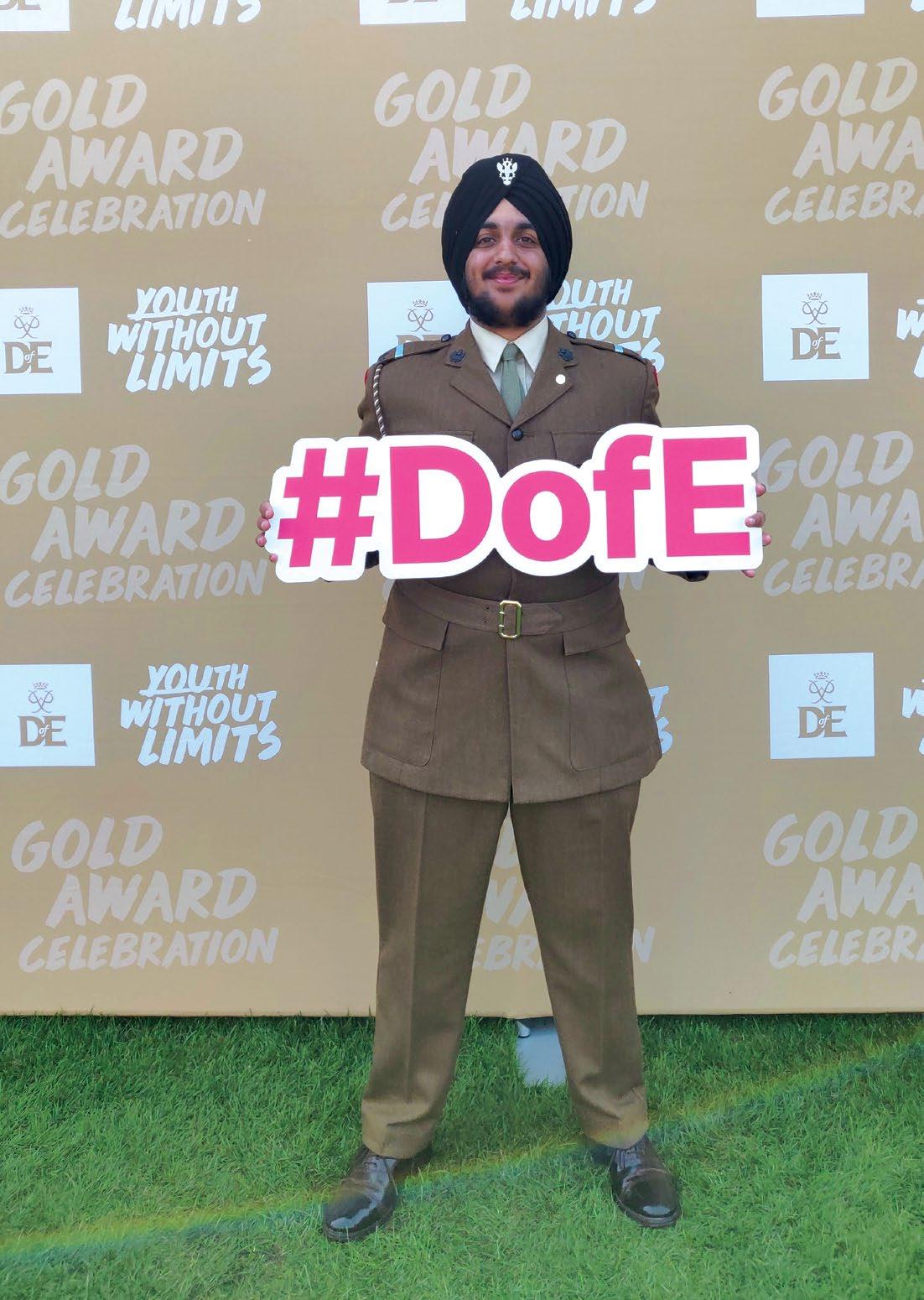
 Clockwise from top: Harnaam receives his DofE Gold Award at Buckingham Palace; Harnaam with the Duke of Edinburgh; SMI Ranjit Singh, Cdt
UO Harnaam Singh and Cpl Jujhar Singh
Clockwise from top: Harnaam receives his DofE Gold Award at Buckingham Palace; Harnaam with the Duke of Edinburgh; SMI Ranjit Singh, Cdt
UO Harnaam Singh and Cpl Jujhar Singh
32 Army Cadets

Golden opportunity

and the Army Cadets can be challenging at times, so I feel I’m here to support and encourage them. The smile on their faces when they feel a sense of achievement is the reason I do it.’
Transformative experience
SMI Ranjit Singh volunteered to support Harnaam’s DofE qualifying expedition in Northern Ireland. He transported cadets and their kit to Ballykinler and stayed around to help.
For the Volunteering section, Harnaam opted to develop the instructing he was already doing. Harnaam's dad, SMI Ranjit Singh, is also his detachment commander and had encouraged his son to do some instructing, so for the Volunteering section Harnaam took this a step further.
SMI Ranjit Singh says: ‘Adults can instruct from manuals, but cadets who are further along in the Army Cadets experience can pass on useful practical information to younger cadets: what really goes on at camps, and tricks and tips to thrive during expeditions – things like using a plastic rations bag to keep your map dry, or how to whittle down the stuff you'll carry.’
SMI Ranjit Singh is in no doubt about the value of the DofE Awards to cadets. He says: ‘I encourage all my cadets to achieve DofE Awards as the qualification is recognised all over the world, and I know they’ll have amazing experiences, push their boundaries, learn new skills and meet some fantastic people. With the Gold Award, they also have the opportunity to visit a Royal Palace to collect their award, which is a once-in-a-lifetime moment.’
Challenging times
Both Harnaam and his father acknowledge that the Gold Award is prestigious because it is difficult and tests participants’ resilience and commitment. ‘I found some of the CyberFirst courses I chose for my Residential and Skills sections really tough and was grateful for the encouragement of my dad and course mates,’ says Harnaam.
He was also worried about bad weather and boggy ground in the lead up to his DofE expedition, but a practice trek in Snowdonia transformed his mindset: ‘I was with a great team of people and we had lovely weather. I learnt that being positive makes a big difference – skin is waterproof, and it's okay to stop to eat a flapjack and enjoy the view for a couple of minutes. It can help to tune into the natural beauty around you.’
SMI Ranjit Singh adds: ‘Sometimes I do feel like a third parent, nagging cadets when they lose momentum. DofE
‘One of the supervisors invited me on a walk to the highest peak,’ he says. ‘Halfway up, the weather became terrible! It was challenging but I enjoyed it and understood how the cadets felt.'
As well as supporting the development of the cadets in his detachment, he feels he has grown through his role as a CFAV. He joined the Army Cadets in 2009 as part of a community project and had no military background or knowledge of the Army Cadets. ‘I discovered that I love supporting young people to push their boundaries, explore opportunities and learn skills outside academia. I’ve also learnt a lot and met people and, as a result, am a more well-rounded person.’
Future plans
Sharing the Army Cadets experience with family members can have its ups and downs, but is mostly positive, insists Harnaam: ‘Seeing my father in his role as a CFAV, I understand the effort and sacrifice made by a lot of the CFAVs. My brother, Cpl Jujhar Singh, is also a cadet and I think the experience has brought us all closer together. I’ve learnt a lot from Dad, and I’d like to think I’ve taught him a few things from a cadet’s perspective!’
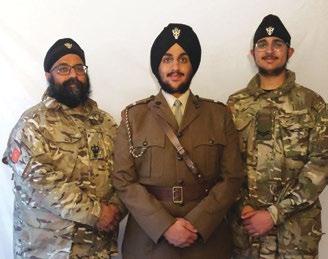
Although Harnaam is about to age out of the Army Cadets, he plans to return as a CFAV in the future. ‘I want to give back to the organisation and help cadets get the most from the experience. Dad has always urged me and my brother to grab opportunities like the DofE Awards when they arise, and I’m so glad he did. Now I want to do the same for others.’
SMI Ranjit Singh agrees: 'I always encourage cadets –including my sons – to take advantage of everything on offer in the Army Cadets. I wish I’d known about it when I was their age, but thankfully there are plenty of opportunities for CFAVs, too!'
EXPEDITIONS 33 Summer 2024

Insider's guide to completing Gold
Harnaam reveals the activities, tasks and challenges he undertook for each of the five sections of the DofE Gold Award.
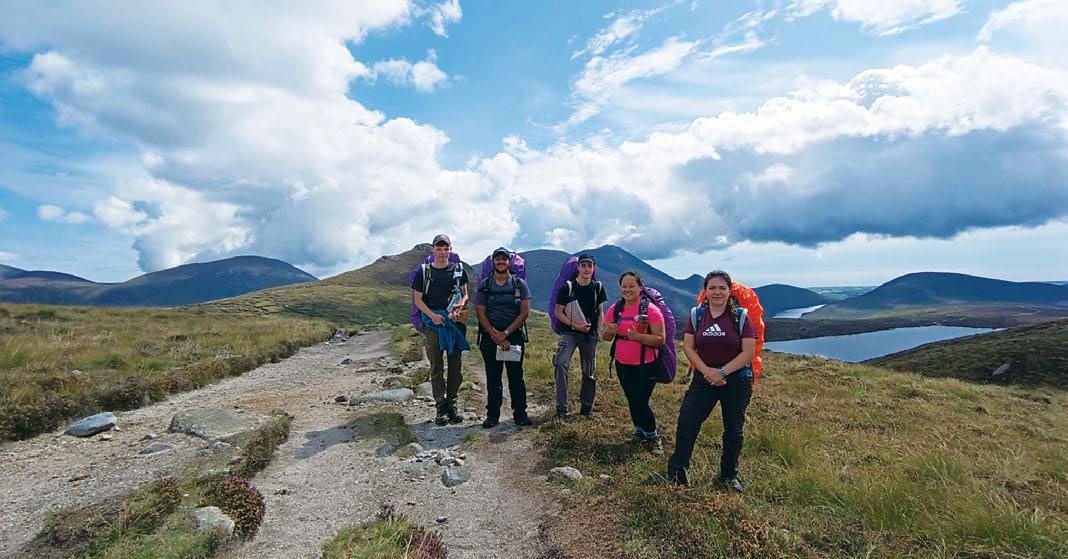
Volunteering
Participants must dedicate at least an hour a week over 12 months to help others, such as teaching, instructing or supporting their Army Cadets unit, or helping out at a local community event, club or group of their choice.
Harnaam says: ‘I’d instructed at my detachment for years, so, for this part of the award, I looked back on past instructional courses and further developed my techniques to better support the junior cadets. At one stage, I was teaching six lessons per week and assisting in areas like drill, fieldcraft, first aid and navigation.’
Physical
Participants must dedicate at least an hour a week over six to 12 months to take part in a sport or activity of their choice that will improve their physical health, such as running, swimming, netball, football, climbing or canoeing.
‘I opted to focus on one of my favourite sports, cricket, which I played at school and at my local club. I was playing seniors cricket, so I got to play all over the county with people who were older than me, some of whom have played for over 20 years, so it was a fantastic experience.’
Skills
Participants develop skills in a chosen pursuit over the course of six to 12 months. These can include hobbies such as crafts, cooking, playing a musical instrument, or activities in the Army Cadets, such as ceremonial drill, learning first aid, or developing fieldcraft and leadership skills.
‘I developed my cyber knowledge for the Skills section of my award and then completed the CyberFirst Advanced course for the Residential section. Cybersecurity is fascinating and it was great to spend a few days with a brilliant group of people.’
Expedition
Participants undertake a self-sufficient expedition as part of a team, over four days and three nights. This might be on one of the many expeditions available within the Army Cadets.
‘My qualifying expedition was in Ballykinler in Northern Ireland. A low point was crossing a bog at the foot of Slieve Donard mountain – we had to take a cautious approach for about two hours – which tested our spirit and teamwork. High points were the vast mountainous landscapes, glorious sunshine and pure mountain streams.’
Residential
Participants take part in a residential activity of their choice that focuses on building relationships and achieving a group aim over five consecutive days. This could be on a course at Cadet Centre for Adventurous Training (CCAT) or other specialist camps.
‘The five-day CyberFirst Advanced course counted towards my Skills and Residential sections. I knew the Advanced course would be tougher than Defenders, but I was completely out of my depth – I’m happier outside doing fieldcraft! I reached out for help and was encouraged to continue. I’m glad I pushed my boundaries and stuck with it.’
34 Army Cadets
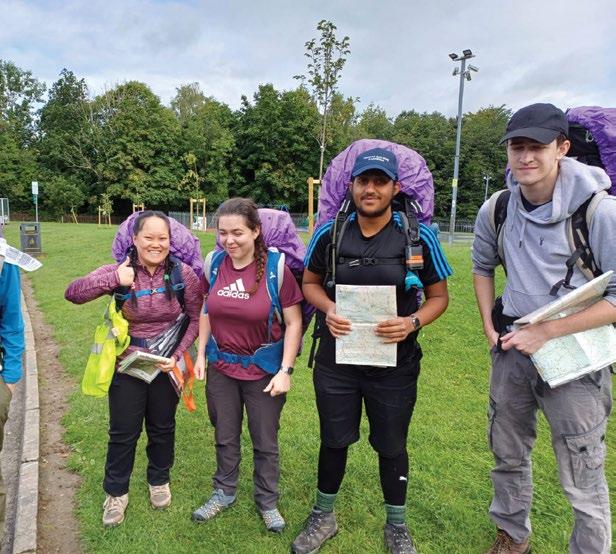
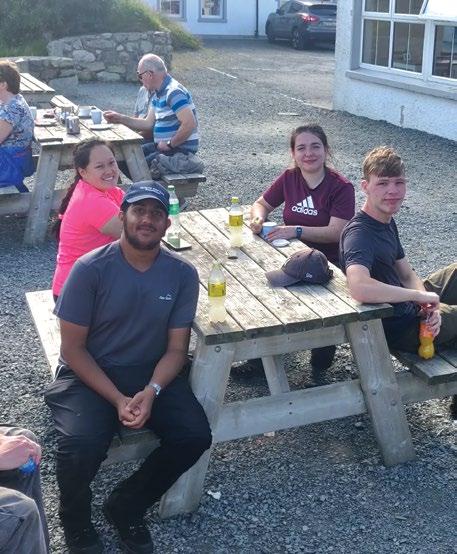
Harnaam's
DofE expedition advice
‘Shorts with base-layer leggings is a comfortable combo’
1. Don’t pack too much food – opt for freezedried meals and calorie-dense snacks like nuts, flapjacks and protein bars for energy.
2. Ration-pack forks are ideal on expeditions, as they’re strong, light and long enough to reach into the corners of meal pouches without you having to get your hands covered in food.
3. Water bladders are more comfortable to carry and easier to use than bottles of water.
4. Don’t assume you need walking poles – I prefer to walk without them. Try them for yourself in a practice expedition and if they don’t work for you don’t use them.
5. Practise walking with your packed bag before the expedition to help you find the most comfortable position and weight distribution.
6. It can be helpful to keep a small towel clipped to your rucksack, so you can rinse and wipe your face occasionally. It’s amazing how much better it makes you feel!
7. Wearing shorts (or trousers that unzip at the knee) with base-layer leggings beneath is a lighter and more comfortable combo than full-length trousers.
8. Dry wet socks by carrying them on the outside of your bag. If you can’t do that, put them in the bottom of your sleeping bag overnight – as the bag warms up, the socks will dry.
9. Always pack too many pairs of socks and plenty of foot powder because happy feet are key to a happy spirit on expeditions.
 Harnaam with his team on a DofE Gold expedition
Harnaam with his team on a DofE Gold expedition
EXPEDITIONS 35 Summer 2024
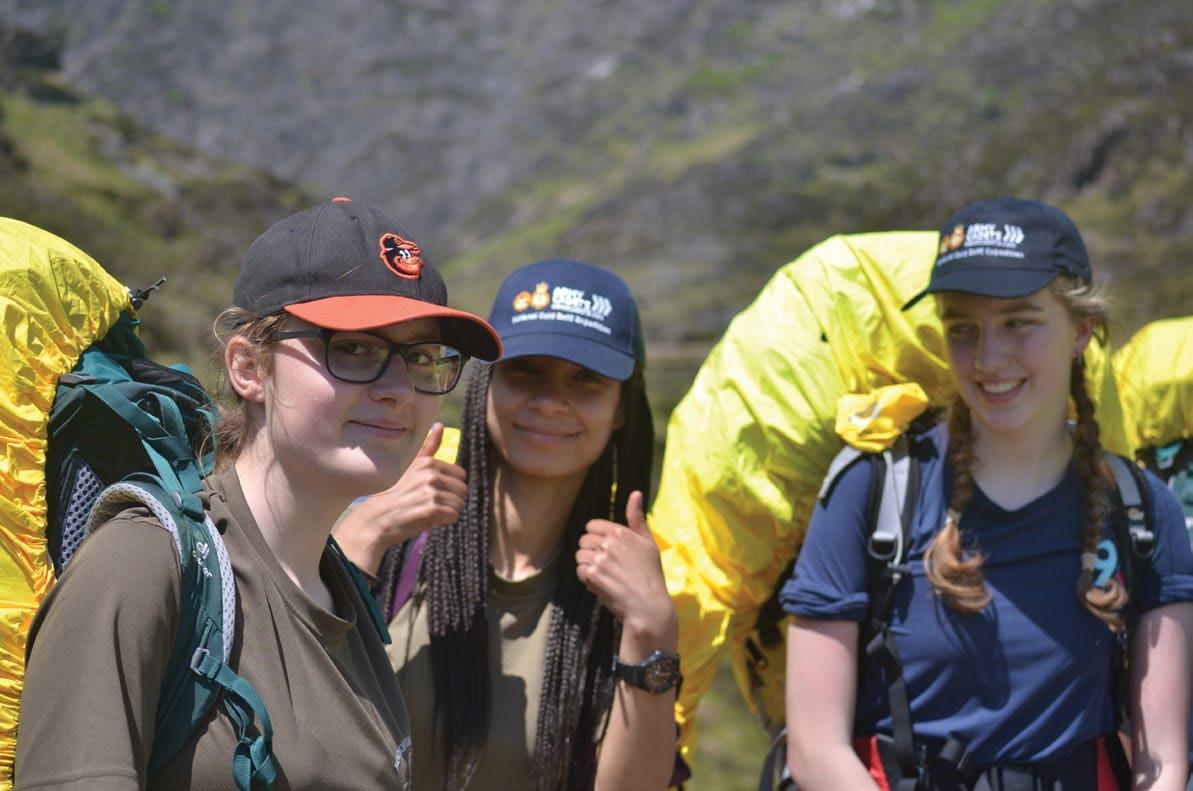
standard GOLD
Liz Green, HQ Cadet Branch DofE Lead, gives us the briefing on the DofE Gold Award.
What is DofE?
The Duke of Edinburgh's Award (DofE) is an internationally recognised award which acknowledges the amazing achievements of participants who undertake volunteering, physical activities, skills development and expeditions at Bronze, Silver and Gold levels.
Gold Award participants need to complete an additional five-day residential course. As they progress, participants develop confidence, resilience, commitment, self-motivation and teamwork skills. These qualities are sought after by employers and are helpful in all aspects of life.
What’s involved in the DofE Gold Award?
The Gold Award is the highest accolade and has five sections: Volunteering, Physical, Skills, Expedition and Residential. There are lots of opportunities within the Army Cadets to complete the sections, which can make it easier for cadets to find the time needed to dedicate to each one. Cadets can even use their Volunteering section to support other cadets to achieve their awards – they can access the DofE Young Leader programme or do a practical DofE Skills course to help them do this.
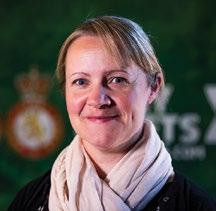


How long does it take?
Participants with a DofE Silver Award must complete the Gold Award programme over 12 months. Those without a Silver Award must spend 18 months on the programme by undertaking a further six months in either the Volunteering or the longer of the Physical or Skills sections.
Who can take part?
Cadets over the age of 16, and CFAVs up to the age of 25, can complete the DofE Gold Award through the Army Cadets. Around 100 members achieve the Award each year.
Interested in taking part?
Speak to your county or contingent DofE officer to find out how to register. Every young person who achieves their Gold Award will receive a Gold Award badge/brooch and certificate. They, and a guest, will also be invited to attend a Gold Award celebration event at a Royal Palace, attended by a member of the Royal Family. It’s an exciting opportunity; I’d encourage all cadets to give it go!
36 Army Cadets

Liz’s tips for DofE success
• Choose activities that are challenging but also enjoyable and achievable.
• Download the eDofE app and regularly upload evidence such as photos and screenshots.
• Get dates for the expedition and residential sections in your diary early.
• Be open about doing your Gold Award, so others can encourage and support your progress.
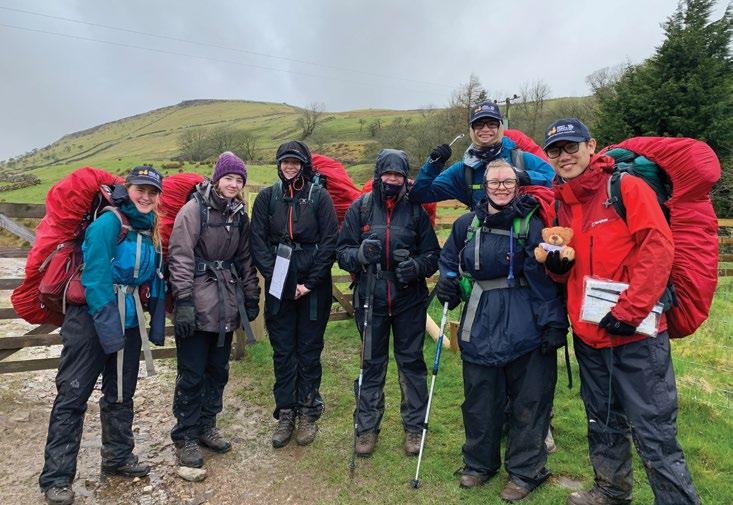
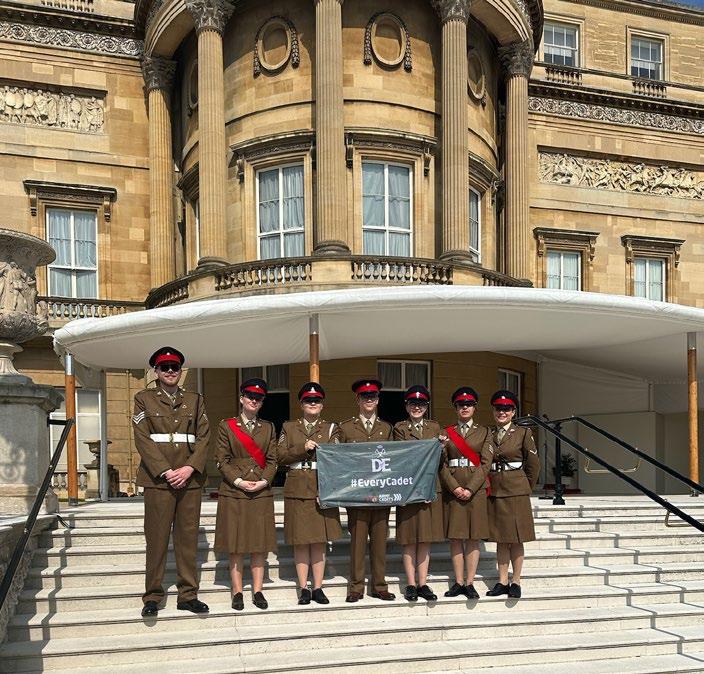
GO FURTHER
Click here or scan the QR code to watch a video about how to gain DofE Awards within the Army Cadets.
A Royal day out
His Royal Highness The Duke of Edinburgh welcomed 8,000 DofE Gold Award holders to Buckingham Palace Garden in May. Among the guests of honour were around 70 cadets, CFAVs and ex cadets who had successfully gained their DofE Gold Award.
National DofE Advisor Lt Col Dan Tebay said: 'We're delighted that so many cadets, ex cadets and CFAVs were able to join us at Buckingham Palace to celebrate achieving their Duke of Edinburgh's Gold Award!
'It's the pinnacle of a cadet's achievements, and represents years of commitment and dedication to a broad range of activities. We hope that these young people had a fantastic day and have made memories to last a lifetime.'
Some of the DofE Gold Award recipients outside Buckingham Palace
EXPEDITIONS 37 Summer 2024

Navigation know-how
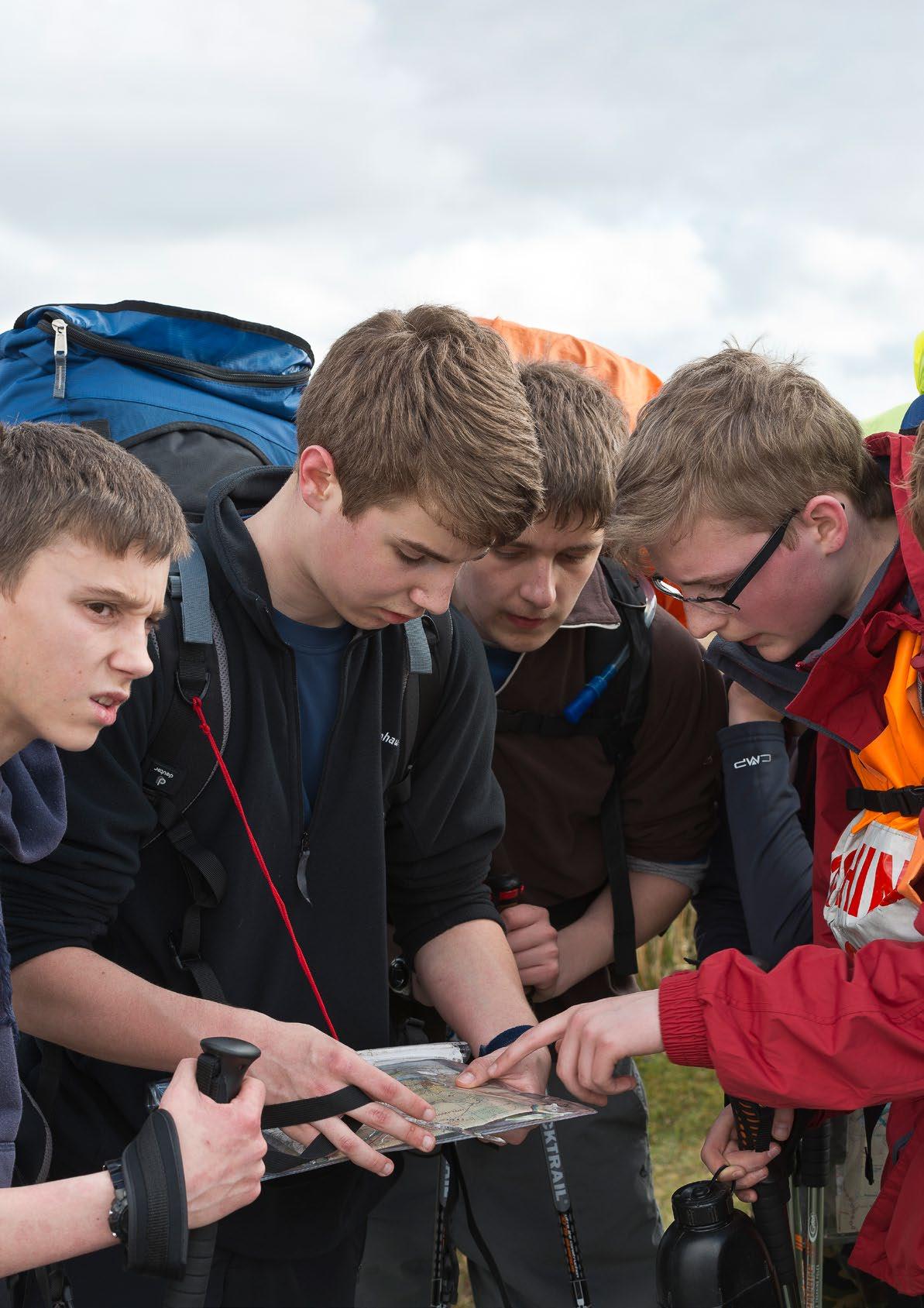
During expedition season, navigation skills are put to the test in real-life situations. Andrew Lester, HQ Cadet Branch Adventurous Training & CCAT Lead shares four map-reading skills every cadet should have under their (rucksack) belt.
Image:Major Paul Bunce
38
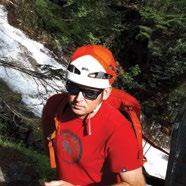
Andrew's
Navigation 101
1. Get to grips with grids
Knowing how to pinpoint your exact location using the blue grid lines on an OS map is a key navigational skill and crucial to know if you need to call for help in an emergency.
The vertical blue lines are called ‘eastings’ (they increase in value as you travel east on the map). The horizontal lines are called ‘northings’ (they increase in value as you travel north on the map).
Four-figure reference
A handy way to identify any square on a map is to use a four-figure reference. Grid references are easy when you remember you always have to go along the corridor before you go up the stairs.
To find the number of a square, first use the eastings (go along the corridor) until you come to the bottom left-hand corner of the square you want. Write down this two-figure number.

Pinpoint precision
If you want to pinpoint a more precise location on a map, you need to use a six-figure grid reference. First, find the four-figure grid reference for the square you originally identified, then write it down with a space after each set of numbers, like this: 62_ 33_
‘Go along the corridor before you go up the stairs’
Now imagine this square is divided up into 100 tiny squares with 10 squares along each side. Still remembering to go along the corridor and up the stairs, work out the extra numbers you need and put them into your four-figure grid reference like this: 625 333.
Then use the northings (go up the stairs) until you find the bottom left-hand corner of the square. Put this two-figure number after the first one and you have a four-figure grid reference, for example: 6233.
2. In the distance
It’s important to be able to use the scale at the

40 39 38 37 36 35 34 33 32 31 30 60 61 62 63 64 65 66 67 68 69 70 40 39 38 37 36 35 34 33 32 31 30 Northings (up the stairs) Eastings (along the corridor)
EXPEDITIONS
39 Summer 2024

3. Clue up on contours
Being able to visualise the shape of a landscape by looking at the contour lines of a map is a superb navigation tool to master and one that can be easily developed with practice. It’s especially essential if you’re planning an expedition over mountainous terrain.
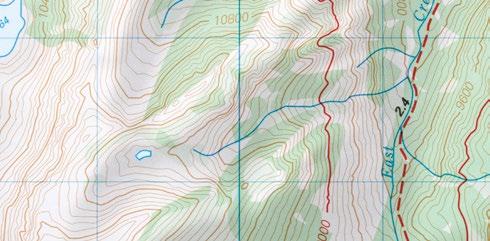
On an OS map, the contour lines (the orange and brown lines) show the height and shape of the landscape. The number on each contour line tells you how high above sea level it is.

Contour lines are the same height all the way along their length, while the height difference between each line is normally 10 metres (your map will tell you the contour interval used). The closer together the contour lines, the steeper the slope of the hill or mountain.

The illustration above shows how a landscape is converted into contour lines on a map. It can be helpful to think of contour lines as high tide lines left by the sea: as the water level drops it leaves a line every 10 metres on the landscape. The marks left behind are the contour lines.
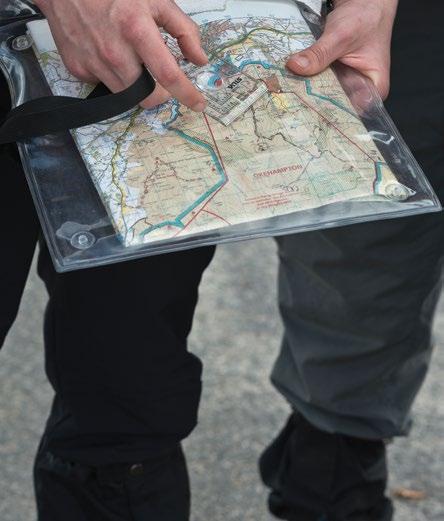
4. Get your bearings
The OS Beginner’s Guide To The Compass provides these steps to using a compass for navigation:
• From your starting point on the map, place the index line on an imaginary line between where you are now and where you want to be, with the red directionof-travel arrow on the baseplate pointing the way. Start by drawing a line from A to B.
• Holding the baseplate in place, rotate the compass housing so the orienting arrow lines up with grid north on the map. The orienting lines should be parallel with the vertical blue grid lines (eastings).
• Your compass does not point to grid north. Magnetic north throughout Great Britain can range from 0º to 5º. The amount of variation changes every year, so check your OS map to work out the current value. Add magnetic variation to your bearing by rotating the compass housing.
• Take your compass off the map. Hold your compass flat at waist height and turn yourself until the red needle meets up with the letter N and is positioned over the orienting arrow. You’re ready to go and the red direction-of-travel arrow will point the way.

40 Army Cadets
Image:Major Paul Bunce
SKILLED UP!
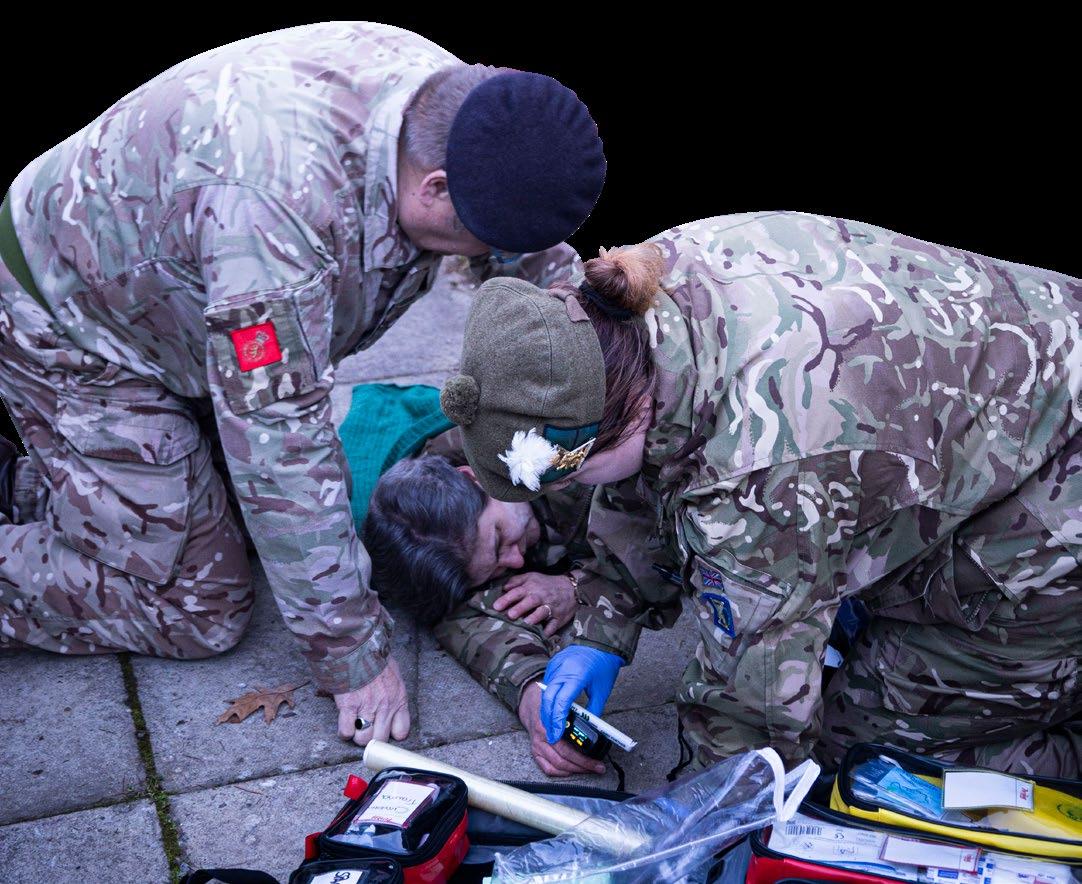
DID YOU KNOW you can achieve a range of formal qualifications in the Army Cadets? with first aid and more
First aid qualifications
• St John Ambulance Youth First Aid (2-star cadets)
• Emergency First Aid at Work (3-star cadets & CFAVs)
• First Aid at Work (4-star cadets & CFAVs)
• First Responder on Scene (medical support officer)
• Emergency First Aid at Work
• First Aid at Work
Cadet Vocational
College (CVC) qualifications
• The Lion Award (outdoor activities, first aid & social action)
• BTEC Level 1 Teamwork & Personal Skills
• BTEC Level 2 Teamwork & Personal Development
DofE Awards
• Gold (costs cadets £35)
• Silver (costs cadets £28)
• Bronze (costs cadets £28)
GO FURTHER
Find out how to take part in these courses and qualifications by talking to your detachment or contingent commander.
Image: Crown copyright
Get
Tips for navigation success
Gilly Moncur MBE, HQ Cadet Branch Training Team, reveals a few ways to ensure you never get lost.
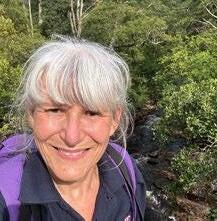
1. You are both right!
It can end in an argument when two people fail to find each other at an agreed six-figure grid reference. Yet it quite often turns out that they were both in the right place. A six-figure grid reference on the map is 100m x 100m on the ground, which is larger than a football pitch.
2. Don't give up looking
Sometimes natural features like a hedge, wood or hill mean you can't see a person, even though they are in the same grid square. Then it only takes one digit out on your grid reference to significantly increase the odds of not finding each other. Unless you've got a very specific rendezvous point, always make sure you've searched the whole grid square area thoroughly – and neighbouring areas –before you give up.
3. Don’t roam without a romer
Use a romer to ensure your grid reference is as accurate as possible. Place the top right corner of the romer as accurately as you can on the map symbol or the place where you want to take the grid reference. Make sure you use

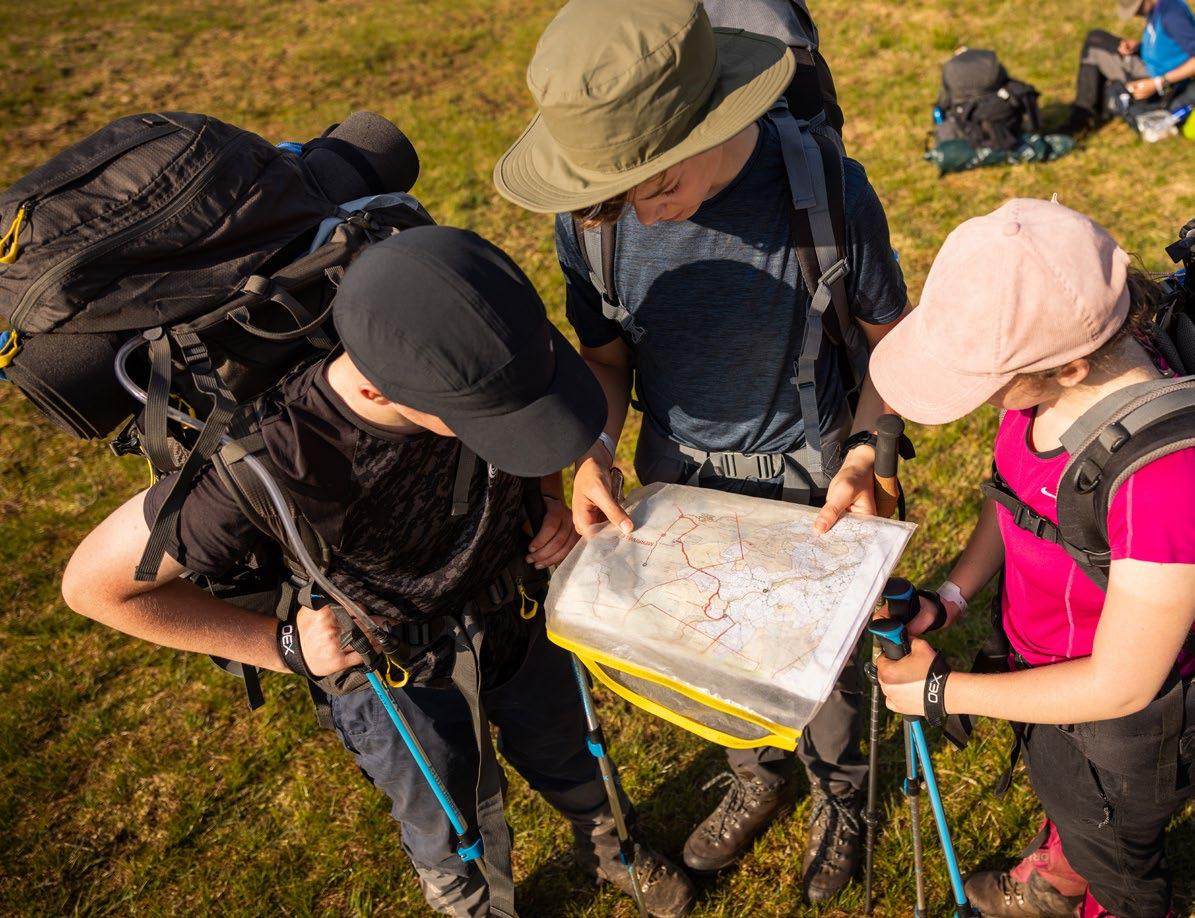
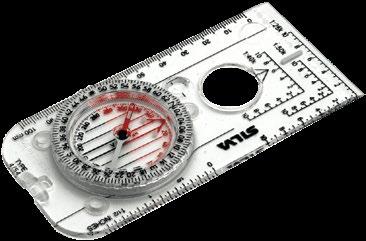
the larger scale on a 1:25,000 map and the smaller one on a 1:50,000. Work out your four-figure grid reference, eg 49_ 23_, then read backwards along the romer to give the third digit and downwards to give the sixth, eg 496230. Never round up with grid references; always go to the lower number.
4. Pylon lines and electricity cables are not the same
It’s easy to go very wrong if you assume a pylon line marked on a map is the electricity wire you’ve been following. Pylon lines have heavy cables strung from large steel pylons – rather than wires from wooden poles. Generally, electricity lines are not marked on maps. Be aware that when electricity transmission lines do appear on a 1:25,000 map a dot is used instead of the square used for a pylon. Note that the symbols for pylon lines on OS 1:50,000 and 1:25,000 maps are different.
 Romer
Compass
Romer
Compass
42 Army Cadets


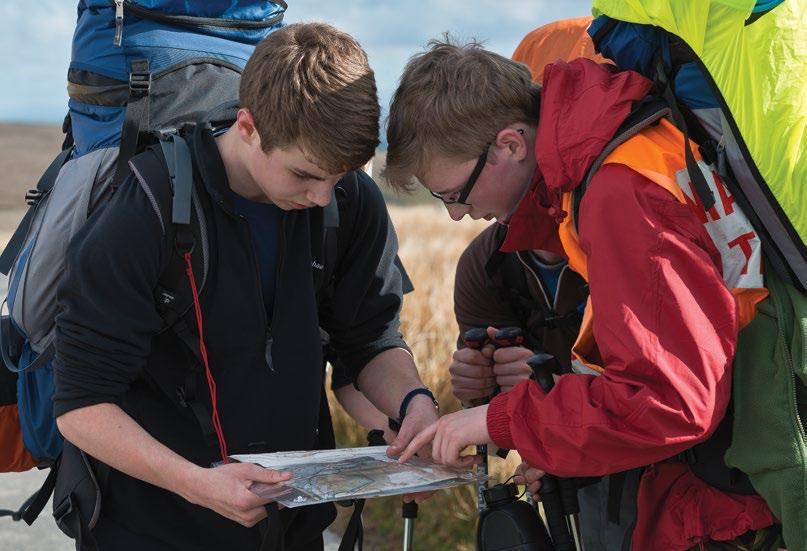

7. Never fabricate clues
Ignoring clues that don’t fit with the map is something our brains like to do because we hate being wrong. Resist the temptation! Use the clues on the ground to build an accurate picture of where you are on the map.
5. Know the difference between uphill and downhill
Sometimes, when you look at a map, it’s hard to know which are valleys and which are hills. One easy way to help with this is to know that on OS maps the contour numbers always point uphill.
6. Be ace at keeping pace
There are several ways to keep track of how much ground you’ve covered. First, work out how many paces on average it takes you to cover 100m. Then start with your hand in a fist and, for every 100m, open a finger. When you reach 500m, start closing them again.

You could also find five small stones and transfer them from one hand to another – and back again if the distance is over 500m. Alternatively, make a counter using five large beads on a string. You can buy these ready-made with clips so you can fix one to your rucksack.
8. Be a living legend when it comes to legends
It’s a good idea to visit the Ordnance Survey website, print off complete legends for 1:50,000 and 1:25,000 maps and keep them somewhere safe, such as in your map case. There is nothing more frustrating than finding that the map you are using doesn’t have a complete legend.

9. Magnetic north is on the move
'Mag to grid, get rid' has gone – but not forever. The simple mnemonic used to help us remember how to make the correct adjustment after either taking a bearing using a magnetic compass or taking a grid bearing from a map. However, magnetic north moves and, at the moment, is shifting from being to the west of grid north to the east. The variation is currently so small that we can ignore the grid magnetic variation but, in a few years, it will grow again and we'll need to think of a new formula.
EXPEDITIONS
Image: Kate Knight
Image:Major Paul Bunce
43 Summer 2024
Take the test First aid on exped
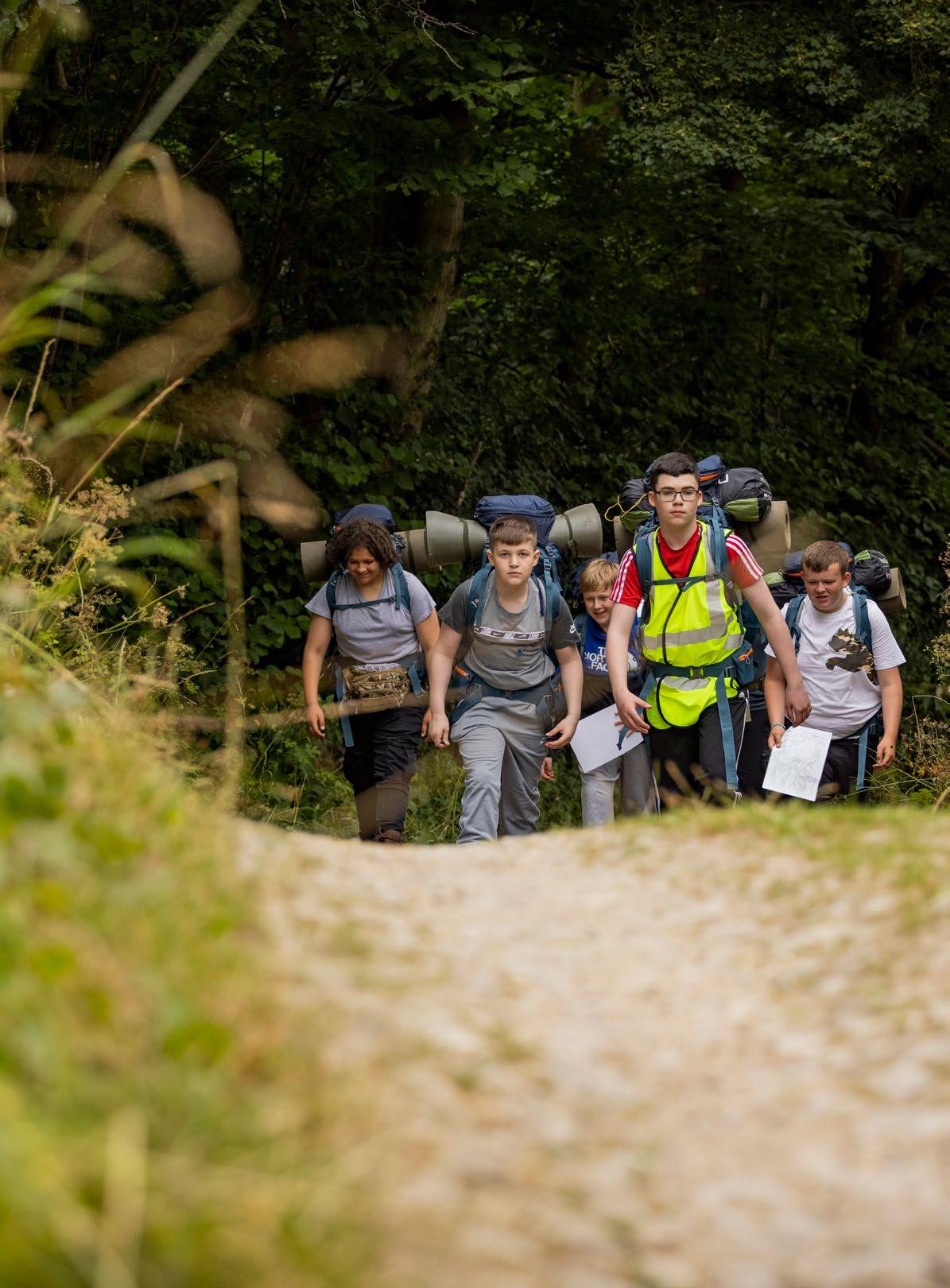
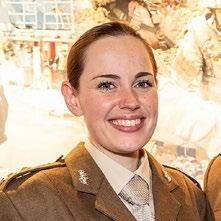
Capt Samantha McEndoo, Medical Support Officer of Royal County of Berkshire ACF, reveals why first aid skills are crucial on exped. Then take the test for a chance to win a Fuel the Adventure jerrycan battery charger.
44 Army Cadets

Capt Samantha McEndoo knows just how crucial it is to be ready to administer first aid while out on expedition. She cites an incident in the Lake District when, due to rapidly deteriorating weather, her team made their way off the hills. During their descent they noticed a team member had developed the early symptoms of hypothermia.
‘We worked effectively as a team to deploy an emergency shelter, remove wet clothing and provide the casualty with warm and dry clothing,’ she says. ‘Once the casualty recovered and was okay, the group was able to proceed to the pickup point.’
Incidents like this demonstrate the importance of having the correct knowledge, team spirit and confidence to carry out first aid when needed.
‘Expeditions tend to take place in challenging environments where access to medical support is not immediately at hand,’ says Samantha. ‘The group might have to use their knowledge and skills to treat a casualty promptly to prevent them from worsening until further help arrives.’
Risk factors
Risk factors include the climate (which has the potential to lead to hot or cold climatic injuries), terrain (which could lead to falls, sprains or other bone, muscle or joint injuries), and flora and fauna (which might result in bites or stings).
Making sure you and your team are prepared with the correct equipment and first aid kit can help prevent or treat such injuries.
‘Your physical preparation could involve taking part in additional training expeditions and practising carrying the equipment and a weighted bergen,’ says Samantha.
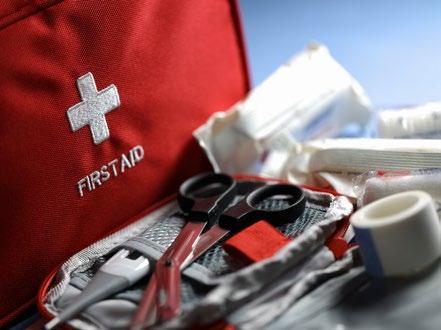
Once the expedition is underway, she recommends taking good care of equipment and keeping kit warm and dry.
‘Feet are an essential tool on expedition so they need to be cared for with good hygiene,’ she says. ‘It’s important to identify and treat hot spots or blisters early.
‘Wet boots or feet are another risk, so check them at the end of each day. Clean and dry your feet and make sure your boots are ready for the next walk. Spare footwear is essential when not walking and could be something like a pair of Crocs, which are lightweight to carry.’
Samantha also stresses the importance of planning ahead to make sure you and your team always have adequate hydration and nutrition throughout the expedition.
‘Meal plans need to be developed prior to the expedition, ensuring calories and energy content are suitable for the activity and its duration. It’s also important to know the signs of dehydration and to carry enough water to remain hydrated.’
EXPEDITIONS 45 Summer 2024
Image: Kate Knight

Know your stuff
Having good knowledge of the signs and symptoms of various injuries and illnesses – and how to treat them – is vital for cadets taking part in expeditions.
‘It’s important to know the early-stage symptoms of climatic injuries, as early identification allows for timely and effective treatment to be delivered,’ says Samantha.
‘With bone, muscle and joint injuries you need to know how to make the casualty comfortable and be able to formulate a plan to access further help and potential extraction. This requires improvisation skills, teamwork and a calm approach.’
Not all injuries are clearly visible, so Samantha recommends checking in with your teammates from time to time throughout an expedition.
‘An injury such as a sprained ankle presents with an obvious cause and symptoms. A greater concern would be something like a climatic injury where symptoms can develop slowly and can be missed in the early stages,’ says Samantha.
‘Knowing and communicating with your teammates and using the buddy system to check in with each other may help identify any changes a team member might be exhibiting and provide an early opportunity to deliver first aid.’
‘Symptoms can develop slowly and can be missed in the early stages’
Unusual considerations
The skills needed to identify and treat illnesses and injuries on expedition are exactly the same as in other settings. However, there are other factors to be taken into consideration.
'These include access to resources, distance from main roads for evacuation, communication methods for requesting assistance, and navigation skills to identify the exact location of the incident for the emergency services,’ says Samantha.
Practising first aid skills as much as possible ensures you are likely to feel equipped to use them if the need arises.
‘When leading any expedition, I always share knowledge related to potential risks and first aid, in the hope that it instils the correct mindset in cadets and gives them confidence to deal with any situation they might encounter.’
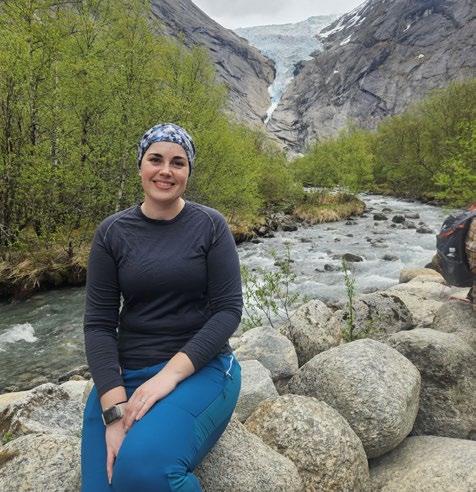

Capt Samantha McEndoo was recently given the prestigious honour of being appointed a Member of the Order of St John in recognition of her services to young people and first aid training within the ACF.
‘My appointment was announced in The London Gazette in February 2024 and I’m currently awaiting the invitation to receive my medal,’ says Samantha. ‘I am honoured and humbled that my work and commitment has been recognised and excited to meet a member of the Royal Family who will present the award.'
Samantha, who is a district nurse by profession, has taken an interest in first aid since she was a child.
‘My dad was a resuscitation officer and I remember doing CPR skills at a very early age. When I joined the Army Cadets as a cadet, I was able to complete the St John Ambulance Youth First Aid Programme. This passion and interest continued as I commenced my nursing training.’
She started out by gaining recognised first aid and teaching qualifications within the Army Cadets, allowing her to deliver First Aid at Work courses across her county. She then took the role of county first aid training officer, supporting and advising on first aid training within her county and the southeast region.
‘I continued to develop my skills in advanced first aid and became part of the delivery team teaching this nationally. With the previous roles, qualifications, courses and knowledge gained over the years I have recently been appointed the medical support officer for the county.
‘Being appointed as a Member of the Order of St John is a reflection of the hard work carried out within the Army Cadets to recognise and promote the importance of first aid skills.’

46 Army Cadets
The test
1. Which of the following is NOT a common injury during an expedition?
A. Tick bite
B. Heat exhaustion
C. Chemical burn


2. If at the end of the first day of an expedition you have developed a blister on your heel, should you ...
A. Burst it to dispel all the fluid so you can wash it and apply a sterile dressing
B. Remain in your boots so your blister has time to heal and the skin toughens up for the next day

C. Wash skin around the blister with clean water and gently pat dry with a sterile gauze pad or clean cloth
3. Which of these is NOT a climatic injury?
A. Sunburn
B. Head injury
C. Hypothermia
4. Which of these is an early sign of hypothermia?
A. Shivering, and cold and pale dry skin
B. Rapid heartbeat and a hot and sweaty forehead
C. Cramp in the lower legs
5. Which of these would you NOT give someone with hypothermia?
A. Hot water bottle
B. Warm and dry clothing
C. Warm drink

WIN
... a Fuel the Adventure jerrycan battery charger
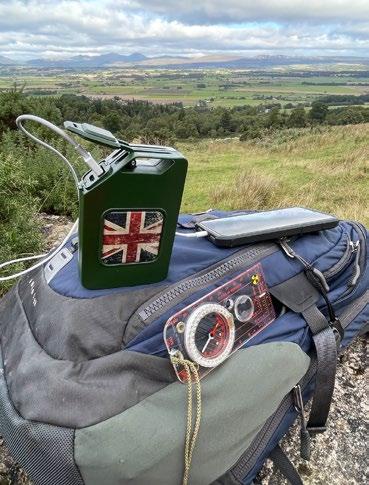
Thanks to the team at Fuel the Adventure, we are delighted to be giving away two cool jerrycan battery chargers. Perfect for your outdoor adventures or for everyday life, the Fuel the Adventure Power Banks can charge your smart phone up to three times. This rugged jerrycan will charge any device that uses a USB charging cable. By completing our quiz and answering all of the questions correctly, you may be one of two lucky people to receive one of the battery chargers.
Click here or scan the QR code to be in with a chance of winning.

Competition closes on 2 September at 10am
EXPEDITIONS
Tickona fing e r
47 Summer 2024
Jump on the
BANDWAGON
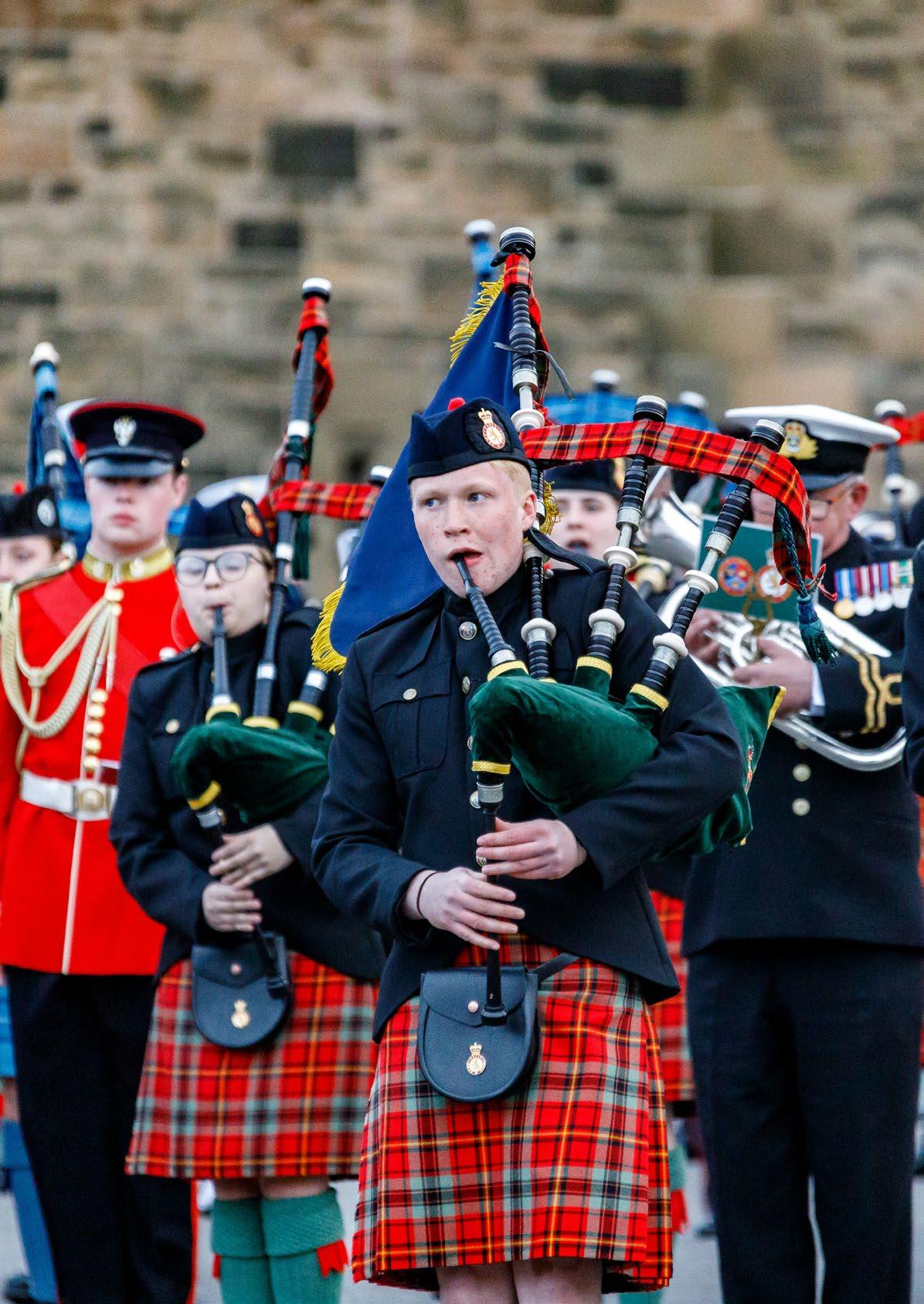
‘The opportunities are nothing short of incredible’
Cadets performed at the Beating Retreat at Edinburgh Castle, 2024
48

Taking up an instrument is a superb way to learn something new while serving your detachment and community.
Callum Moffat, HQ Cadet Branch Pipes and Drums Lead explains why it’s an opportunity not to be missed.
Have you ever watched the stirring spectacle of traditional military music being performed at a remembrance event or on parade at annual camp and wished you could play an instrument? The good news is that all cadets are welcome to take up an instrument and work towards becoming part of this impressive pageantry. Not only will you get the pleasure of making music, but you’ll also develop a unique skill set and gain new friends.
‘Taking up an instrument helps increase concentration, discipline and coordination as well as helping you to grow in a social environment and boosting your confidence,’ says Callum. ‘These are all sought-after skills by future employers.’
Amazing opportunities
Army Cadets musicians take pride in playing in their local communities, especially on Remembrance Sunday, as well as leading parades at annual camps and other events – including some international occasions.
‘The opportunities the Army Cadets offers through music are nothing short of incredible,’ says Callum. ‘Training weekends and camps allow cadets from all over the country to come together, often making friends for life.
‘Your musical journey could include opportunities such as performing for royalty and oversees events – previously, cadets have travelled to countries like China, Switzerland and Gibraltar.’
Taking the first step
If you’re worried because you don’t have a musical background, you needn’t be nervous. All you need is the hunger to learn a new skill.
‘Feeling nervous is natural when stepping into a new environment,’ says Callum. ‘A skill you will pick up when learning your instrument is confidence. Everyone on camp was a beginner at one time in their musical career so try your best to improve every day and, once you feel ready, encourage the new intake of beginners and let them know it does get easier.’
TRY SOMETHING NEW
Image: Cameron Goodsir McGuire –Black Watch ACF 49 Summer 2024
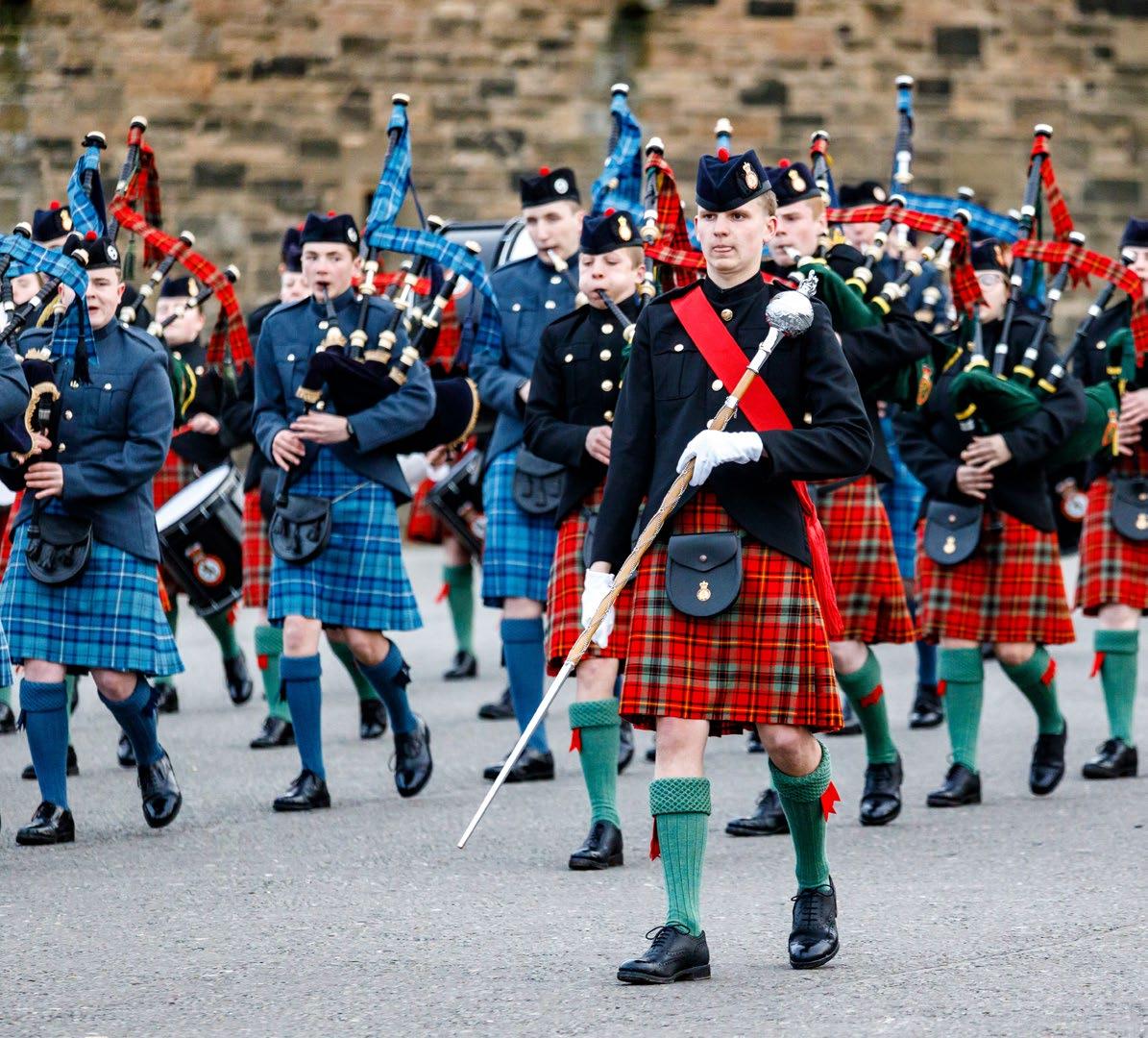
Choice of instruments
The spectrum of musical instruments you can choose from is impressive. Bands revolve around brass instruments (trumpets, cornets, tubas) woodwind (flutes, saxophones, clarinets) and percussion. Corps of Drums is made up of drums, bugles and flutes. Pipes and Drums consists of bagpipes and Highland drums, while at camp contemporary music is played by cadets on keyboards and guitars.
‘Pipes and Drums is primarily practised in Scotland but is gaining a fair bit of interest in other parts of the UK,’ says Callum. ‘A good way of deciding which instrument to play is to try them or to listen and see which really excites you. Remember that music is a difficult skill to learn, so perseverance is key!’
Tailored training
Once you start playing an instrument, you can work towards Music 2-, 3- and 4-star awards.
‘Primarily, the focus is on star levels and these help to promote music within detachments,’ says Callum. ‘Pipes and Drums also offers external qualifications which are accredited by the Scottish Qualifications Authority.’
Attending music camps is a way to make new friends and further develop your musical skills – and is recognised in
the residential section of the DofE Gold Award. You can also use your musical abilities to pass the Skills section of Bronze, Silver and Gold Awards – and training at camps is tailored to your ability.
‘Music camps tend to take place in the Easter and October holidays,’ says Callum. ‘Pipes and Drums also runs national training weekends in Scotland, and counties and battalions often organise their own training events. Anyone who has an interest in learning an instrument can attend, unless it’s stated otherwise in the course requirements.’
Seize the day
You never know where taking up an instrument could lead you. Many military personnel who perform at events like the Changing of the Guard at Buckingham Palace and in prestigious concert halls across the world started their musical careers in the Army Cadets. Others who excel at their instrument have gone on to enjoy careers in the music industry.
‘The most rewarding part of my job is watching kids grow as musicians and gain qualifications while doing so,’ says Callum. ‘As they improve, the opportunities increase and they leave with great memories of their Army Cadets Music experience.’
Image: Cameron Goodsir McGuire –Black Watch ACF
50 Army Cadets
Cadets performed at the Beating Retreat at Edinburgh Castle, 2024

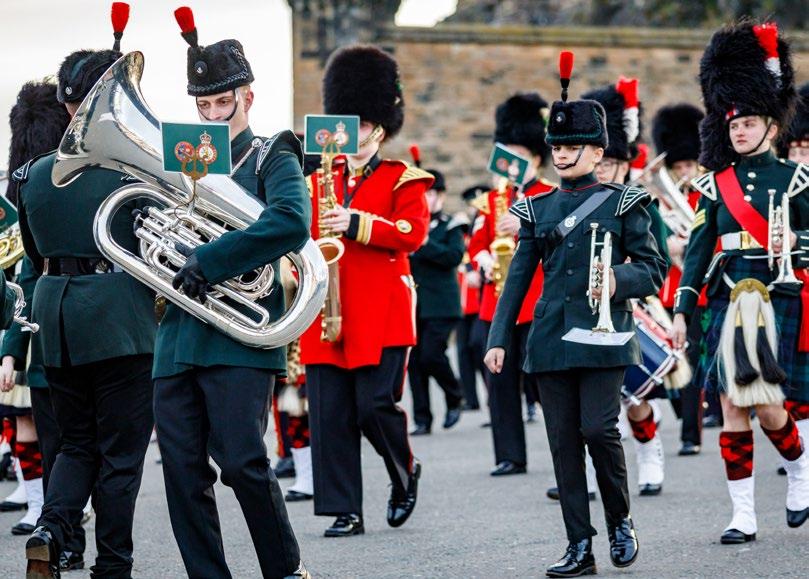
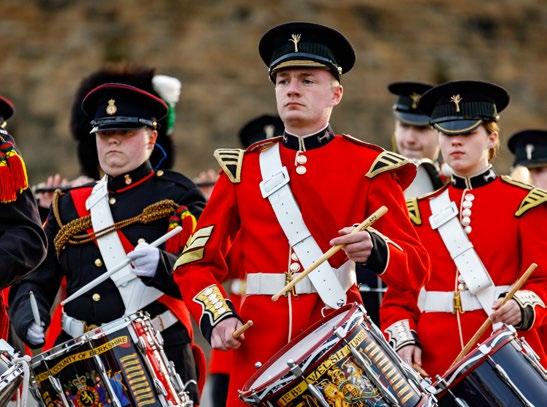
Beating Retreat 2024
Musical cadets and CFAVs had the great privilege of being involved in the Beating Retreat 2024, which took place on the esplanade of Edinburgh Castle on April 20. Around 100 cadets and 30 CFAVs were on parade at the military music spectacular.
The annual Army Cadet Charitable Trust (ACCT UK) ceremony sees cadets and CFAVs delight local and international spectators with their mix of traditional Scottish tunes, fanfares and contemporary numbers.
‘It’s around an hour’s musical performance, with each discipline playing by themselves and then joining together for a grand finale,’ says Callum. ‘The event is a showcase of what Army Cadets Music is all about. It provides an opportunity to perform the music rehearsed at camp on a historical stage.’
GO FURTHER
If you are interested in taking up an instrument, enquire at your detachment and don’t forget to look on social media to see if there are any recruitment drives happening in your area.
Click here or scan the QR code to find about Pipes and Drums qualifications which are credited by the Scottish Qualifications Authority.
Click here or scan the QR code to watch the Beating Retreat 2024.
TRY SOMETHING NEW 51 Summer 2024
musical forte Anja’s

How Army Cadets Music helped Cdt CSjt Anja England take her musical aspirations next-level.
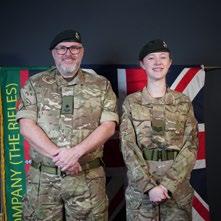
Cdt CSjt Anja England of Wigman Road Detachment, Nottinghamshire ACF, is thrilled to be using the musical and teaching skills she developed in the Army Cadets in her new exciting role as an intern teaching assistant at the Music Learning Collective (MLC).
Anja, 17, teaches students up to Year 6 and delivers personalised one-to-one and small-group tuition. She also helps to create resources for MLC’s online learning materials.
Multi-instrumentalist Anja first developed a love for music at the age of six, when her grandparents took her to her first piano lesson. She also plays the guitar, bugle and clarinet, as well as different types of drum.
Anja England and Paul Hose
52 Army Cadets

‘TRY NOT TO COMPARE YOURSELF TO OTHERS’

Drum and bugle
Her love of music further developed within the Army Cadets. Anja completed 4-star music on the military snare drum and took up the bugle as her second instrument.
‘It gave me the ability to read and sight-read different drum scores and notations, which is a skill not many people have,’ she says.
Anja also gained many other transferable skills within the Army Cadets, including confidence, determination, resilience, patience and commitment.
‘I feel as though I have the solid foundations I need to be able to take on any challenges at work,’ she says.
Teaching techniques
Anja also attended the Junior Cadet Instructor Cadre (JCIC), which helped equip her for her current teaching role.
‘It provided me with the knowledge and confidence to ensure my lessons are inclusive, fun and safe,’ she says.
‘Being able to apply and practise teaching techniques at detachment nights boosted my confidence and gave me experience in teaching groups of people.’
Give it a go
Anja encourages other cadets to take up an instrument, with a reminder that it takes time and practice to improve.
‘Many people don’t have a go out of fear of embarrassment or failure, but the beauty of learning an instrument is that you cannot fail. Each time you play your instrument you get better and develop as a musician.
‘The most important thing is to have fun. Try not to compare yourself to others as everyone has a different learning journey. Learn to love and appreciate everyone’s abilities and support each other.’
Mad about music
There isn’t a day when music isn’t a part of Anja’s life.
‘Music isn’t just sounds you hear or something you use to pass the time; it brings new opportunities, friendships and experiences.
‘If I hadn’t joined Army Cadets Music, I wouldn’t be able to get my job at MLC or be exposed to the world of music teaching. Music has been the catalyst for many of the most important opportunities of my life so far.’
Start small
CEO of MLC Paul Hose, who is also Detachment Commander at Wigman Road Detachment, says Anja’s commitment to Army Cadets Music, as well as her resilience, timekeeping, demeanour and respect for self and others, played an important role in her recruitment at MLC. He encourages other cadets to learn teaching and instructing skills.
‘Sharing experiences and knowledge is the lifeblood of the Army Cadets,’ he says. ‘Have a go and start small. Perhaps begin by delivering an element of a lesson rather than all of it. Ensure that you know the subject matter and remember: mood is contagious.
‘If you enjoy it, your cadets and students will enjoy it. Be kind to yourself when reflecting on your delivery – no one is perfect.’
Amazing opportunities
Paul, who has performed on television and in arena concerts and touring shows around the world, encourages cadets to get involved.
‘Music is the gift that keeps on giving. It helps us express ourselves and it can lead to opportunities that are far reaching,’ says Paul..
‘Anja, for instance, is excited to be visiting MLC’s sister school in Italy in November. It’s an opportunity that wouldn’t be available without her ability to both play and teach music.
‘Music also helps us with memory, problem solving, confidence, self-reflection, critical thinking and imagination – all valuable and transferable life skills. Above all, though, it is great fun!’
Anja agrees and adds: ‘I couldn’t have got to where I am today without the support and knowledge of all the adults who help to run and teach Army Cadets Music.’
TRY SOMETHING NEW
53 Summer 2024
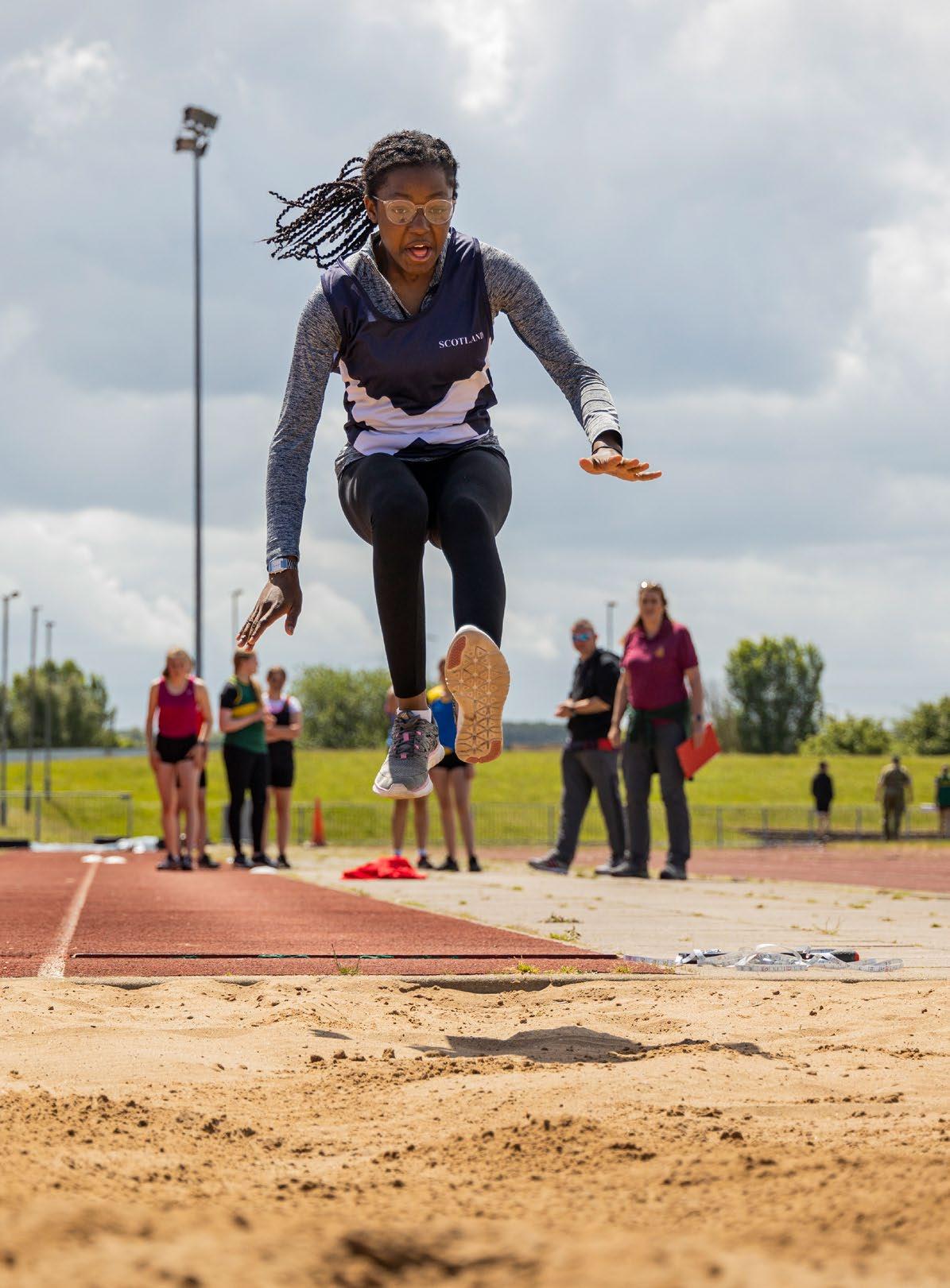
Good sports
Playing competitive sport within the Army Cadets offers exciting opportunities. We get the details and meet cadets and CFAVs involved in Army Cadets Sport.
Cadets compete in National Athletics Image: Kate Knight
54 Army Cadets
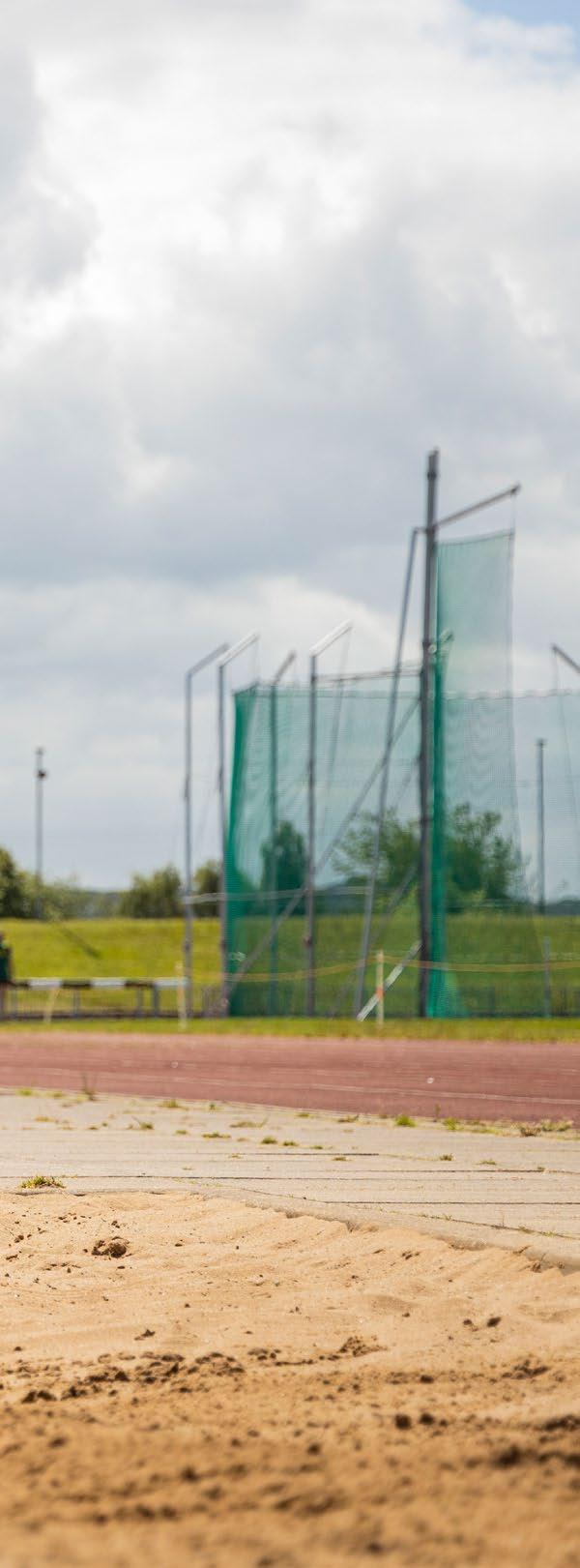

Terry Hayter, HQ Cadet
Branch Sports and Physical Development
Lead, tells us about competitive sport in the Army Cadets.
Which sports are played competitively in the Army Cadets?
The choice of sports varies from county to county, but may include football, rugby, athletics (individual sprints and team relay races, javelin, discus, shotput, long jump and high jump), archery, cross-country and orienteering; the latter two are closely aligned and often share events. A group of cadets or a CFAV could, in theory, introduce a new sport, but this would be subject to several factors (eg logistics, demand and funding) that would need to be agreed with their detachment commander and county commandant.
Who is it open to?
The calibre of our sports teams is phenomenal, but we’re not elitist. My approach to selecting teams and organising events is that each one needs to be safe and fair. There are, of course, only so many participants we can select, but sport in the Army Cadets is open to all, and there’s fantastic camaraderie on and off the pitch. I’d encourage cadets and CFAVs to explore all the sport-related opportunities on offer, including important off-pitch supporting roles such as coaching.
TRY SOMETHING NEW
55 Summer 2024
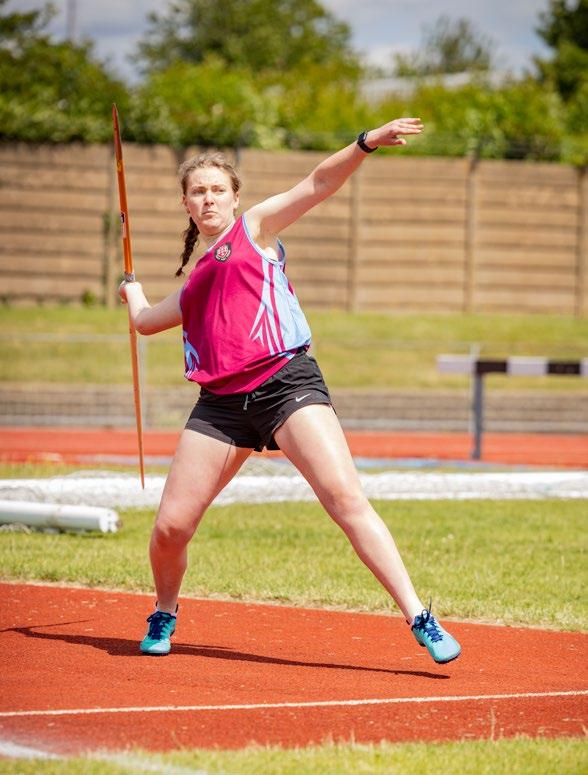
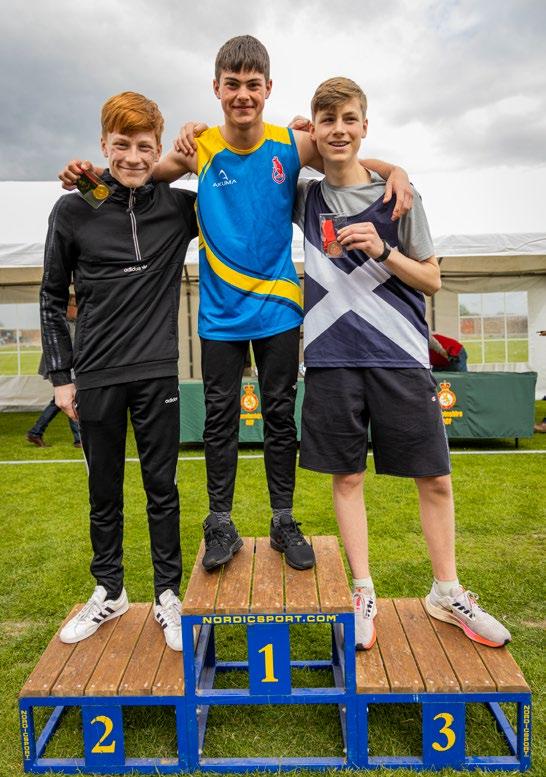
How can a cadet join a team?
The best place for a cadet to start is with their detachment commander. Some counties run county competitions and selection events for a sport, which would be the entry point for cadets wanting to get involved. Other counties don’t run events, but a cadet could still be put forward for a regional event, which is where the national teams are selected.
Why should cadets get involved?
If you love sport, competing is a great way to meet like-minded people and play at a high level, with all the buzz that goes with that. The national events, which often take place at Altcar Training Camp near Liverpool, are prestigious social and sporting highlights of the Army Cadets calendar.
What opportunities are there?
We’re always looking to support cadets to take their sport skills, experience and passion to the next level. In the past, for example, the national football teams have visited Kenya, and this year we should have a team going to Portugal. We’ve also had a team represent the Army Cadets in a match against a team from the Royal Navy cadet organisation, which took place during half-time in a Army v Navy match at Twickenham in front of 75,000 people.
Keeping Active
Keeping Active is an integral part of the Army Cadets training syllabus. It provides a framework for physical activity, which is undertaken at detachment level. This is separate from competitive sports offered at county, regional and national levels. The activities and learnings within the Keeping Active syllabus aim to improve the strength, agility and endurance of cadets, to support the physical and psychological demands of cadet life, and to encourage a broader healthy lifestyle.
For more information about Keeping Active, as well as the Level 2 Qualification in Community Sports Leadership and playing a competitive sport, speak to your commander.
Cadets compete in National Athletics
Image: Kate Knight
56 Army Cadets
Image: Kate Knight
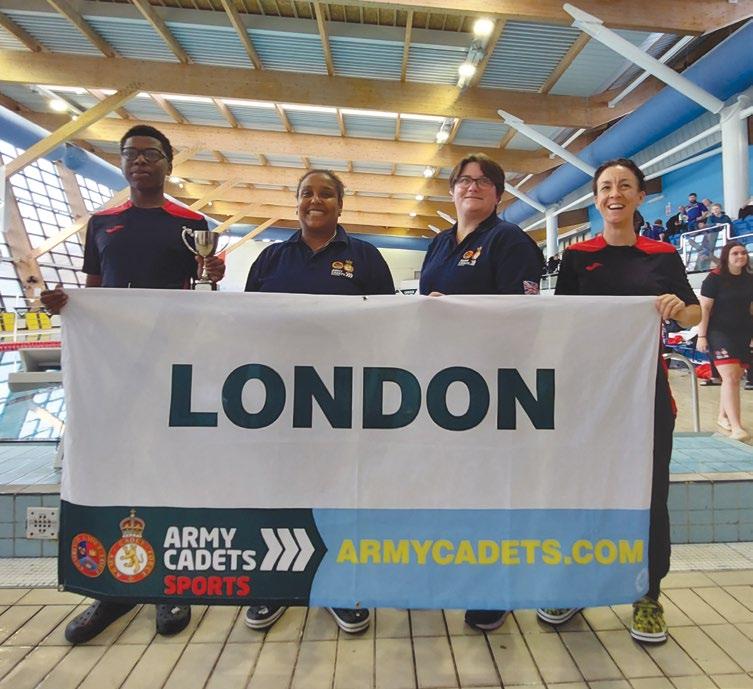
Cdt LCpl Josh-Moses Amasse, Detachment 71, 7 Company, Greater London South East ACF, age 15, joined the Army Cadets in 2020. He shares his experience of sports leadership and competitive sport.
How did you get involved?
Initially, it was through the Keeping Active training in my detachment. The CFAVs made sport fun and that got me interested in taking it further. At that time, Cadets had competitive swim teams. At the team trials, I helped and encouraged the younger age groups before my own trial. Although I didn’t make it onto the team, I enjoyed it so much that I asked my detachment commander if I could help the team to achieve their best and was offered the role of team captain. We won the Junior Boys’ swimming event at the Nationals in 2023, and that weekend I also got promoted to lance corporal.
How did you develop your sports leadership skills?
Once I’d completed the Keeping Active syllabus, I wanted to stay involved in sport, so I took the Level 2 Qualification in Community Sports Leadership. The course was great: the teachers were really engaging and made the classroom sessions interesting. I met lots of people from elsewhere in London who’ve become friends. I’m one of the first cadets
to be a Sports Ambassador in a trial among cadets in the London area being led by Major Katehis. I’m looking forward to helping to shape and promote sport in the Army Cadets.
What do you enjoy about sports leadership?
I love making sport fun for other cadets. To me, leadership isn’t about shouting at cadets and expecting them to enjoy the experience. Rather, it’s about finding a way to get them to listen to me while they’re having fun. Personally, I enjoy swimming, tennis and track running, and I think these sports have helped my health and fitness. I also love the competitive side: rising to the challenge, the camaraderie, and the atmosphere at big competitions like the Nationals at Liverpool – it’s an amazing weekend away!
What would you say to cadets considering sports?
Even if you don’t consider yourself sporty, I’d encourage you to give sport a go. You never know, you might end up having a talent for the sport, but, even if you don’t, you’ll learn new skills, meet new people, build your fitness, develop qualities like confidence, leadership and teamwork –and you’ll have fun!
TRY SOMETHING NEW
From left: Cdt LCpl Josh-Moses Amasse; Lt Col Konstantinious, GLSE Sector; Lt Coates, GLSE Sector; and Maj Katehis at National Swimming, November 2023, at Altcar
57 Summer 2024
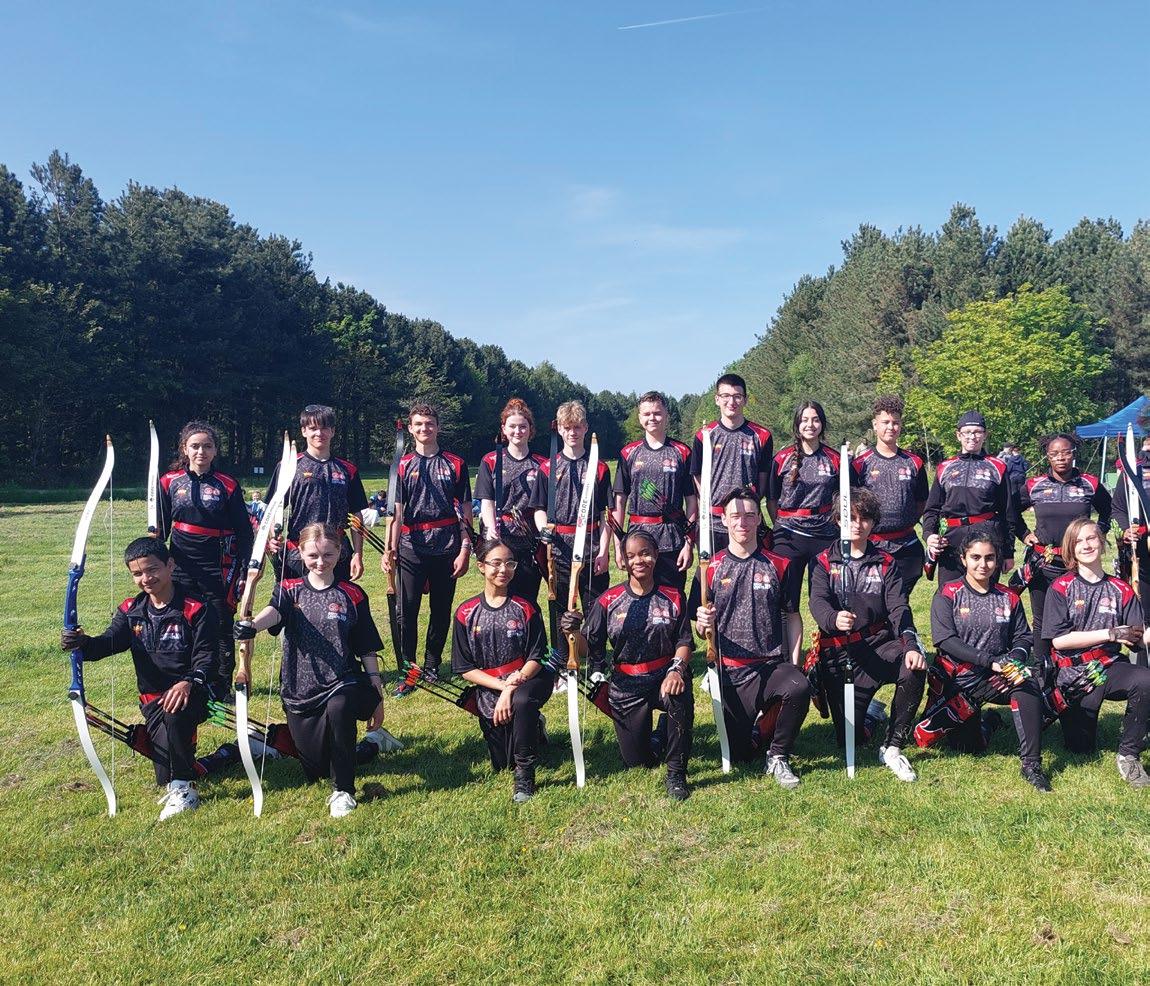
Maria Katehis RPoC, London Sports, became a CFAV in 2014. She reveals why she wanted to be involved in sport.
How inclusive is sport in the Army Cadets?
The variety of sports in the Army Cadets, from team events to individual sports, provides choice. Archery, for example, can be enjoyed by virtually anyone, anywhere; you don’t need space or the ability to run around a huge grass pitch. There are age groups for sports teams. You’ll often see older cadets supporting younger ones, who grow up and do the same for the next group of young cadets.
Do CFAVs need to be sporty to get involved?
If you have an interest or experience in a sport that’s great, but there are lots of ways to get involved, including organising, administration and logistics as well as coaching, refereeing and transporting cadets to events. Army Cadets also offers development courses, through the Army and national governing bodies, such as referee courses with FIFA and the RFU.
Image: Kate Knight
London District National Archery Team at National Archery at Altcar; National Athletics’ podium
58 Army Cadets
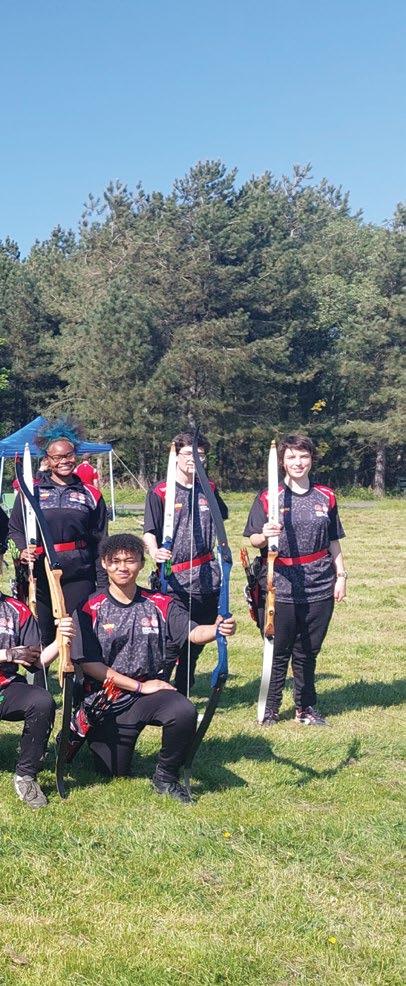
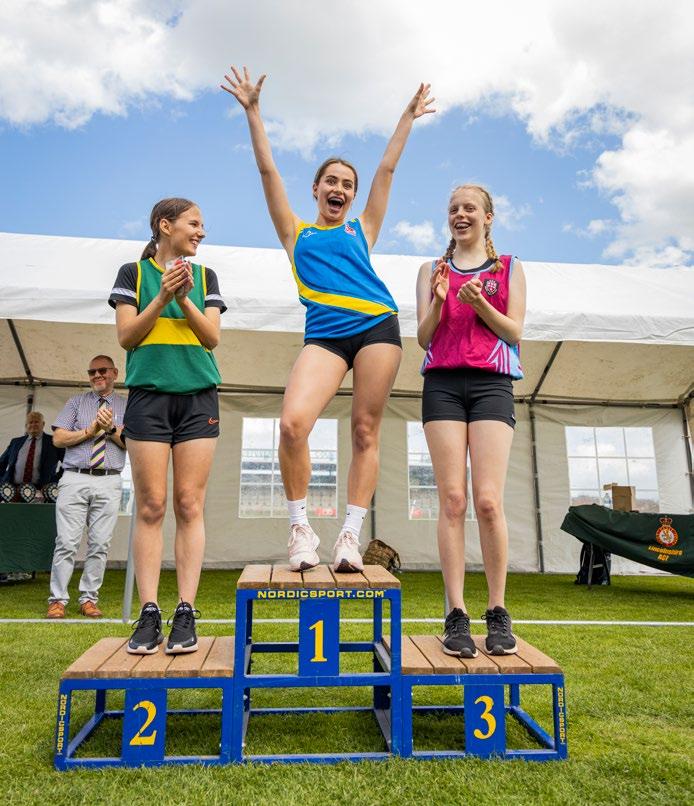
How much commitment is required of CFAVs?
CFAVs can do as much or as little as they want, and most of the more formal roles rotate every three years. There is the potential to spend around six weekends a year at sports training sessions and events, plus the time involved in organising those events, but that’s at the upper end of the commitment. Whatever skills you have and however much time you have available, you will be welcomed.
What do CFAVs get from supporting Army Cadets Sport?
You can’t beat being on a bus with a load of cadets on the way back from a competition: the confidence, the smiles, the team spirit and the experiences they’ve had.
Knowing you helped to make that happen is so rewarding and uplifting. If you’re considering giving it a go, come to the National Championships and see the effect of that event on the cadets. Nothing I say will be as powerful as that experience.
Why is it important for CFAVs to get involved in sport?
Activity is vital for everyone’s physical and mental wellbeing, but it can be hard to set aside time for sport. CFAVs are already involved with the Army Cadets, so sport just becomes an extension to that time, rather than a separate new commitment, which is easier to fit into already-busy lives.
TRY SOMETHING NEW
Image:
59 Summer 2024
Kate Knight
UniversityLIFE of
Off to uni this autumn? Try something new and take the fun, adventure and training of the Army Cadets to a whole new level by joining the University Officers’ Training Corps (UOTC). We talk to two officer cadets about their experiences.
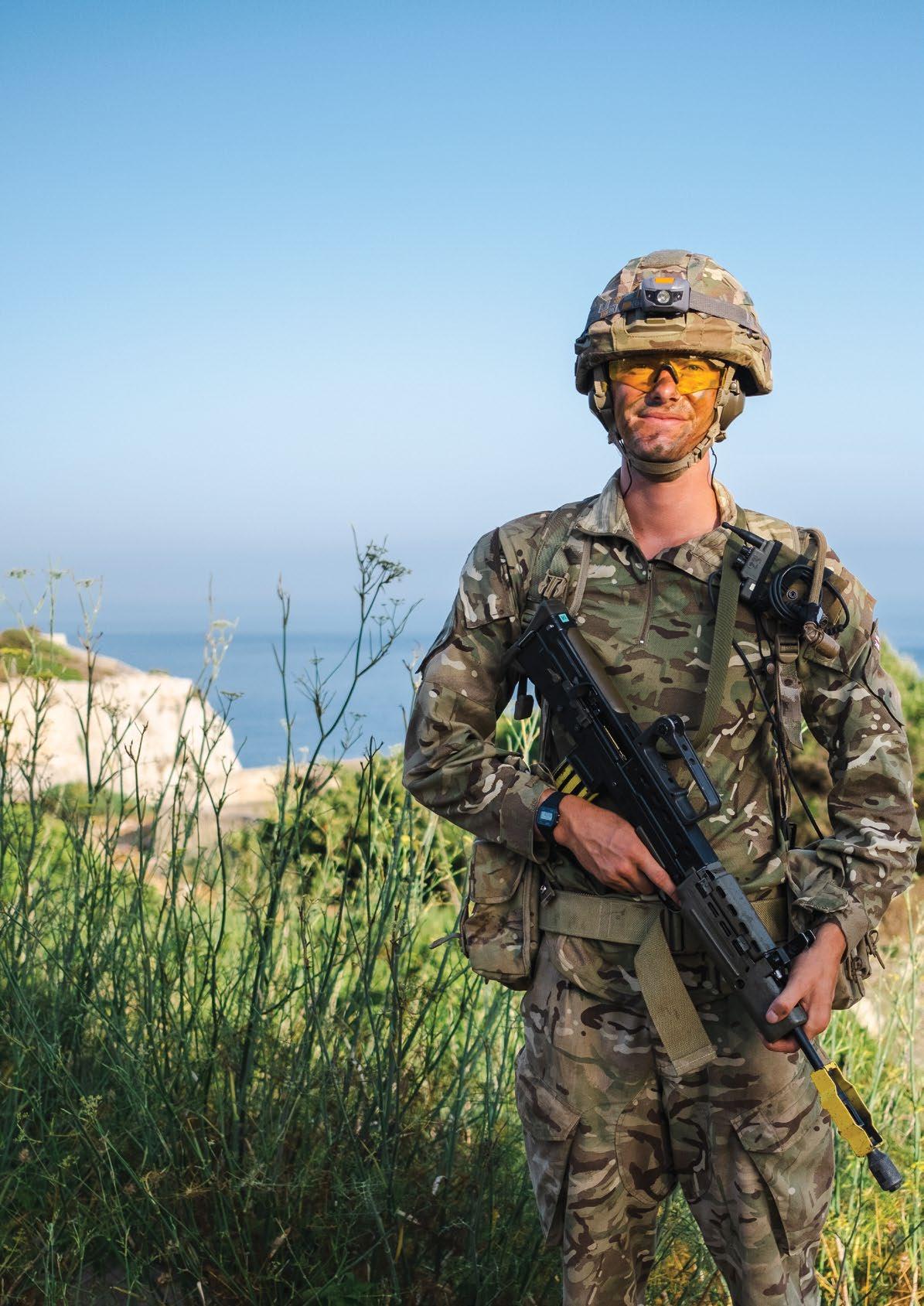
‘The UOTC is a great place to make friends for life, learn new skills, push yourself beyond your limits and have great fun’
Colonel Jacqueline Powell, Deputy Commandant UOTC
OCdt Charlie Foster on exercise in Gibraltar
60

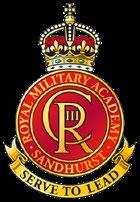
UOTC: the low-down
What is UOTC?
It's similar to a university club but operated by the British Army. A university society with a difference, it provides transferable skills, personal development and adventure.
The UOTC’s aim is to develop the confidence and leadership potential of members via four areas of activity. The first is military training: it runs a portion of the Army Reserve Officer Commissioning course operated by Royal Military Academy Sandhurst (RMAS). The second is adventurous training (AT): outward bound pursuits such as kayaking, skiing, coasteering and mountain climbing. The third area is sports and fitness, and the fourth is social and intellectual development.
UOTCs are government funded and members are paid for the time they spend in the organisation. There's no commitment to join the Army afterwards.
Is the UOTC mostly made up of former cadets?
About a quarter of UOTC members were previously in the Army Cadets or have a connection with the Army through family or friends.
Is it beneficial to have been an Army cadet?
If a person has been a cadet previously, their basic military skills will help them in the UOTC but there is absolutely no pre-military experience required.
How do students join?
Mainly through the website or freshers' fairs. Officer cadets host stands at these fairs where freshers [new students] can learn about the UOTC.
What are students paid?
You won’t get rich by being in the UOTC, but it helps to offset student-living costs. Officer cadets are typically paid £50 each day they train, which rises to £59 in their third year. Students are also paid around £200 as a bounty for attending the annual two-week summer camp – as well as being paid for the days at camp.
What commitment is required?
Students tend to commit for a year at a time. If they don’t like it they can leave at any point. Most people will do an evening each week, and then every other weekend from October to March. The UOTC meetings don’t run during the holidays or exam periods – studies come first.
What if you want to join the Army afterwards?
It’s a great benefit to have done UOTC if you want to join up. That’s not in terms of selection (it won’t get you any preferential treatment with the Army Officer Selection Board) but imagine starting your training at Sandhurst already knowing how to handle a weapon, wear the kit and do drill. It gives those new recruits a lot of confidence.
GO FURTHER
Click here or scan the QR code to get the low-down on the UOTC.
Image: Robert Mangan
TRY SOMETHING NEW
61 Summer 2024
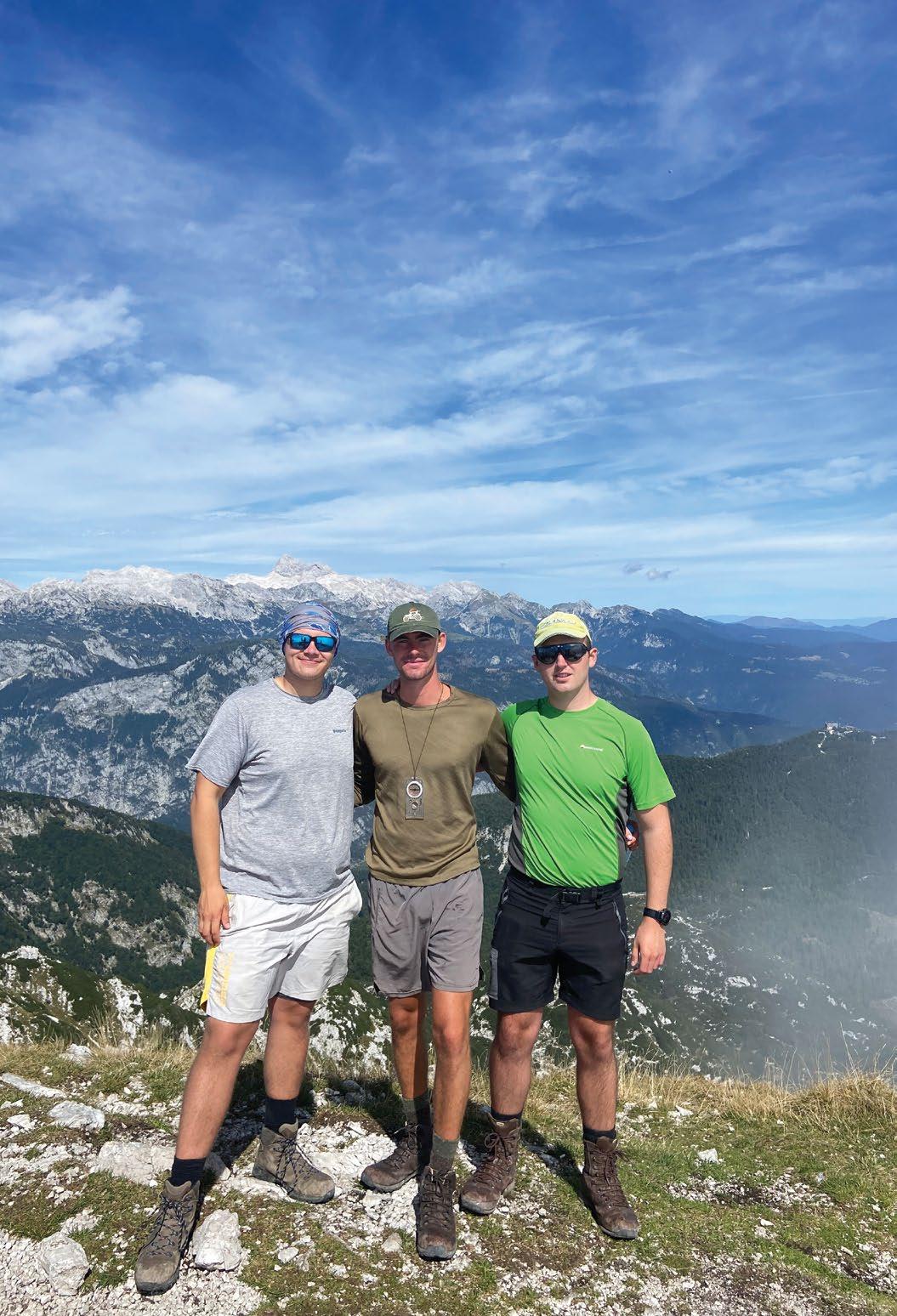
Meet the officer cadet Charlie Foster
OCdt Charlie Foster, 22, joined Northumbrian UOTC in 2020, while studying biology at Newcastle-Upon-Tyne University.
Image: UOTC
Left to right: Dom Hodkinson, Charlie Foster and Francis Smith-Ward hiking in the Julian Alps, Slovenia, in 2022
62
Why did you join the UOTC?
I was in my school’s CCF for three years and became head of its Army section. I loved it – the camps, weapons training, drill, adventurous training, sport –all of it! Being in the CCF got me interested in joining the Army, and when a former student returned to my school to give us a talk on the UOTC, I knew I had to find a uni with a UOTC unit.

Which sports have you done in the UOTC?
I’ve been on two fantastic surf trips to Cornwall –I’d never surfed before and now I’m an avid surfer. I’ve also been on a pair of week-long ski trips with 60 mates in the UOTC and got my Ski Foundation 1 qualification. I’ve been involved with football, mountain biking, darts and other sports. You haven’t got to be good at a sports; you can just play for fun.
To introduce a new sport, you have to get approval and set up a proper committee, but the staff help you. Someone I knew introduced horse riding, someone else started up judo and I set up a golf team in our UOTC – we had a great time!
How about adventurous training or similar activities?
I spent a fantastic week mountaineering in Slovenia; we were on a Summer Mountain Foundation course, so I came out with a qualification too. I’ve also been on a two-week annual deployment to
Gibraltar which included training in built-up areas and tunnel warfare in the famous rock, as well as AT activities like sea kayaking and paddleboarding, and cultural tours.
I’ve completed four solo parachute jumps and, although bad weather prevented me from getting my parachuting licence, I have got a parachute packing licence. The UOTCs offer a wide range of adventure training packages and qualifications. Many of the qualifications are recognised inside and outside the military, which creates gap-year or ski-season job opportunities as well as offering a headstart for those joining the Army.
What’s the social scene like?
Most officer cadets go to the Mess after training each week where we can socialise in a relaxed environment. The trips and activities are very sociable, and there are other informal social events held throughout the year. Several universities feed into each UOTC unit, so you get to mix with people from other universities too.
The annual regimental dinner is a grand occasion where everyone gets dressed up in black tie or military dress, and there are a couple of other formal events. Many officer cadets don’t join other clubs or societies because the UOTC offers so much.
How has your UOTC experience affected your career choice?
I’ve now graduated from university and have decided to pursue a career as an Army officer. The UOTC definitely helped me come to this conclusion and gave me advice about how to pass the selection process.
Any tips for cadets thinking of joining the UOTC?
The UOTC is for everyone. It’s a diverse group of people, so you’re bound to make new friends. It’s a really interesting insight into the Army with no commitment post-studies. You’ve got nothing to lose and everything to gain.
TRY SOMETHING NEW
Image: UOTC
63 Summer 2024
Left to right: Ellie West, Elycia Brocker-Penalver and Charlie, UOTC Skiing in Tignes, France, in 2022
Meet the officer cadet
Neha Biju
OCdt Neha Biju, 20, joined Manchester & Salford UOTC in 2021, while studying Physiotherapy at Manchester Metropolitan University.
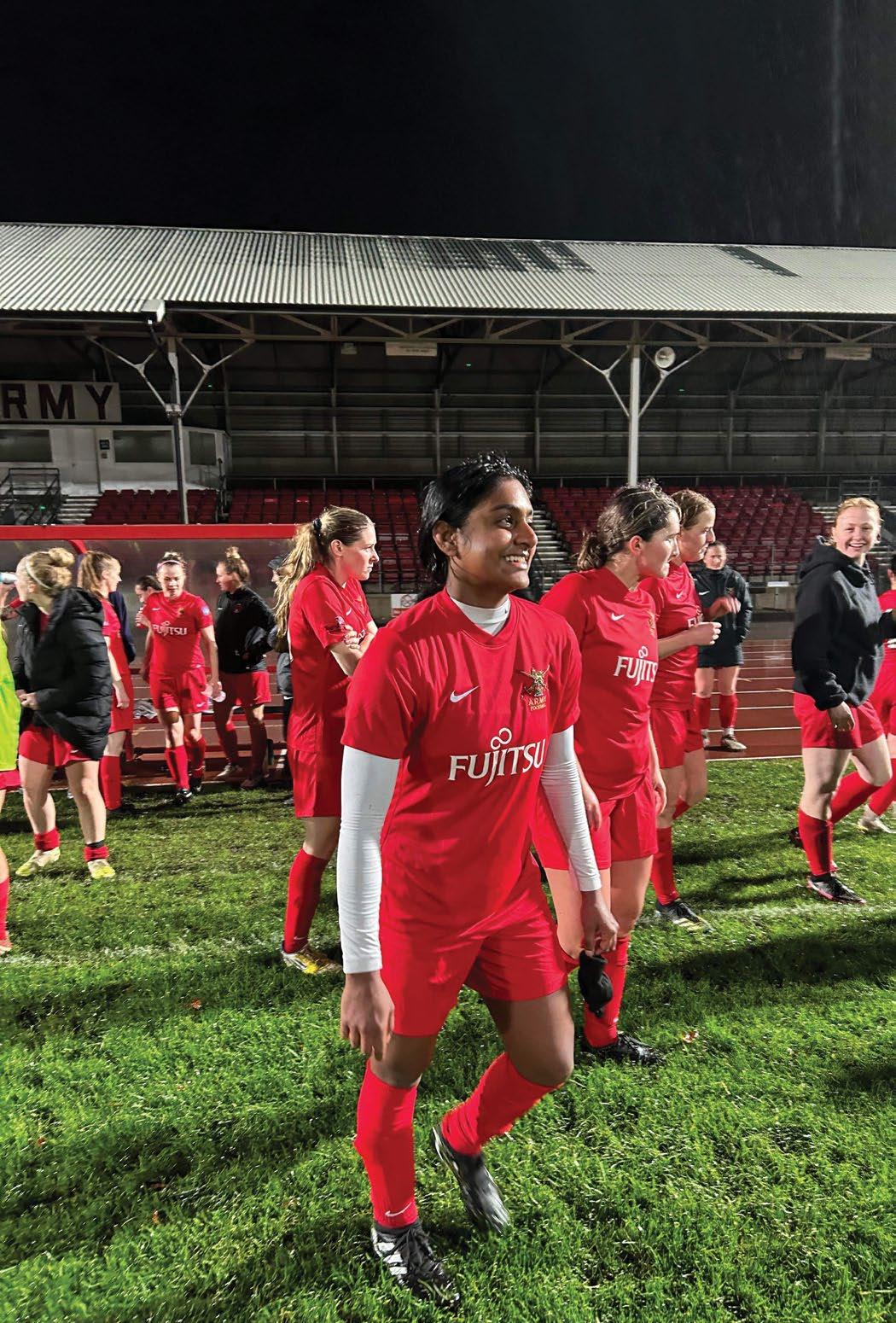
‘I've visited at least seven countries with the team which has been amazing’
Image: MSUOTC JUO Media
Army Reserve women’s football fixture at Aldershot stadium, 2022
64 Army Cadets
Why did you join the UOTC?
I wasn’t in the Army Cadets and I didn’t know about the UOTC until I saw a poster at uni of students climbing a mountain. I scanned the QR code and applied as soon as I discovered the amazing activities I could do and learnt I’d get paid to do them.
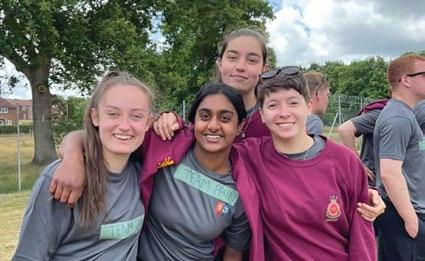
What’s it like?
Because the UOTC is part of the Army Reserve, I thought it would be strict and intimidating. Yes, there are rules and dress codes, but the staff are friendly, supportive and good fun. If you’re open-minded, willing to give your best and to look out for others, you’ll enjoy it. In most other clubs or societies at uni, you need to pay for the activities and trips, but in the UOTC all your costs are covered.
You can try something new or improve at something you already do and get real-world qualifications. The range of things you can get involved with, the places you can visit and the people you spend time with are incredible.
How have you benefited from being in the UOTC?
I’ve joined the Army Reserve women’s football team and visited at least seven countries with the team, which has been amazing. I’ve also enjoyed the discipline and structure of the military syllabus.
I’ve always lacked confidence, but the UOTC has shown me how to be a leader, and I’ve become mentally stronger by pushing myself. I now know
how it feels to be pushed to my limits and how to give 100 per cent. It’s extremely tough at times, especially at camp when the weather is bad and you’re sleep deprived, but the buzz and sense of achievement you feel afterwards make it worthwhile. I wouldn’t have known that feeling if I hadn’t experienced it in the UOTC.
How much time do you have to commit?
We meet in the evening once a week and do a couple of hours of training, and we go away for a weekend once a month. You can also get involved in sports and activities, which can involve training sessions, competitions and overseas trips, plus there’s plenty of socialising.
We also have a two-week annual camp, which can be in the UK or overseas. You can do as much or as little as you want; you just need to be on time, dressed appropriately and be willing to get stuck in. Nobody judges you if you can’t make it or if you don’t want to sign up for something. Uni always comes first, so if you’ve got exams or lots of work on, it’s fine to miss UOTC sessions.
How has your UOTC experience affected your career choice?
It’s made me want to join the Army Reserve, so I can help military personnel on a part-time basis, alongside doing a civilian physiotherapy job. And it means I can carry on doing lots of the things I’ve enjoyed in the UOTC. After uni, I’ll transfer to a nearby medical unit for training to become a physiotherapy officer.
Any tips for cadets thinking of joining the UOTC?
The opportunities you get in the UOTC are unlike anything else, and the planning and costs are all taken care of. Find out about the UOTC as soon as you get to uni and speak to officer cadets about their experience. Don’t be nervous; everyone’s friendly and happy to help.
TRY SOMETHING NEW
Image: MSUOTC JUO Media
65 Summer 2024
Annual camp sports day at Longmoor Training Camp, 2021
WHERE WE ARE UNIVERSITY OFFICERS’ TRAINING CORPS
• No commitment to join the Army after university
• Get paid for your time with us
• We draw from 170 UK universities, delivering military and adventurous training, sports and personal development

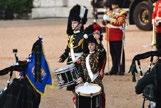

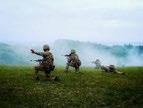
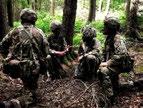

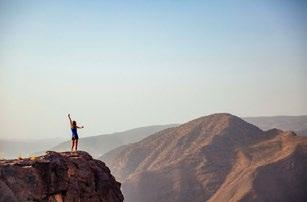
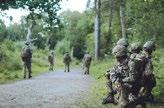
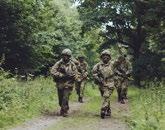


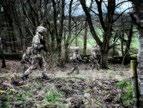
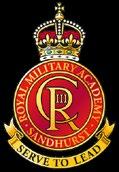
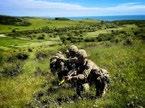
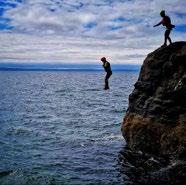
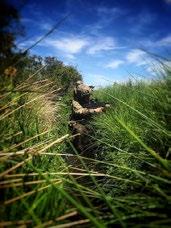

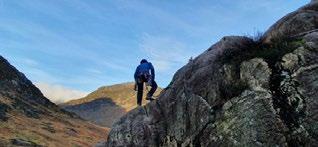

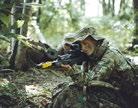
OXFORD
ABERDEEN GLASGOW
EDINBURGH
LONDON
BRISTOL
CARDIFF
LEEDS
CAMBRIDGE EXETER
SOUTHAMPTON
NEWCASTLE
LIVERPOOL
MANCHESTER
SHEFFIELD BELFAST
BIRMINGHAM
#ASTUDENTLIFELESSORDINARY
66 Army Cadets
NOTTINGHAM



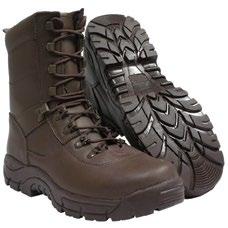
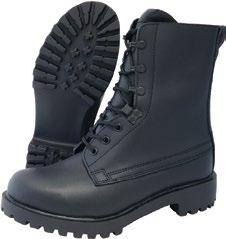
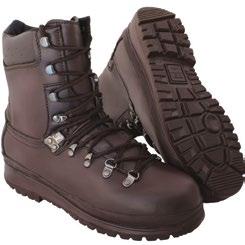
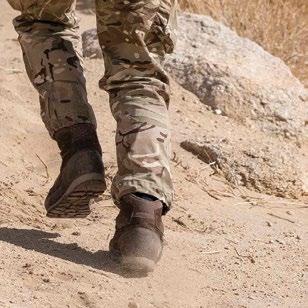

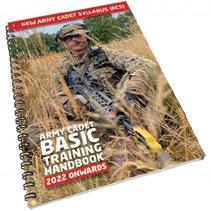
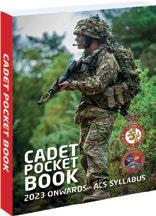
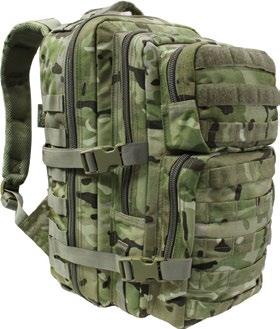

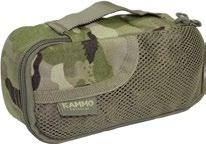





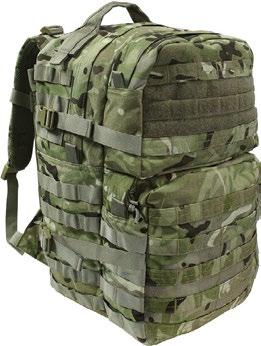
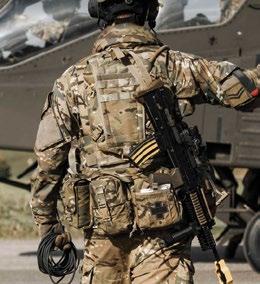
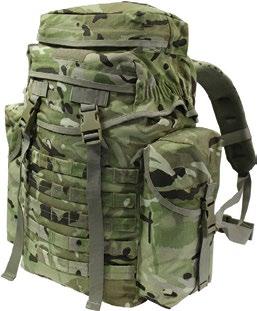

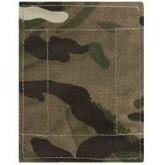
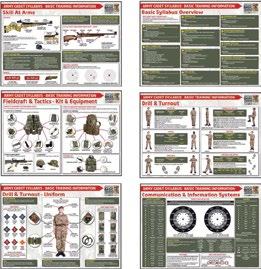
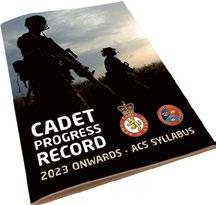
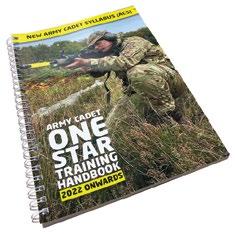

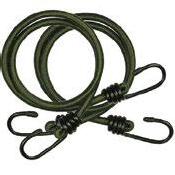
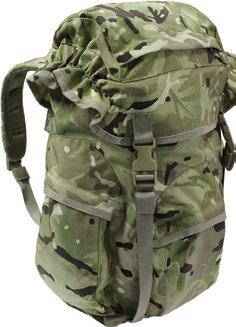
pqtuxy Payments secured by Kammo Tactical Small Assault Pack Mk.3, 24L KT005 £39.95 Kammo Tactical Cadet NI Patrol Pack MTP Mk.3, 38LMk.3 KT004 £44.95 VISIT WWW.CADETDIRECT.COM TO SEE OUR FULL RANGE Unit 4, Sybron Way, Crowborough, East Sussex TN6 3DZ E-mail: orders@cadetdirect.com • Telephone: 01892 662 230 Contains images licensed under the Open Government Licence v3.0 Kammo Tactical MTP Hydration Assault Pack 35L Mk.3 KT003 £39.95 THE UK’S LEADING SUPPLIER OF CADET UNIFORMS & EQUIPMENT British Assault Boot, Black CD001 FROM £41.62 tactical TM tactical TM Elite Patrol Boot WP Brown AB15 Black AB14 FROM £70.79 Combat Pro Boot CD005CP FROM £48.29 Delta Patrol Boot Brown AB75 Black AB76 FROM £39.96 Kammo Tactical Daysack 25 Litre, Mk. 3 KT044/MTP £24.95 Bungees AB10 £3.95 tactical TM tactical TM BULK DISCOUNTS ORDER IN BULK AVIN BULK DISCOUNTS ORDER IN BULK AVIN BULK DISCOUNTS ORDER IN BULK AVIN Army Cadet Basic Training Handbook MB35CP FROM £9.99 Cadet Progress Record Book, ACS Syllabus MB35CP FROM £3.25 ACF Basic Training Posters (Set of 6) MB34 £29.95 Army Cadet One Star Handbook MB25CP FROM £9.99 Cadet Pocket Book 2024 MB1 £11.95 FREE Small Stash Bag with purhases of selected Kammo Tactical Rucksacks PCS Uniform Blanking Patch KT-BLANK £4.95
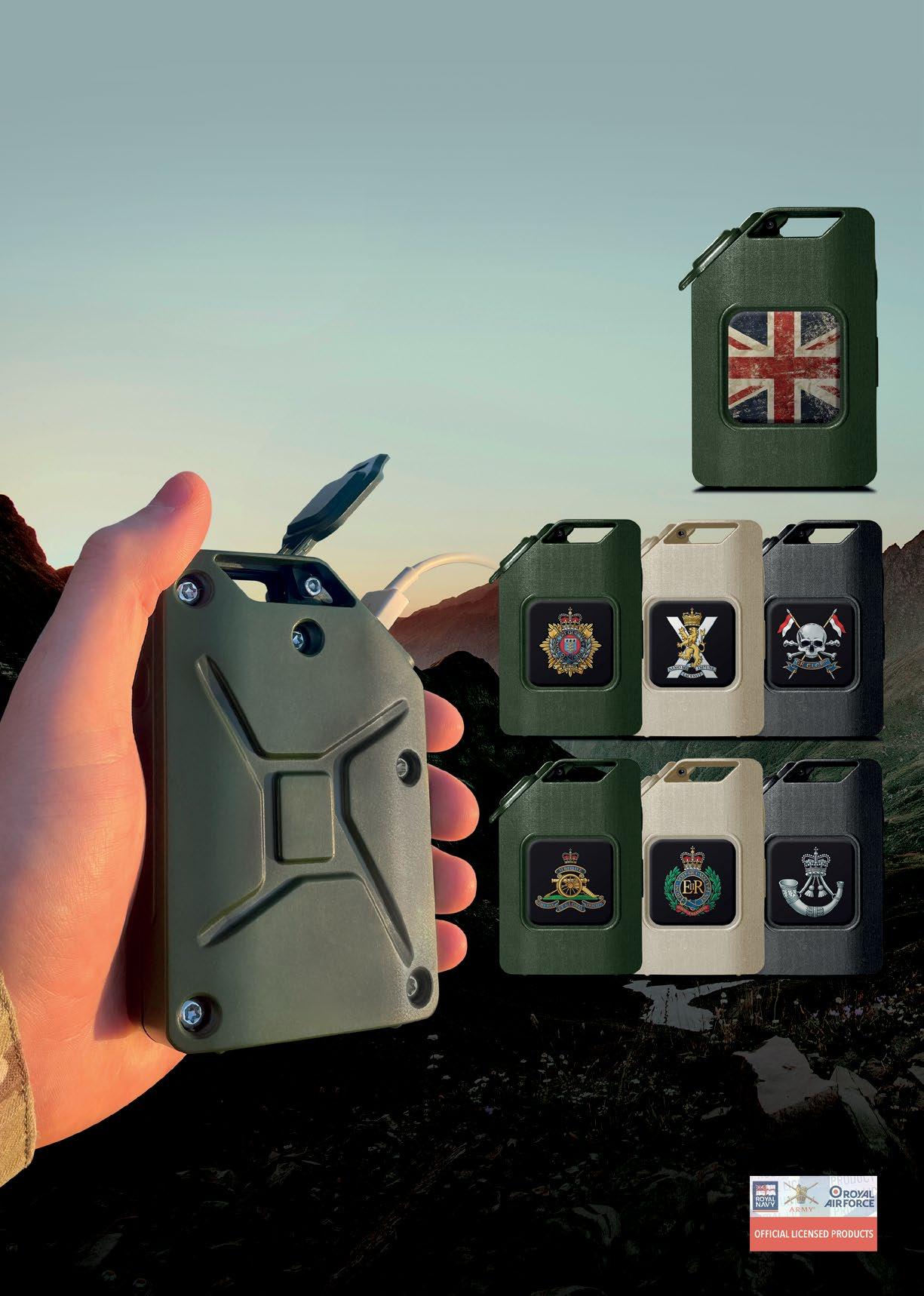














































 Image: Kate Knight
Image: Charley Doyle
Image: Kate Knight
Image: Kate Knight
Image: Charley Doyle
Image: Kate Knight




















 Clockwise from top: Harnaam receives his DofE Gold Award at Buckingham Palace; Harnaam with the Duke of Edinburgh; SMI Ranjit Singh, Cdt
UO Harnaam Singh and Cpl Jujhar Singh
Clockwise from top: Harnaam receives his DofE Gold Award at Buckingham Palace; Harnaam with the Duke of Edinburgh; SMI Ranjit Singh, Cdt
UO Harnaam Singh and Cpl Jujhar Singh







 Harnaam with his team on a DofE Gold expedition
Harnaam with his team on a DofE Gold expedition






















 Romer
Compass
Romer
Compass















































































